Poultry Farming Guide in Nigeria: Business Plan, Breeds, Cost, Profit
Looking for a Poultry Farming Guide in Nigeria plus a business plan to go with alongside. Read this article as a poultry enthusiast or an academic to know more.
Nigerian poultry farmers raise chickens, ducks, turkeys, and other fowl for their meat and eggs. The most popular fowl grown in Nigeria is the chicken, which may be raised for both meat and eggs. The least often reared poultry in Nigeria is geese.
Chicken, turkey, duck, geese, quail, pigeons, and guinea fowl are among the main poultry species bred by poultry producers. The most popularly eaten bird in Nigeria is the chicken, making it an ideal choice for farmers who wish to profit from the country’s rising demand for poultry meat and eggs. Turkey is a close second.

You can raise ducks, quails, or pigeons if you want a market with less competition. The Nigerian climate must be taken into account while deciding what kind of bird to raise. It’s critical to select a bird that can survive the temperature in Nigeria since some species of poultry birds can not thrive in hot regions.

Selecting a suitable location for your chicken house in Nigeria
- In Nigeria, a location for a chicken farm is chosen after taking into account a number of considerations. Climate is the first component. Nigeria’s typical temperature is hot and humid, which is perfect for raising chickens. However, drought conditions can have a severe effect on poultry production in some regions of the nation.
- The second element to take into account is closeness to marketplaces. Poultry farms must be situated close to marketplaces so they may readily sell their goods. If the farm is too distant from the markets, transportation expenses will eat into the revenues.
- Land quality and availability are the third element to take into account. For housing and grazing spaces for chickens, poultry farms need a lot of land. In order to properly sustain chicken farming, the land must also be of high quality. In Nigeria, it’s crucial to carefully take these three elements into account while choosing a location for a chicken farm. By doing this, you may maximize the likelihood of your chicken farm’s success.
Housing for poultry farming in Nigeria

The A-frame chicken coop is one common design for poultry farms in Nigeria. These coops are easy to build and may be outfitted using materials found nearby. They give your birds a safe and secure home, and they are simple to extend as your flock size increases. Use an existing structure on your property, such a shed or outhouse, as a place to house your poultry in Nigeria. If you choose this route, it’s crucial to make sure the structure is well-ventilated and well-lit. Additionally, you must cover all windows and doors with wire mesh to shield your birds from predators. Poultry Farming Guide in Nigeria Whichever kind of accommodation you decide on for your poultry farm in Nigeria, it’s crucial to keep it tidy and maintained. Maintaining your birds’ health and productivity will assist avoid the spread of sickness.
Commercial feeds are typically more expensive than meals that are made nearby, but they are also more nutrient-rich and benefit your birds’ health. Follow the manufacturer’s guidelines for feeding your birds if you choose to utilize commercial foods. Locally produced foods may be less nutrient-rich yet are frequently less expensive than commercial feeds. To locate a feed that is effective for your birds, you will need to experiment with several locally made foods. It’s crucial to provide your birds access to clean water, regardless of the type of feed you use. Water assists with digestion and keeps them hydrated. you stop the spread of disease, be sure you frequently clean and replenish water containers.
Small-scale chicken rearing in Nigeria
Poultry farming offers several chances for small-scale farmers to become engaged, from growing birds for eggs to producing meat. The decision of the sort of chicken you wish to produce is the first stage in beginning a small-scale poultry farm. The most popular breed is chicken, but you may also have turkeys, ducks, or geese. You’ll need to buy some baby chickens or other young birds once you’ve chosen the breed of poultry you wish to keep. These may be purchased online or from a nearby hatchery.
You must construct a brooding chamber for your newborn chicks after you’ve acquired them so they may stay warm and secure as they develop. A cardboard box and a heat bulb may be used to create a straightforward brooding setup. Your young chicks can be transferred to a bigger coop or enclosure after they have outgrown the brooding space. You’ll need to provide your birds food and water as they grow. Grain, vegetables, and chicken feed make up a healthy chicken diet. You may feed them by either growing it yourself or buying it from a nearby feed store. Water must always be accessible, and it should be replaced frequently.
In Nigeria, the average cost to set up a chicken farm is around N150,000. This price covers the cost of the necessary equipment, starter ingredients, and day-old baby chickens. In Nigeria, the startup expenditures for a commercial poultry farm might reach N1 million. In Nigeria, a chicken farm typically makes around N50,000 per month in profit. Selling eggs and meat at greater prices or lowering the cost of production via improved management methods are two ways to enhance profit.
Organic Poultry Farming in Nigeria
In Nigeria, there is a style of farming called organic poultry farming where hens are reared without the use of antibiotics or other growth-promoting substances. The chickens are given an organic feed and lots of room to wander and forage. Nigerian government regulations must be met in order for organic poultry growers to receive certification. These requirements include giving hens access to clean, pleasant surroundings, sunlight and fresh air, as well as a healthy feed.
Additionally, synthetic pesticides and herbicides must not be used on farms. Nigerian organic poultry farming is still in its infancy, but as more people learn about its advantages, it is becoming more and more well-liked. Because they are aware that organic chicken meat is healthier for their health and the environment, consumers are prepared to pay more attention to it. Farmers of poultry who transition to organic farming should anticipate increased income as the demand for their product rises.
Now that you have read this Poultry Farming Guide in Nigeria, are you ready to get a business plan alongside?
How To Download The Complete Chicken Farming Business Plan for Broilers and Layers In Nigeria PDF and Doc
Above is a part of the chicken farming business plan in Nigeria. In case you a complete business plan, follow the procedures to download it.
Pay the sum of N8000 (Eight thousand naira only) to the account detail below: Bank: GTBank Name: Oyewole Abidemi (I am putting my name and not our company account so you know I am real and you can trust me, and trace me) Ac/No: 0238933625 Type: Saving
P.S: We can also tailor the business plan to your name, business size, capital requirements, and more to fit your direct needs. Call or message +234 701 754 2853 for enquiries
Thereafter, send us your email address through text message to +234 701 754 2853 . The text must contain the title of the business plan you want and also your email address. Immediately after the confirmation of your payment, we will send the chicken farming business plan for broilers and layers in Nigeria to your email address where you can easily download it.
Thanks for reading this Poultry Farming Guide in Nigeria
Opeoluwa Falodun
Goats farming guide in nigeria, onion farming guide in nigeria – planting, care, and harvesting, you may also like, feasibility study sample for private school, private school business plan sample, feasibility study template for zobo production, business plan sample for zobo production, ict feasibility study sample, download ict business plan sample, download snailery feasibility study sample, download snailery business plan sample business, 8 farming & agriculture business ideas in nigeria, 5 investment apps for saving, growing your money..., leave a comment cancel reply.
Save my name, email, and website in this browser for the next time I comment.
[Beginners Guide] How To Start A Successful Poultry Farm In Nigeria
Starting a poultry farming business in Nigeria can be a rewarding venture, both financially and professionally. With a growing demand for poultry products in the country, there is a significant opportunity for entrepreneurs to establish successful poultry farms.
To start a successful poultry farming business in Nigeria, it is crucial to conduct thorough market research to understand the demand and preferences of the target market. Implement effective biosecurity measures and prioritize the health and nutrition of the flock. Develop strong marketing strategies and build partnerships to reach potential buyers and maximize profitability.
This comprehensive guide will walk you through the essential steps and considerations to start a poultry farming business in Nigeria, from understanding the industry to scaling and expanding your operations.
How To Start Poultry Farming In Nigeria
Table of Contents
Poultry farming is the practice of raising domesticated birds such as chickens, turkeys, ducks, and geese for their meat, eggs, or feathers. It is an important sector in Nigeria’s agricultural industry, providing a significant source of employment and contributing to the country’s food security.
Read Also: How To Start Bee Farming In Nigeria [Beginners Guide]
Step 1: Identifying Your Niche and Target Market
Before starting a poultry farming business , it is essential to identify your niche and target market. Determine whether you want to focus on broiler production, egg production, or both. Assess the demand and competition in your chosen niche to identify potential opportunities.
Step 2: Conducting Market Research
Conducting thorough market research is crucial for understanding customer preferences, demand, and pricing in the poultry industry. Identify potential buyers, such as local markets, supermarkets, restaurants, and wholesalers. Gather insights on the prevailing market prices, product quality expectations, and consumer trends.
Step 3: Developing a Business Plan
Step 4: acquiring necessary skills and knowledge.
To succeed in poultry farming , it is vital to acquire the necessary skills and knowledge. Attend training programs, workshops, or courses on poultry production, management, and health. Networking with experienced farmers and industry experts can also provide valuable insights.
Step 5: Selecting a Suitable Location
Choose a location for your poultry farm that is easily accessible, has adequate water supply, and is free from potential environmental hazards. Consider proximity to markets and transportation routes. Ensure compliance with local zoning regulations and land-use restrictions.
Read Also: Top 10 Biggest Fish Farm Projects in Nigeria
Step 6: Constructing Poultry Houses and Facilities
Step 7: procuring necessary equipment and supplies.
Procure the essential equipment and supplies required for poultry farming. This includes feeders, drinkers, brooders, egg incubators, and cleaning equipment. Ensure that the equipment is of good quality and appropriate for your production scale.
Step 8: Ensuring Biosecurity Measures
Biosecurity is critical to prevent the introduction and spread of diseases in your poultry farm. Implement strict biosecurity measures such as controlling visitor access, sanitizing equipment, and establishing quarantine protocols for new birds.
Understanding the Poultry Farming Industry in Nigeria
The poultry farming industry in Nigeria is diverse and encompasses various types of poultry production, including broiler farming, layer farming, and hatchery operations. Broilers are raised for meat production, while layers are specifically bred for egg production. Hatcheries play a crucial role in providing day-old chicks to farmers.
Potential Market and Profitability
Key challenges and considerations.
While poultry farming offers promising prospects, there are several challenges that aspiring poultry farmers need to be aware of. Some of the key considerations include:
Read Also: Vaccines Schedule for Poultry Farm [All You Need To Know]
Disease outbreaks and biosecurity:
Feed costs and availability:.
The cost and availability of poultry feed can impact profitability. Developing strategies to ensure a steady supply of affordable and nutritious feed is essential.
Market volatility and competition:
The poultry industry can be affected by market fluctuations and competition. Staying updated with market trends and developing unique selling points can help overcome these challenges.
Key Factors To Choosing the Right Poultry Breeds To Start Your Farm
Evaluating different breeds and their characteristics.
Choose poultry breeds that are well-suited to your production goals, market demand, and local conditions. Consider factors such as growth rate, feed efficiency, disease resistance, and egg-laying capacity. Consult with breeders or experts for guidance.
Read Also: 20 Common Diseases In Poultry Farm
Considering the Demand and Market Preference
Selecting breeds suitable for local conditions.
Read Also: 12 Poultry Farming Tips For Beginners [Success Guide]
Managing Poultry Health and Nutrition
Implementing vaccination and disease prevention protocols.
Maintaining good poultry health is essential for the success of your farm. Develop a vaccination schedule in consultation with a veterinarian to protect your birds against common diseases. Implement strict biosecurity measures, such as regular disinfection and proper waste management, to minimize disease risks.
Providing Balanced Nutrition and Feed Management
Monitoring and maintaining flock health.
Regularly monitor the health of your flock through visual inspections, weight checks, and behavior observation. Identify and address any signs of illness or distress promptly. Establish a relationship with a veterinarian who can provide guidance and support for flock health management.
Poultry Farming Operations and Management
Day-to-day care and feeding routines, egg production and management, broiler production and management.
If you are raising broilers, develop a production plan that includes selecting quality chicks, managing brooder temperature and lighting, and implementing a feeding and growth strategy. Monitor the growth rate, adjust feed rations accordingly, and ensure proper ventilation in broiler houses.
Proper Waste Management and Disposal
Marketing and selling poultry products, identifying potential buyers and markets, developing marketing strategies.
Develop effective marketing strategies to promote your poultry products. Utilize both online and offline channels, such as social media, websites, local advertisements, and product demonstrations. Differentiate your products by highlighting quality, health benefits, or unique selling points.
Building Partnerships and Distribution Channels
Financial planning and record-keeping, estimating startup and operational costs.
Develop a comprehensive financial plan that includes the initial capital required to start your poultry farming business . Consider costs such as land, construction, equipment, feed, chicks, veterinary services, and marketing. Ensure that you have sufficient funds to cover both startup and operational expenses.
Tracking Expenses and Income
Maintain accurate and detailed records of your expenses and income. Implement a robust record-keeping system to track feed costs, veterinary expenses, labor costs, sales revenue, and other financial transactions. Regularly review your financial statements to assess the profitability of your business.
Evaluating Profitability and Making Informed Decisions
Regulations and compliance, understanding legal requirements and permits, complying with animal welfare and food safety standards.
Maintain high standards of animal welfare and hygiene in your poultry farm . Provide adequate space, ventilation, and access to clean water and feed. Follow recommended practices for disease prevention, vaccination, and medication administration. Implement proper food safety measures during egg collection, processing, and packaging.
Scaling and Expanding Your Poultry Farming Business
Evaluating growth opportunities.
Assess opportunities for scaling and expanding your poultry farming business . Consider factors such as market demand, available resources, and financial viability. Evaluate options such as increasing production capacity, diversifying product offerings, or expanding into related areas such as poultry processing or value-added products.
Increasing Production Capacity
Diversifying product offerings.
Explore opportunities to diversify your product offerings to cater to different market segments. This can include value-added products such as processed poultry meat, specialty eggs, or organic poultry products. Conduct market research and assess the feasibility and profitability of new product lines.
Can I start a poultry farming business with limited capital?
How long does it take to start making a profit in poultry farming, what are some common challenges in the poultry farming industry.
Common challenges in the poultry farming industry include disease outbreaks, feed costs, market volatility, and competition. It is important to stay updated with industry trends, invest in disease prevention measures, and develop effective marketing strategies to overcome these challenges.
How do I ensure the health and well-being of my poultry flock?
What are the future prospects for the poultry farming industry in nigeria, how much does it cost to start up a poultry farm in nigeria.
To start up a poultry farm in Nigeria, you will have at least 500,000 to 1 million nairas.
How can I start a small poultry farm?
How much do poultry farmers make in nigeria.
Nigeria’s chicken farming industry was valued at N1. 6 trillion in 2019 by the Governor of the Central Bank of Nigeria (CBN) Godwin Emefiele, making it the most commercialized sub-sector of the country’s agricultural sector.
How many bags of feed can 500 layers consume?
For the first month, 500 layer chicks will require 750 kilograms of feed if each one consumes 1.5 kilograms of feed every month. Your chicks’ food intake will increase by about 1.75 kilograms a month over the next month.
How much does it cost to raise 100 chickens?
How can i become a successful poultry farmer, can a chicken lay 3 eggs in one day.
No, it is not possible, excerpt by chance.
How long do layers lay eggs?
How long does a baby chicken take to grow.
At 18 weeks of age, a baby chicken is regarded to be “mature.”
Breed-specific differences in how rapidly or slowly an individual chicken develops may also play a role in the timing of this stage of development.
How many eggs do layers produce per day?
What is the most common poultry disease, share this:, author: adewebs, you may also like:, can chickens eat grapes [poultry feeding tips], [beginners guide] how to start ostrich farming in nigeria, 18 toxic plants your chickens must avoid (must read), 10 things to know before keeping yaks, 6 replies to “ [beginners guide] how to start a successful poultry farm in nigeria ”, leave a reply cancel reply.
Save my name, email, and website in this browser for the next time I comment.
Manage Money
Small business ideas to start up
Poultry farming in Nigeria: Overview, requirements and cost
Introduction.
In the rich tapestry of Nigeria’s agricultural landscape, one industry stands as a beacon of opportunity and prosperity — poultry farming. This comprehensive guide is your key to unlocking the potential of a poultry farming business in Nigeria. Brace yourself for a journey into the dynamic world where innovation, sustainability, and profitability converge to redefine the poultry farming narrative.
Step by step overview of poultry farming in Nigeria
1. The Poultry Farming Revolution: A Prosperous Pathway
Poultry farming in Nigeria is not merely a business; it’s a revolution. From providing a steady supply of eggs and meat to fostering economic growth, the potential for success in poultry farming transcends traditional boundaries.
2. Market Dynamics: Navigating Opportunities and Challenges
Embarking on a poultry farming venture necessitates a deep understanding of market dynamics. Explore the ever-growing demand for poultry products, identify potential challenges, and position your poultry business strategically in the market.
3. Setting Up Your Poultry Farm: Essential Steps for Triumph
- Selecting the Right Poultry Species: Choosing the appropriate poultry species is a pivotal decision. Delve into the characteristics of chickens, ducks, or turkeys and align your choice with market preferences and your business goals.
- Designing an Optimal Farm Layout: Create an efficient and hygienic layout for your poultry farm. Consider factors such as spacing, ventilation, and waste management to ensure the well-being of your birds.
- Implementing Robust Biosecurity Measures: Prioritize biosecurity to safeguard your flock from diseases. Develop strict protocols for hygiene, quarantine, and vaccinations to maintain a healthy poultry population.
4. Nutrition and Feeding: Sustaining Healthy Flocks
Devise a well-balanced feeding program for your poultry. Explore nutritional requirements for different stages of growth and invest in high-quality poultry feed to ensure optimal health and productivity.
5. Disease Management: Preserving Poultry Health
Proactive disease management is a cornerstone of successful poultry farming. Understand common poultry diseases in Nigeria, implement vaccination programs, and establish a partnership with a veterinarian to secure the well-being of your flock.
6. Breeding Strategies: Maximizing Productivity
Efficient breeding practices are vital for a thriving poultry farm. Explore strategies for optimal breeding, understand incubation techniques, and implement practices to enhance the reproductive efficiency of your flock.
7. Marketing Your Poultry Business: Crafting a Brand Identity
Establishing a strong brand presence is essential in the competitive poultry farming landscape. Leverage digital marketing strategies, create a professional website, and explore local partnerships to ensure your poultry business shines in the market.
8. Financial Management: Navigating the Numbers for Profitability
A flourishing poultry farm requires sound financial management. From budgeting for feed to calculating return on investment, understanding the financial aspects of poultry farming is key to long-term success.
9. Scaling Your Poultry Business: Exploring Growth Horizons
As your poultry business gains momentum, explore avenues for scaling your operations. This could include diversifying your product offerings, expanding your flock, or establishing partnerships with local businesses.
10. Challenges in Poultry Farming: Confronting Hurdles with Tenacity
Acknowledge and address challenges head-on. From disease outbreaks to market fluctuations, understanding and proactively managing challenges is crucial for sustained success in the poultry farming industry.
Starting a poultry farming business in Nigeria is an exciting venture that holds significant potential for success. However, it requires careful planning, adherence to regulations, and a clear understanding of the financial investments involved. Here’s a detailed insight into the requirements and costs associated with launching a successful poultry farming business in Nigeria, explained in a clear human tone.
Requirements and cost of starting a poultry farming business in Nigeria
1. Land and Infrastructure:
- Requirement: Secure a piece of land with adequate space for poultry pens, feed storage, and waste disposal. Plan the layout for efficient operations, proper ventilation, and hygiene.
- Cost: Land prices vary based on location, but budgeting between ₦500,000 to ₦1,500,000 for land acquisition and initial infrastructure development is a reasonable estimate.
2. Poultry Species and Stock:
- Requirement: Choose the poultry species you want to raise, whether it’s broilers, layers, or a combination. Acquire healthy chicks or pullets from reputable hatcheries.
- Cost: The cost of chicks or pullets varies by breed and age. Budgeting ₦100,000 to ₦300,000 for initial stock is a practical estimate.
3. Housing and Equipment:
- Requirement: Build secure and well-ventilated poultry pens. Invest in essential equipment such as feeders, drinkers, nesting boxes, and heating lamps for chicks.
- Cost: Construction costs depend on the scale of your poultry farm. Budgeting ₦100,000 to ₦500,000 for initial housing and equipment is a reasonable estimate.
4. Feed and Nutrition:
- Requirement: Develop a balanced feeding program for different stages of poultry growth. Invest in quality poultry feed to ensure optimal health and productivity.
- Cost: Feeding costs depend on the number of birds and the chosen feed. Budgeting ₦50,000 to ₦100,000 for initial feed is a practical starting point.
5. Health Management:
- Requirement: Implement a health management program, including vaccinations and regular check-ups. Establish a relationship with a veterinarian for professional advice.
- Cost: Veterinary services and vaccinations costs vary. Budgeting ₦50,000 to ₦100,000 annually for health management is a practical estimate.
- Requirement: Hire reliable labor for daily farm operations, including feeding, cleaning, and health monitoring.
- Cost: Labor costs depend on the size of your farm and the number of employees. Budgeting ₦50,000 to ₦150,000 monthly for labor expenses is a practical estimate.
7. Marketing and Branding:
- Requirement: Create a brand identity for your poultry farm. Develop a professional website, business cards, and marketing materials. Establish relationships with local markets and potential buyers.
- Cost: Marketing costs vary, but budgeting ₦30,000 to ₦100,000 for initial branding and promotional activities is a practical starting point.
8. Insurance:
- Requirement: Consider insurance coverage for your poultry farm to protect against unforeseen events such as disease outbreaks or natural disasters.
- Cost: Insurance costs vary, but budgeting ₦20,000 to ₦50,000 annually for insurance is a practical estimate.
9. Record Keeping and Management:
- Requirement: Implement a record-keeping system to track expenses, income, and farm performance. Consider using digital tools for efficient management.
- Cost: Digital tools and software costs vary. Budgeting ₦10,000 to ₦30,000 for record-keeping systems is a reasonable estimate.
Starting a poultry farming business in Nigeria requires careful financial planning and a commitment to best practices. While the costs outlined provide a general overview, it’s essential to conduct thorough research and tailor your budget to your specific circumstances and location. Success in poultry farming not only requires financial investment but also dedication to the well-being of your birds and continuous improvement of your farming practices.
Embarking on a poultry farming venture in Nigeria is not merely a business endeavor; it’s a commitment to contributing to the nation’s food security and economic growth. By combining innovative practices with traditional wisdom, your poultry farm has the potential to be a transformative force in the dynamic and flourishing landscape of Nigerian agriculture. Prepare to flock to success and reap the rewards of a thriving poultry farming business in Nigeria.
Leave a Comment Cancel reply
Save my name, email, and website in this browser for the next time I comment.
Notify me of follow-up comments by email.
Notify me of new posts by email.
- Agriculture Farming
- Livestock Farming
Project Reports
- Hydroponics
- Best Fertilizers
- Vertical Farming
- Sheep Farming
- Goat Farming
- Poultry Farming
- Fish Farming
- Pig Farming
- Dairy Farming
- Rabbit Farming
- Success Stories of Farmers
- Boost Fruit Yield
- District Wise Crop Production
- Schemes & Subsidies
- Agriculture Colleges
- Farm Insurance
- Disease Control And Management
Agriculture
Aquaculture
Horticulture
Agri Business
How to Start a Poultry Farming in Nigeria: Business Plan, Breeds, Cost, Profit, Loan, Subsidy, and Management
Table of contents, what is poultry farming in nigeria, choosing the type of poultry bird to rear in nigeria, steps to start a poultry business plan in nigeria, selecting a suitable location for poultry farming in nigeria, providing good housing for poultry farming in nigeria, feeding and caring for the poultry birds in nigeria, small-scale poultry farming in nigeria, poultry breeds available in nigeria, poultry farming areas in nigeria, poultry production methods in nigeria, is poultry farming profitable in nigeria, good husbandry practices for nigeria poultry farmers, poultry farming loans and subsidies in nigeria, poultry farm problems in nigeria, poultry farming challenges in nigeria, set-up cost to start a poultry farming business in nigeria, profit for poultry farming business in nigeria, organic poultry farming in nigeria .
Poultry farming is a major agricultural activity in Nigeria. The country has a large population and a growing demand for poultry products. Nigeria is Africa’s largest producer of eggs and the second-largest producer of chicken meat. The industry employs millions of people and contributes significantly to the country’s economy.
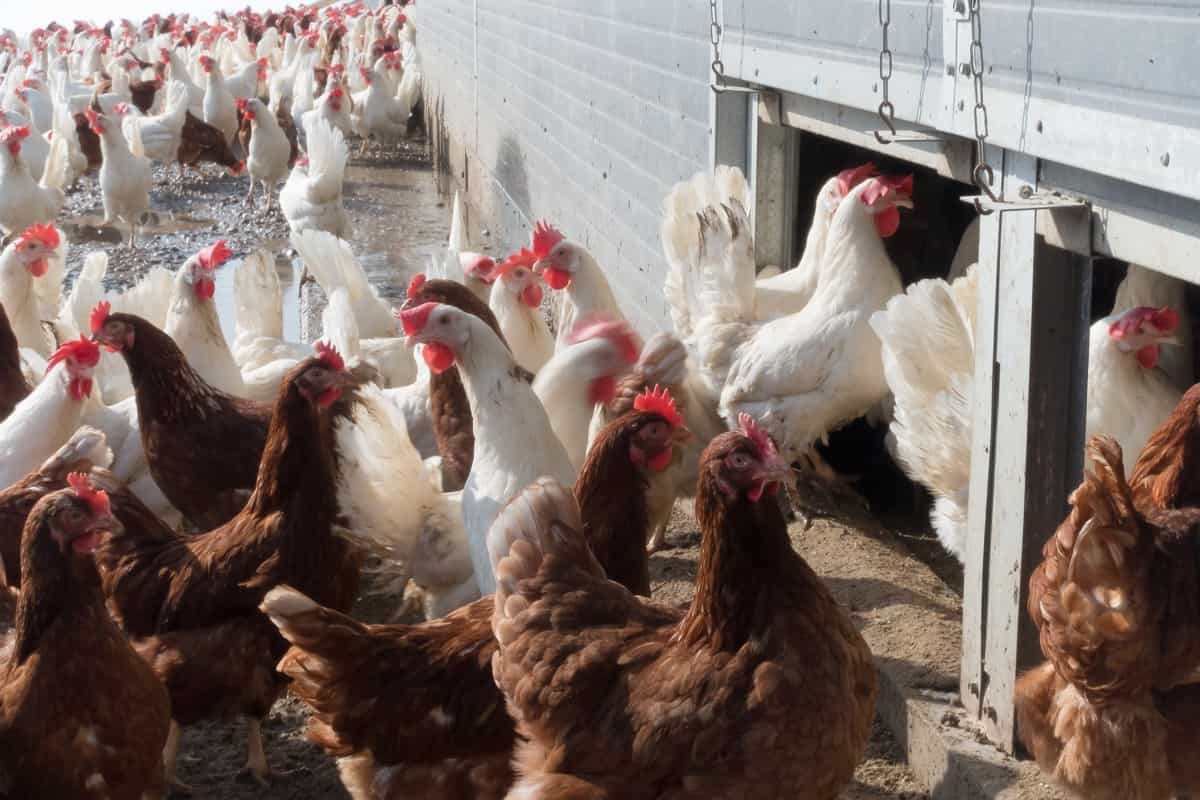
How to start a poultry farming in Nigeria
Poultry farming in Nigeria is raising chickens, ducks, turkeys, and other poultry for meat or eggs. Chickens are the most common poultry raised in Nigeria and can be raised for meat or eggs. Geese are the least common poultry raised in Nigeria.
The common poultry birds raised by poultry farmers include chicken, turkey, duck, geese, quail, pigeon, and guinea fowl. Chicken is the widely consumed bird in Nigeria, making it an appropriate choice for farmers who want to take benefit of the growing poultry meat and egg demand in Nigeria; Turkey is a close second.
If you prefer a market with less competition, you can rearing quails, pigeons, or ducks. You will also need to consider the climate in Nigeria when choosing the type of bird to rear. Some types of poultry birds do not do well in hot climates, so it is important to choose a bird that can withstand the climate conditions in Nigeria.
- Choose your poultry niche : You can start many poultry businesses in Nigeria, so it’s important to choose the right one. Do the research and decide which poultry farming would be the most profitable for you.
- Get started with a business plan : A good poultry business plan is essential for any successful business, especially for a poultry business. Outline your goals, objectives, and strategies for your poultry farm and ensure you have a solid financial foundation.
- Choose the right location : The success of your poultry farm will largely depend on its location. Make sure you choose a location convenient for transport and have access to good-quality water and land.
- Build or buy your farm: Once you’ve chosen your location, it’s time to start building or buying your farm. If you’re building your farm, follow all the necessary construction regulations. If you’re buying an existing farm, ensure it meets all the requirements for a successful poultry operation.
- Stock your farm : Now it’s time to start stocking your farm with birds. This is where much of the cost associated with starting a poultry business comes in, so make sure you purchase healthy birds
In case you missed it: Poultry Farming in the Philippines: How to Start, Breeds, Subsidy, Loans, and Profits
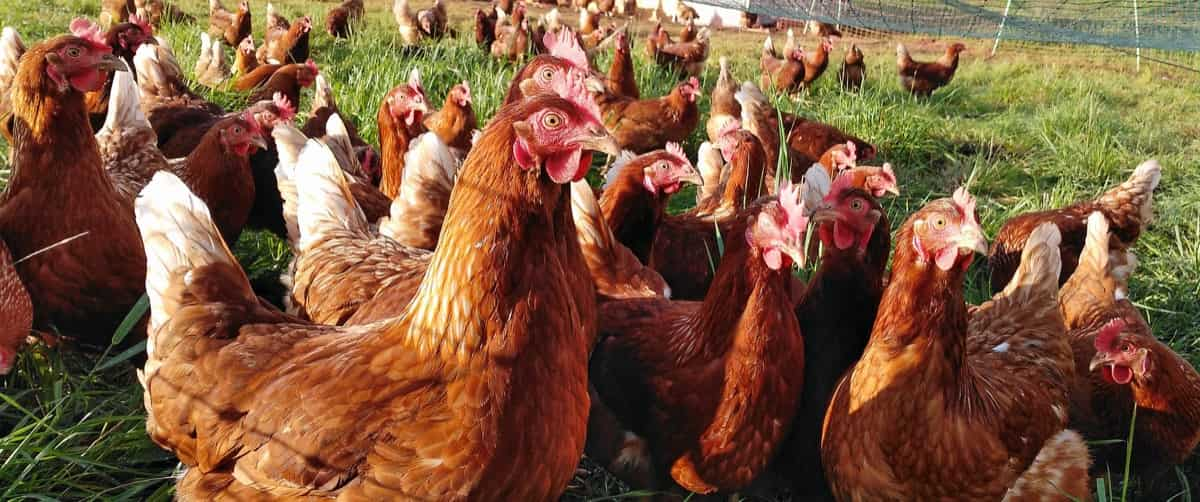
- Several factors are considered for selecting a location for a poultry farm in Nigeria. The first factor is climate. The climate in Nigeria is generally hot and humid, which is ideal for chicken production. However, certain areas of the country experience periods of drought, which can impact poultry production negatively.
- The second factor to consider is proximity to markets. Poultry farms need to be located near markets where they can sell their products easily. Transport costs will eat into profits if the farm is too far from the markets.
- The third factor to consider is land availability and quality. Poultry farms require a lot of land for chicken housing and grazing areas. The land should also be of good quality to support chicken production effectively.
- When selecting a site for a poultry farm in Nigeria, it is important to consider these three factors carefully. Doing so can ensure that your poultry farm has the best chance of success.
- One popular type of housing for poultry farms in Nigeria is the A-frame chicken coop. These coops are simple to construct and can be made from locally sourced materials. They provide a safe and secure environment for your birds and can be easily expanded as your flock grows.
- Another option for housing your poultry in Nigeria is to use an existing building on your property, such as a shed or outhouse. If you select this option, it is important to ensure that the building is well-ventilated and has plenty of light. You will also need to protect your birds from predators by installing wire mesh over all windows and doors.
- Regardless of which type of housing you choose for your poultry farm in Nigeria, keeping it clean and well-maintained is important. Regular cleaning and disinfection will help prevent disease spread and keep your birds healthy and productive.
Commercial feeds are generally more expensive than locally produced feeds, but they are also more nutrient-rich and improve the health of your birds. If you decide to use commercial feeds, follow the manufacturer’s recommendations on how much to feed your birds. Locally produced feeds are often cheaper than commercial feeds but may not be as nutrient-rich.
In case you missed it: Raising Kadaknath Chickens (Black Chicken) in India: Check How this Guide Helps Profitable Kadaknath Poultry Farming from Scratch
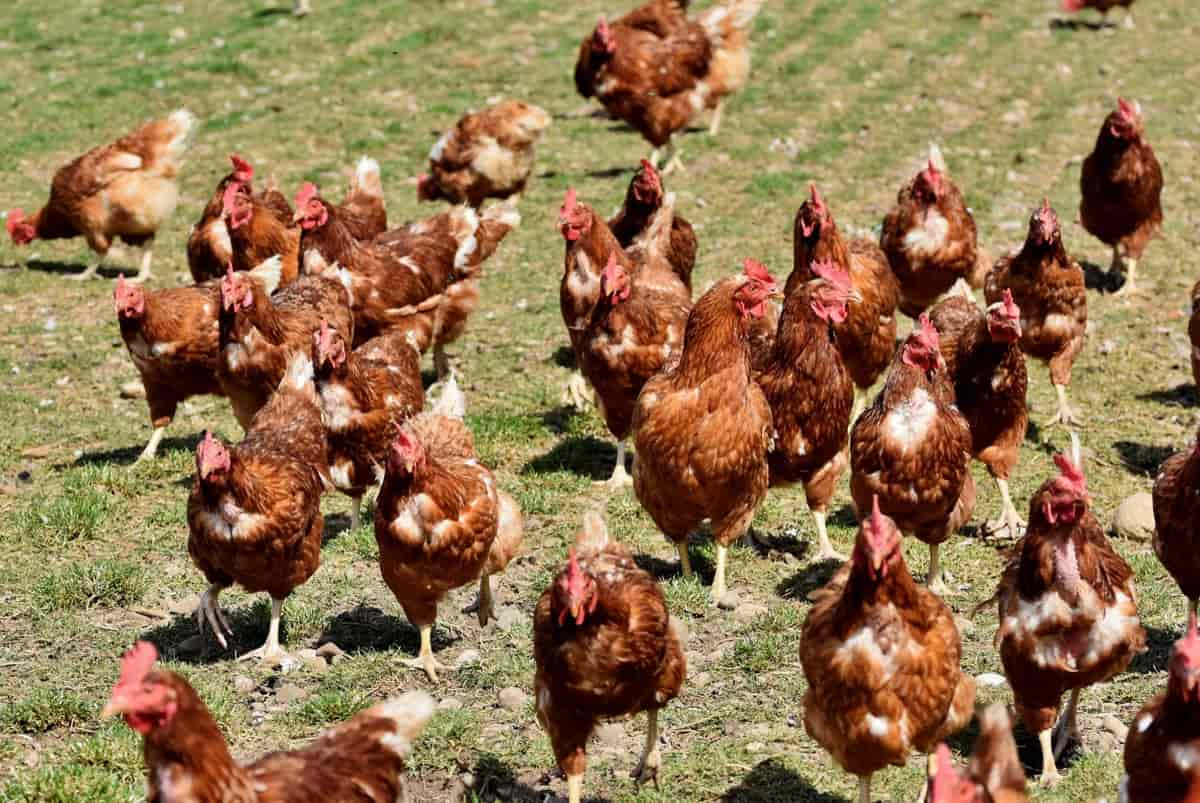
You will need to experiment with different types of locally produced feeds to find one that works well for your birds. No matter what feed you use, it is important to provide fresh water for your birds. Water helps them stay hydrated and aids in digestion. Be sure to clean and refill water containers regularly to prevent the spread of disease.
Small-scale farmers have many opportunities to get involved in poultry farming, from raising chickens for eggs to meat production. The first step in starting a small-scale poultry farm is to choose the type of poultry you want to raise. Chickens are the most common choice, but you can raise turkeys, ducks, or geese. Once you’ve decided on the type of poultry you want to raise, you’ll need to purchase some baby chickens or other young birds. You can buy these from a local hatchery or online.
After you’ve obtained your baby chickens, you’ll need to set up a brooding area where they can stay warm and safe while they grow. A simple brooding set-up can be made using a cardboard box and a heat lamp. Once your baby chickens have outgrown the brooding area, they can be moved into a larger coop or pen. As your birds grow, you’ll need to provide them with food and water. A good diet for chickens includes grain, greens, and chicken feed. You can either grow your food for them or purchase it from a local feed store. Water must be available at all times and should be changed regularly.
- The Kadaknath chicken is a native breed known for its black plumage. These birds are typically used for meat production.
- The White Leghorn is a popular egg-laying breed that originates from Italy. These birds are white and are known for their high egg production.
- The Rhode Island Red is another popular egg-laying breed in many commercial operations. These birds are red and are known for their high egg production.
- The Sussex chicken is a dual-purpose bird that can be used for both meat and egg production. These birds are typically brown or red and originate from the United Kingdom.
There are many poultry farming areas and locations in Nigeria. The main poultry farming areas are in Kaduna, Oyo, Osun, and Lagos. There are also smaller poultry farms in other regions of the country. Nigeria has many poultry farming areas, but the three main regions are the Northern, Central, and Southern parts.
In case you missed it: How to Start Poultry Farming from Scratch: A Detailed Guide for Beginners
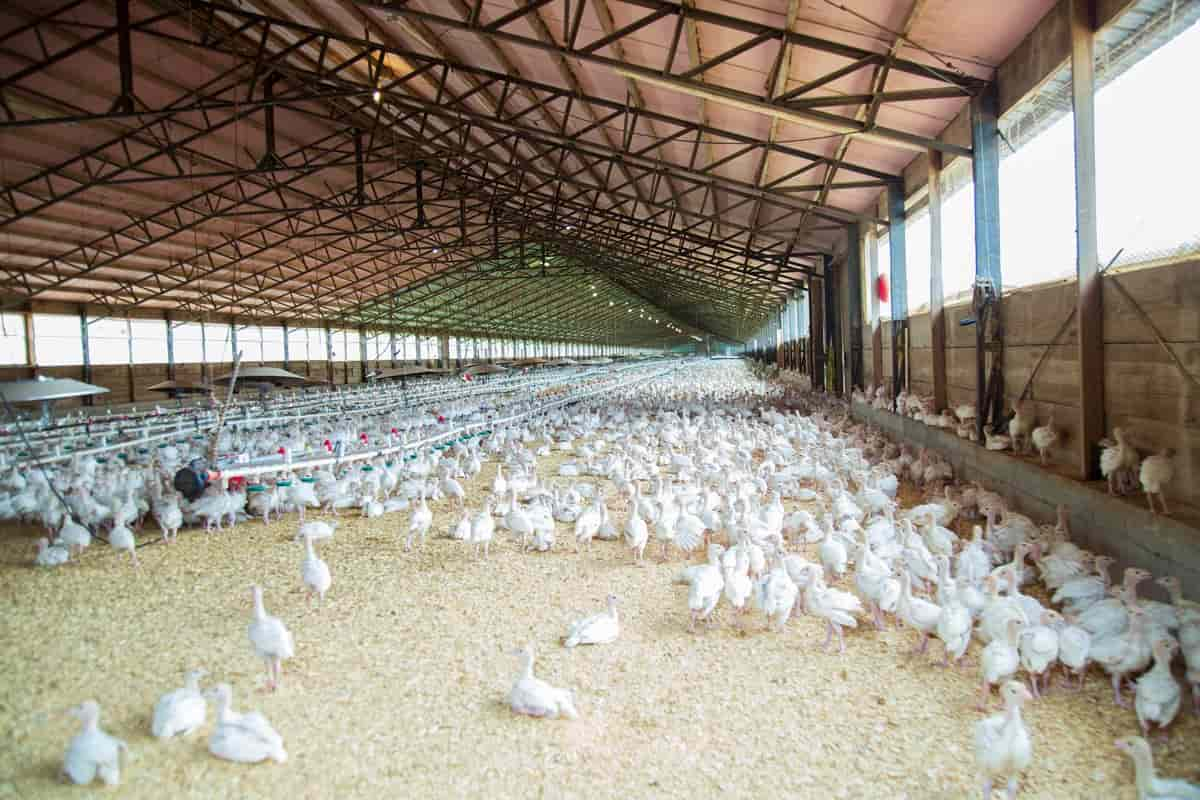
- The Northern region is home to the majority of Nigeria’s chicken farms. This area has a more temperate climate, which is better for chicken production.
- The Central region is also a key area for poultry farming, as it contains the country’s capital, Abuja. This region has a hot climate, which can be tough on chickens, but many large-scale operations have overcome this challenge.
- The Southern region has a tropical climate and is home to some of Nigeria’s biggest commercial broiler farms. This area presents challenges for chicken farmers, but there is still good potential for success.
There are approximately 1,500 poultry farms in Nigeria, with the majority being small-scale operations. Over two million Nigerians are employed in the poultry sector. Poultry farms vary in size from small family-run operations to large commercial farms. The Nigerian government offers incentives for investors interested in starting or expanding a poultry farm. These incentives include tax breaks and access to low-interest loans. The government also provides training and extension services to farmers.
- Intensive poultry production is the common method, requiring less land and capital investment. Birds are typically housed in overcrowded conditions and given little outdoor access. They are also fed a high-protein diet to promote rapid growth. While this method of production can be profitable, it often results in lower-quality meat and eggs due to the stressful living conditions of the birds.
- Extensive poultry production is less common but is seen as more humane. Birds are given more space to move around and typically have access to the outdoors. They are also fed a more natural diet, which results in higher-quality meat and eggs. However, this method of production is less profitable due to the higher costs associated with it.
Poultry farming is a lucrative business that supplies the demand for chicken and eggs in Nigeria. One of the best ways to ensure profitability in poultry farming is to keep your chickens healthy. This means vaccinating them against common diseases and providing them with regular veterinary care.
One of the most important things a poultry farmer in Nigeria can do to ensure the health and productivity of their flock is to practice good husbandry.
1. Keep your birds clean and healthy – Regularly clean and disinfect your bird pens, coops, and equipment. This will help prevent the spread of disease among your flock.
2. Provide fresh, clean water at all times – Make sure your birds have access to clean water. This is essential for their health and well-being.
3. Keep your birds well-fed – A healthy diet is essential for your birds’ growth and development. Be sure to provide them with a balanced diet with all the necessary nutrients.
4. Give your birds plenty of space – Birds need plenty of space to move around and exercise. If possible, allow them access to an outdoor area where they can stretch their wings and explore.
5. Monitor your birds closely – Keep a close eye on your birds’ health and behavior. If you notice anything unusual, contact a veterinarian immediately.
6. Vaccinations and other medical supplies – Keeping your birds healthy is crucial to the success of your poultry farm. Vaccinations and other medical supplies can add significant costs to your budget, but they are essential for preventing disease and ensuring high productivity levels.
7. Biosecurity on your poultry farm – Last but not least, you need to be careful about biosecurity on your poultry farm. This means taking measures to prevent the spread of diseases between your chickens and other animals or humans. Some simple steps include maintaining cleanliness, disinfecting equipment, and restricting visitors to your farm to prevent the spreading of diseases.
In case you missed it: Poultry Farming in Nepal: How to Start, A Step-By-Step Guide for Beginners
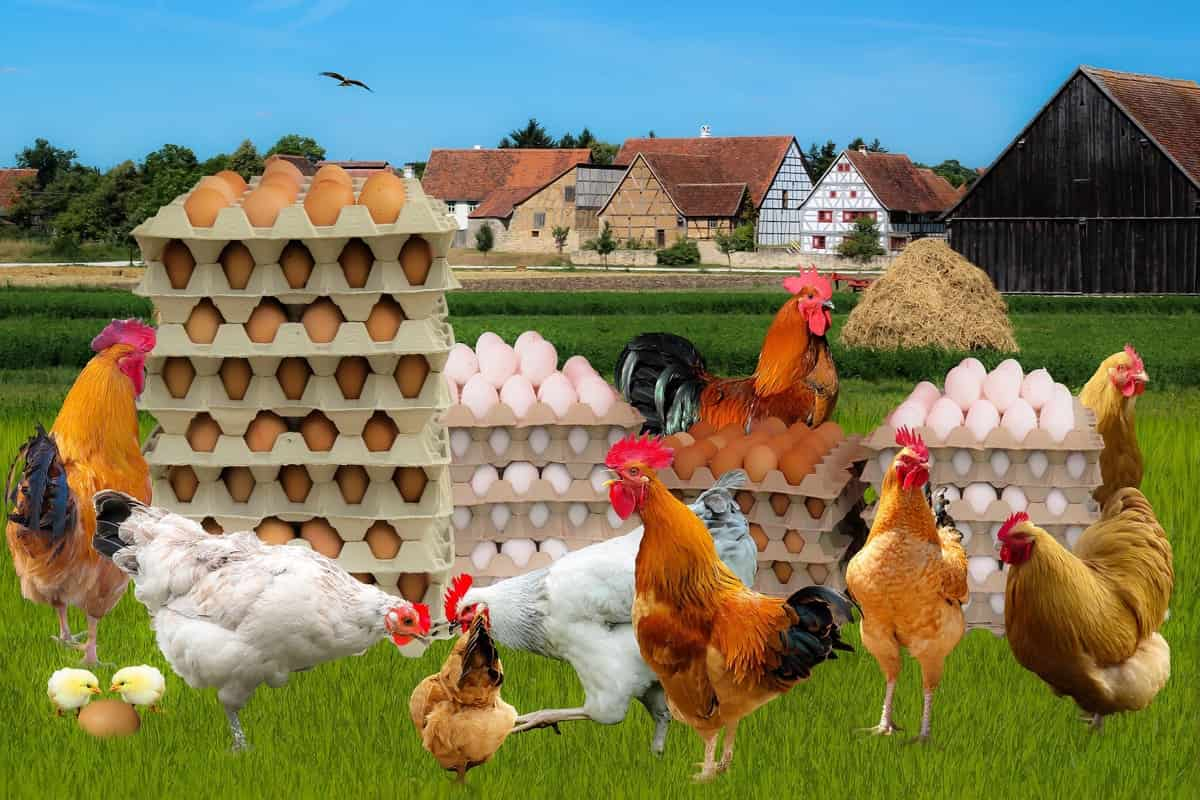
The poultry farming industry in Nigeria is the most lucrative business. Poultry farming loans and subsidies are available from various financial institutions in Nigeria. The interest rate on these loans is relatively low, making them affordable for small-scale farmers. The Nigerian government also provides subsidies for poultry farmers who meet certain criteria. These subsidies can cover up to 50% of the cost of poultry production, making poultry farming a viable option for small-scale farmers in Nigeria.
Poultry farming in Nigeria can be lucrative, but farmers face common problems. One of the most common problems is finding reliable staff to help run the farm. Another common problem is disease outbreaks. These can occur when birds are not appropriately vaccinated or come into contact with wild birds.
Infectious diseases such as Newcastle Disease and Avian Influenza can quickly spread through a flock and decimate a farm’s population. Finally, another challenge that poultry farmers face is theft. This is particularly common in rural areas where farms are often left unattended for long periods.
One key challenge facing poultry farmers in Nigeria is disease control. Outbreaks of avian influenza have caused significant losses for the industry in recent years. However, with proper biosecurity measures in place, such outbreaks can be prevented.
- The high cost of day-old baby chickens : Day-old baby chickens can be expensive if you buy from a reputable breeder. This makes it difficult for small-scale farmers to get started in the business.
- The risk of disease : Poultry farms are susceptible to diseases such as Newcastle Disease and Avian Influenza, which can kill entire flocks. Strict biosecurity measures must be implemented to minimize the risk of disease outbreaks.
- The need for specialist knowledge : Poultry farming requires specialist knowledge and skills, which can be difficult to acquire. There is also a lack of extension services and technical support available to poultry farmers in Nigeria.
Despite these challenges, poultry farming in Nigeria can be profitable if done correctly. With a growing population and increasing demand for chicken meat and eggs, there is great potential for growth in the Nigerian poultry industry.
You can start a small-scale poultry farming business in Nigeria with less than N150,000. Medium to large-scale farms need a lot more money, but starting a small poultry business is advisable even if you have more than enough funds to spare.
To calculate the profitability of poultry farming in Nigeria, you will need to consider the following factors:
- The cost of feed per bird
- The number of birds you plan to raise
- The price you plan to sell your chicken at
- The cost of any other necessary supplies (such as housing and water)
In case you missed it: Poultry Farming in New Zealand: Breeds, How to Start
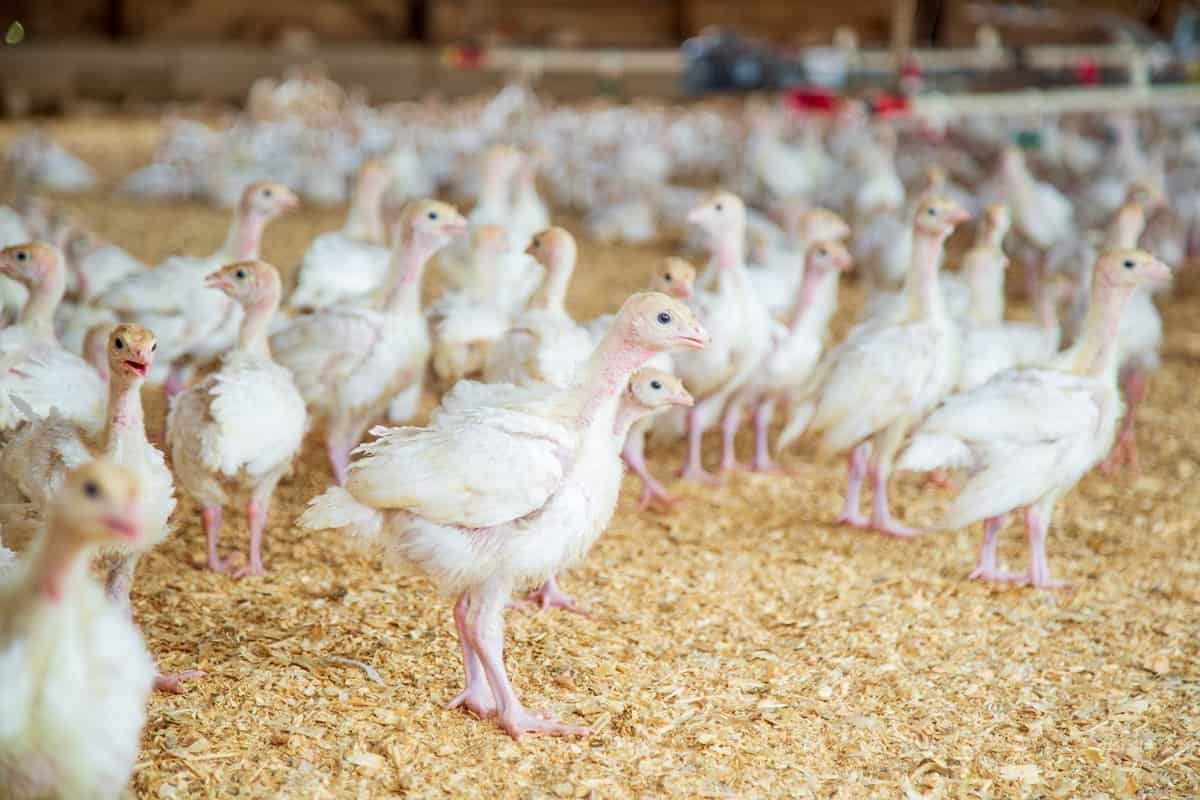
The average poultry farm set-up cost in Nigeria is about N150,000. This cost includes the purchase of day-old baby chickens, equipment, and other materials needed to get started. Commercial poultry farm set-up costs in Nigeria can be as high as N1 million. The average profit from a poultry farm in Nigeria is about N50,000 per month. This profit can be increased by selling eggs and meat at higher prices or by reducing the cost of production through better management practices.
Organic poultry farming in Nigeria is a type of farming where chickens are raised without antibiotics or other growth-promoting drugs. Chickens are fed an organic diet and are provided with ample space to roam and forage. Organic poultry farmers in Nigeria must meet the standards the Nigerian government sets to be certified. These standards include providing chickens with a clean and comfortable environment, access to fresh air and sunlight, and a nutritious diet.
Farmers must also avoid using any synthetic pesticides or herbicides on their farms. Organic poultry farming in Nigeria is still relatively new, but it is growing in popularity as more people become aware of the benefits. Consumers are willing to pay more attention to organic chicken meat because they know it is better for their health and the environment. Poultry farmers who switch to organic production can expect higher profits as demand for their product increases.
Poultry farming provides employment for many people and contributes to the economy. Poultry farming generally requires less land and capital than other livestock farming ventures, making it a more accessible option for small-scale farmers. Poultry farming is an important agricultural activity in Nigeria. It provides a source of income for small-scale farmers and contributes to the country’s food security.
Economical Aquaculture: A Guide to Low-Budget Fish Farming
15 common planting errors that can doom your fruit trees, how to make houseplants bushy: effective tips and ideas, innovative strategies for boosting coconut pollination and yield, pollination strategies for maximum pumpkin yield, the complete guide to chicken fattening: strategies for maximum growth.
- Natural Solutions for Tulip Problems: 100% Effective Remedies for Leaf and Bulb-Related Issues
Revolutionizing Citrus Preservation: Towards a Healthier, Greener Future
- Natural Solutions for Peony Leaf and Flower Problems: 100% Effective Remedies
- Maximizing Profits with Avocado Contract Farming in India: A Comprehensive Guide
- Natural Solutions for Hydrangea Problems: 100% Effective Remedies for Leaf and Flowers
- The Ultimate Guide to Choosing the Perfect Foliage Friend: Bringing Life Indoors
- From Sunlight to Sustainability: 15 Ways to Use Solar Technology in Agriculture
- The Ultimate Guide to Dong Tao Chicken: Exploring from History to Raising
- The Eco-Friendly Makeover: How to Convert Your Unused Swimming Pool into a Fish Pond
- Mastering the Art of Delaware Chicken Farming: Essentials for Healthy Backyard Flocks
- 20 Best Homemade Fertilizers for Money Plant: DIY Recipes and Application Methods
How to Craft a Comprehensive Free-Range Chicken Farming Business Plan
- Brighten Your Flock: Raising Easter Egger Chickens for Beauty and Bounty
- How to Optimize Your Poultry Egg Farm Business Plan with These Strategies
- Subsidy for Spirulina Cultivation: How Indian Government Schemes Encouraging Spirulina Farmers
- Ultimate Guide to Raising Dominique Chickens: Breeding, Feeding, Egg-Production, and Care
- Mastering the Art of Raising Jersey Giant Chickens: Care, Feeding, and More
- Ultimate Guide to Raising Legbar Chickens: Breeding, Farming Practices, Diet, Egg-Production
- How to Raise Welsummer Chickens: A Comprehensive Guide for Beginners
- How to Protect Indoor Plants in Winter: A Comprehensive Guide
- Ultimate Guide to Grow Bag Gardening: Tips, Tricks, and Planting Ideas for Urban Gardeners
- Guide to Lotus Cultivation: How to Propagate, Plant, Grow, Care, Cost, and Profit
- Agriculture Drone Subsidy Scheme: Government Kisan Subsidy, License, and How to Apply Online
- Ultimate Guide to Raising Araucana Chickens: Breed Profile, Farming Economics, Diet, and Care
- Bringing Hydroponics to Classroom: Importance, Benefits of Learning for School Students
- Ultimate Guide to Raising Polish Chickens: Breed Profile, Farming Economics, Diet, and Care
- Ultimate Guide to Raising Australorp Chickens: Profile, Farming Economics, Egg Production, Diet, and Care
- Silkie Chicken Farming: Raising Practices, Varieties, Egg Production, Diet, and Care
- Sussex Chicken Farming: Raising Practices, Varieties, Egg Production, Diet and Care
- Homemade Feed Formulations for Livestock: Discover Cost-effective Starter to Finisher Feed Recipes
I would like to say a big THANK YOU for this wonderful, clear and meaningful explanations.
LEAVE A REPLY Cancel reply
Save my name and email in this browser for the next time I comment.
Natural Solutions for Tulip Problems: 100% Effective Remedies for Leaf...
Natural solutions for peony leaf and flower problems: 100% effective..., maximizing profits with avocado contract farming in india: a comprehensive..., natural solutions for hydrangea problems: 100% effective remedies for leaf..., the ultimate guide to choosing the perfect foliage friend: bringing..., from sunlight to sustainability: 15 ways to use solar technology..., the ultimate guide to dong tao chicken: exploring from history..., the eco-friendly makeover: how to convert your unused swimming pool..., mastering the art of delaware chicken farming: essentials for healthy..., 20 best homemade fertilizers for money plant: diy recipes and..., brighten your flock: raising easter egger chickens for beauty and..., how to optimize your poultry egg farm business plan with..., borewell drilling cost, pump price, and pipe cost, polyhouse subsidy, cost, profit, project report, tractor subsidy, bank loan, eligibility, schemes, process, malabar neem project report details guide, cold storage project report, cost and subsidy, mushroom farming project report, cost and profit analysis.
Nigerian Price
Poultry farming business in nigeria & cost of starting (2024).
Poultry farming is one of the most lucrative forms of farming in Nigeria today. There is a very huge market for poultry products such as meat, eggs, and dung. The cost of starting a poultry farming business in Nigeria depends on the aspect of poultry farming that you want to engage in.
In this post, we will discuss the cost to start the different types of poultry farming. However, we will focus more on chickens (broilers and layers). We will also tell you how to start a profitable poultry farming business in Nigeria. Let’s dive straight in without further ado.
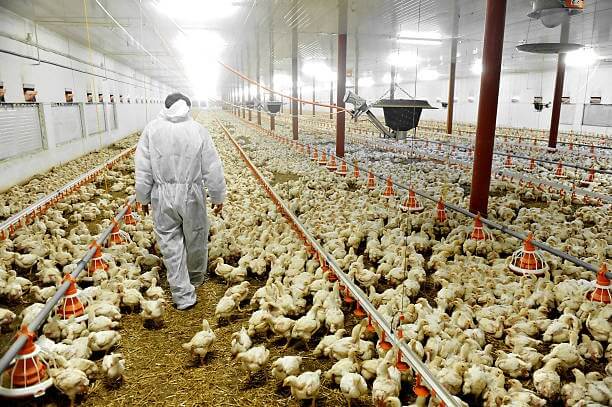
Cost of Starting a Poultry Business in Nigeria
According to research, many Nigerians are becoming millionaires simply by becoming poultry farmers. The first step to starting a profitable poultry business is first finding out how much capital you need. How much does it cost to start a profitable poultry farm? Several ingredients go into running a poultry farm. It doesn’t matter whether you deal in broilers or layers, there are certain costs that you cannot do without. Here is a list below:
Land is one of the primary needs you must meet when starting a poultry farm. You can either purchase land or lease one for the business. The cost of land is relative as it depends on the scale at which you want to run the farm and your location. In some parts of Nigeria, you can get farmlands for between N300,000 and N3 million per plot.
Housing construction
After getting the land, the next thing that you must invest in is the housing for the birds. There are different types of housing depending on the rearing system that you will employ. The cheapest method is the free-range system where there isn’t an exact building. You just allow the birds to roam around in the compound.
For best results, it is best to employ floor or cage systems. The floor system just requires you to build a poultry house and allow the birds to roam around in the building. Alternatively, you can make use of bird cages. This method is regarded as the best for layers. The cost depends on the size of the farm, but cages could cost from N300,000 – N500,000 for 500 birds.
Poultry equipment
There is a whole array of poultry equipment that you need to run a profitable poultry farming business. Your choice will depend on the system that you choose. The common pieces of poultry equipment that you will need include:
- Heaters or brooders
- Laying nests
- Ventilation fan
If you are running a commercial poultry farm, you should budget between N600,000 and N800,000 for poultry equipment. Smaller farms can budget between N60,000 and N210,000.
Vaccination and other medication costs
Vaccination is very important to ensure that your birds remain healthy. It also ensures that you reduce the mortality rate on your farm to the barest minimum. Just so you know, birds are highly prone to diseases and a single disease outbreak can wipe out the whole farm.
If you have a farm of 500 chicks, you should budget between N200,000 and N260,000 for vaccination and medication. The price may be negotiable depending on the veterinarian that you consult.
This is one of the most important and non-negotiable costs to deal with in poultry farming. You can either formulate your feed or purchase ready made feed from established vendors. The former option is more affordable, however, many of the feed ingredients on the market are adulterated. As such, we suggest that you stick to purchasing from established companies.
The feeding cost for 500 birds is between N150,000 and N300,000 for a month. If you are raising layers, you need to feed them for about 18 months. This means that you could spend between N2.7 million and N5.4 million on feeding alone.
Purchase of chicks
The main raw material for poultry farming is chicks. Without them, everything else is a waste of investment. Currently, day-old chicks cost between N500 and N1000. If you want to purchase point-of-lay birds, they cost between N2,500 and N3,000.
PRICES LAST UPDATED: NOVEMBER 18, 2022.
How to Start the Poultry Farming Business in Nigeria
Wondering how to start the poultry business in Nigeria? Check out the tips below:
Study the market
The first thing that you should do is to study your market. A detailed feasibility study helps you to know what the market holds, how much capital you need, and who your prospective customers are. It also helps you to know who your competitors are and how to surpass them.
Write a business plan
After you have carried out a detailed study of the market, the next step is to write a business plan. A business plan gives a clear indication of what your business sets out to achieve. It acts as the map of your business and also helps you to attract investment when the need arises. If you cannot write a detailed business plan, you can draw up a Business Module Canvas (BMC) instead.
Seek out reputable suppliers
Two very important aspects of this business are getting healthy stock and purchasing healthy feed. You need reputable suppliers for both. Ensure that you find suppliers that have a healthy stock of birds. Doing this saves you from having excess mortality on your farm. It also assures you of high productivity. You should also seek out suppliers that have the best quality feed on the market. Don’t settle for cheap prices as they could mean substandard products.
Raise capital
Capital here means the funds you need for the business as well as the land and the equipment that you need. You can either raise capital from your savings or taking a loan. Other ways of raising capital include grants and funding from friends and family members.
Gather knowledge
In rounding up this post, we suggest that you gather as much knowledge about this business as possible. Poultry farming requires a hands-on approach, so you must be knowledgeable about raising birds. You can reach out to existing farmers to find out their failures and successes. This knowledge will help run your business.
Related Posts
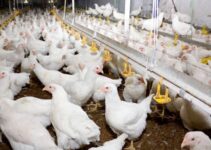
Cost of Rearing 500 Broilers in Nigeria (April 2024)

Prices of Cows in Nigeria (April 2024)
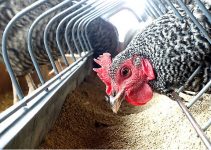
Chicken Feeds Price List in Nigeria (April 2024)
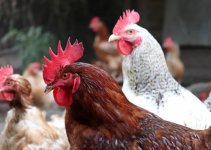
Best Breeds of Broilers in Nigeria & Prices (April 2024)

Cost of Starting a Poultry in Nigeria (April 2024)
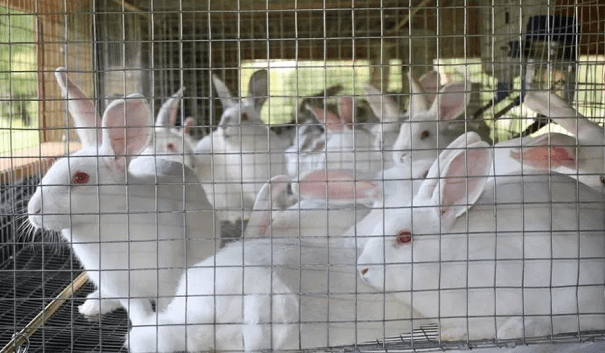
Prices of Rabbits in Nigeria (April 2024)
Leave a reply cancel reply.
You must be logged in to post a comment.
StartBizEasy
Step-By-Step Guide to Starting a Profitable Poultry Farming Business in Nigeria

Poultry farming in Nigeria is a dynamic and economically significant agricultural venture that involves the breeding, rearing, and management of domesticated birds, primarily chickens, for the production of meat (broilers) and eggs (layers).
This agribusiness sector plays a crucial role in the country’s food production, providing a sustainable source of protein and contributing to economic growth.
In this article, we shall be focusing on Starting a Profitable Poultry Farming Business in Nigeria.
Table of Contents
1. get your mindset right:.
The Poultry farm business is the most profitable of all Nigeria’s agricultural sub-sectors with a current market value of about N1.6 trillion approximately $4.2 billion according to both CBN and United Nations Food and Agricultural Organisation (UNFAO) report.
Before embarking on this poultry farming business venture, it’s crucial to see it beyond mere farming. You must perceive this undertaking as a business and treat it accordingly.
While it’s true that some individuals have amassed fortunes in this industry, that alone doesn’t guarantee success. Every business, even the world’s top companies, relies on effective management.
The failures in businesses often stem from the people overseeing them rather than an inherent lack of potential in the Business. Despite the perceived profitability of poultry farming, it’s not as flawless as one might assume.
Many people think that diving into the poultry business is a surefire way to make quick millions. If it were that simple, poverty wouldn’t persist in Nigeria. I’m not suggesting that it’s extremely challenging, but rather emphasizing the need for the right knowledge to run a successful poultry farm, both within and outside Nigeria.
To truly derive value from any business endeavor, including poultry farming, it’s imperative to invest time in learning its intricacies.
I recall an individual who owned a small poultry with just five chicks. Unfortunately, he experienced a high mortality rate among them and, perplexed, ended up consuming the surviving chicks while they were still young.
Upon investigating the cause of this business setback, I found that the man lacked sufficient knowledge about poultry farming. This scenario isn’t isolated; numerous others in Nigeria encounter similar issues with their poultry businesses.
As reiterated earlier, you must approach it with a business mindset—taking it seriously. This perspective should be instilled not only in yourself but also in your team members, including investors.
2. Capital:
Starting a poultry farm in Nigeria on a commercial scale with profit in view will require a minimum investment of 2million Naira.
This capital will be spent on:
- Land and Infrastructure: Purchase or lease of land and construction of poultry houses, pens, or cages
- Equipment: Purchase of equipment such as feeders, drinkers, heat lamps (for brooding), and egg collection systems (for layer farming).
- Chicks or Pullets: Cost of acquiring the initial stock of chicks or pullets. The price can vary based on the breed and source.
- Feed: Working capital for purchasing poultry feed. The amount will depend on the number of birds and their growth stage (starter, grower, or layer feed).
- Labor: Payment for labor, including farm workers responsible for tasks such as feeding, cleaning, and general farm management.
- Utilities: Budget for utilities such as electricity and water supply, especially if the farm is not located in an area with readily available services.
- Veterinary Care: Budget for veterinary services and medications to ensure the health of the poultry flock.
- Miscellaneous Expenses: Additional costs for items such as bedding material, waste disposal, transportation, and other miscellaneous farm-related expenses.
It’s important to note that the capital required can vary widely based on the scale of your poultry farm. Small-scale and backyard poultry farms may require less initial capital compared to large commercial operations.
As a rough estimate, for a small to medium-scale poultry farm with around 500 birds (broilers or layers), you might need a starting capital ranging from N2,000,000 to N6,000,000, depending on the factors mentioned above.
Keep in mind that it is advisable to conduct a detailed feasibility study and business plan to determine your specific requirements and financial projections.
3. Secure a Land:
Certainly, acquiring land is a necessity; no farming business worldwide can operate without it.
In Nigeria, a standard plot of land is typically measured at 120 by 60, and an acre comprises six plots.
The amount of land you require for your proposed poultry farming project depends on your specific plan.
Here are essential considerations before securing land:
- Location: Avoid selecting land in a residential area due to potential issues related to the unpleasant odors and noise generated by the poultry. Opt for a location in a developing area that is expected to remain non-residential for several years.
- Size: For instance, if you plan to rear 2000 layers or a similar number of broilers, approximately one and a half plots should suffice. Opting for two plots is not necessarily wasteful; it provides additional space for storing poultry equipment.
- The Land should not be swampy.
Ensure that your choice of land aligns with the scale and nature of your poultry farming operation.
4. Training:
This is really essential and it is advisable to get yourself through practical training on a farm where the owner has over 3 years experience in the poultry business.
Getting yourself and employees through training prevents trial and error.
Trust me when I tell you that errors can cost you millions in this business.
5. Get Your Poultry Pens Ready:

Constructing poultry pens should never rely on assumptions; it requires a specific and informed approach.
Poultry pens are designed in a way that distinguishes brooding pens from layers pens. The brooding pen is specially crafted for very young chicks, catering to their unique needs.
During this initial stage, chicks, much like newborn babies, should not be exposed to cold conditions. This consideration is a crucial factor in designing a brooding pen.
It’s essential to recognize that the most critical period in your poultry business occurs during the first few weeks, known as the brooding period. During this phase, your birds are exceptionally delicate, and without proper care, they can succumb to various challenges easily.
The brooding stage demands serious attention, ideally from someone well-versed and experienced in handling this crucial period. The expertise required is paramount because small oversights can lead to significant consequences.
In any commercial chicken farming venture, the necessity of a poultry pen is unavoidable unless you are opting for organic poultry farming.
Understanding and addressing the unique needs of each stage, especially during the brooding period, is fundamental to the success and well-being of your poultry.
6. Getting the Chicks:

Getting the chicks is very important because it is the foundation of this whole business.
As the saying goes, “If the foundation is faulty, what can the righteous do? Nothing.”
Choosing the right hatchery is crucial because the quality of the chicks profoundly influences their future growth. Birds obtained from an unreliable hatchery are likely to face challenges as they develop due to inherent deficiencies.
These deficiencies arise when essential vaccinations are omitted, and proper hatchery protocols are neglected. Consequently, these birds may struggle with their health throughout their lives.
To ensure the well-being and success of your poultry venture, exercise caution in selecting where and how you procure your chicks. Opt for a reputable hatchery to lay a strong foundation for your business.
The time it takes for an agricultural or farm-raised chicken (referred to as “agric fowl”) to reach maturity for processing and consumption depends on the type of chicken and the desired market weight.
- Broilers: Broilers are chickens specifically raised for meat production. They are typically ready for processing at a relatively young age, around 6 to 7 weeks. Broilers are bred for fast growth and efficient meat production.
- Layers or Dual-Purpose Chickens: Chickens raised for both egg-laying and meat (dual-purpose) or those raised primarily for egg production (layers) are usually processed later than broilers. For meat, they are typically ready for processing around 14 to 20 weeks, depending on the breed and desired weight.
- Cockerels: Cockerels are male chickens raised for meat. They are often processed at a later age compared to broilers, typically around 14 to 20 weeks, again depending on the breed and desired weight.
It’s important to note that the processing age can vary based on factors such as genetics, nutrition, and management practices.
In some cases, farmers and producers often determine the optimal processing age based on the specific goals of their operation and the market they are targeting for the sale of poultry meat.
7. Implement Biosecurity Measures:
Effective biosecurity measures are crucial in poultry farming to prevent the introduction and spread of diseases among the flock. Disease prevention is a key aspect of maintaining the health and productivity of poultry.
These biosecurity measures encompass:
1. Quarantine Procedures for New Birds: Quarantine involves isolating new birds from the existing flock for a specific period to monitor their health and prevent the potential spread of diseases.
The quarantine procedures for New Birds:
- Isolation Area: Designate a separate area for new birds away from the existing flock.
- Duration: Keep new birds in quarantine for at least 2-4 weeks.
- Health Checks: During quarantine, regularly monitor the health of new birds for signs of diseases.
- Biosecurity Protocols: Ensure strict adherence to biosecurity protocols, including using separate equipment and clothing when handling quarantined birds.
2. Regular Health Checks: Regular health checks involve systematic observations and assessments of the overall health and well-being of the poultry flock.
The efficient procedure of regular health checks in poultry farm is normally carried out by:
- Visual Inspections: Conduct regular visual inspections to identify any signs of illness, unusual behavior, or changes in appetite.
- Record-Keeping: Maintain detailed health records, documenting observations, treatments, and any abnormalities.
- Professional Assistance: Engage a qualified veterinarian for regular health assessments and to address any health concerns promptly.
3. Vaccination Programs: Vaccination is the administration of vaccines to poultry to stimulate the immune system, providing protection against specific diseases. These vaccination programs are carried out by:
- Vaccine Schedule: Develop a comprehensive vaccination schedule based on the specific diseases prevalent in your region.
- Proper Storage: Ensure proper storage of vaccines according to manufacturer guidelines to maintain their effectiveness.
- Administering Vaccines: Administer vaccines according to recommended dosages and methods, considering the age and health status of the birds.
- Record Keeping: Maintain accurate records of vaccination dates, types, and batches used for each bird.
Benefits of Biosecurity Measures in a poultry farm:
- Disease Prevention: Reduces the risk of introducing and spreading diseases within the poultry flock.
- Productivity: Healthy birds are more productive in terms of egg production (layers) or weight gain (broilers).
- Economic Stability: Minimizes the financial impact of disease outbreaks on the poultry farming business.
- Sustainable Operations: Promotes long-term sustainability by preventing the development of antibiotic-resistant strains due to overreliance on medication.
Challenges of Biosecurity Measures in a poultry farm:
- Costs: Implementing biosecurity measures may incur additional costs, but the long-term benefits often outweigh the expenses.
- Compliance: Ensuring consistent compliance with biosecurity protocols may require ongoing training and monitoring of farm personnel.
Implementing biosecurity measures is a proactive strategy to safeguard the health and productivity of your poultry farm.
8. Management:
How can a business succeed without good management?
Good poultry business management is needed to keep things running both for the birds and the people (employees) involved in the poultry business.
Learn more about Business Management and growth from this; 6 Business Growth and Development Strategies that work Today.
Types Of Equipment & Tools Used In The Poultry Farming Business
Here are the types of equipment and tools used in poultry farming in Nigeria:
- Poultry Houses/Coops: Brooder houses for chicks, Layer houses for egg-laying hens, and Broiler houses for meat chickens
- Feeders: Gravity feeders, Trough feeders, or Automatic feeders
- Watering Systems: Nipple drinkers, Bell drinkers, or Automatic waterers
- Incubators: Used for hatching eggs and raising chicks
- Brooders: Heat lamps or electric heaters to provide warmth for chicks
- Egg Trays and Cases: For collecting and transporting eggs
- Nesting Boxes: Provide a place for hens to lay eggs
- Egg Candlers: Used to check the fertility of eggs during incubation
- Ventilation Systems: Fans and vents to regulate air circulation in poultry houses
- Lighting Systems: Artificial lighting to stimulate egg production
- Poultry Cages: Commonly used for layer birds to facilitate egg collection
- Manure Removal Systems: Conveyor belts or manual methods to remove waste from the poultry house
- Biosecurity Equipment: Footbaths, hand sanitizers, and other tools to prevent disease transmission
- Egg Grading and Sorting Machines: Automates the process of sorting and grading eggs
- Poultry Scales: Used for weighing birds for monitoring growth and feed efficiency
- Poultry Vaccination Equipment: Syringes and needles for administering vaccines
- Poultry Processing Equipment: Equipment for slaughtering and processing birds for meat
- Record-Keeping Tools: Farm management software, notebooks, or other tools for keeping track of production data
- Poultry Health Products: Medications, vitamins, and supplements to maintain bird health
- Egg Washers: Equipment for cleaning and sanitizing eggs
These tools and equipment contribute to the efficiency and success of poultry farming operations in Nigeria, helping farmers manage their flocks, ensure proper nutrition, and maintain the overall health of the poultry.
How much money can you make from poultry farming in Nigeria?
Analysis of Profit Potential in Poultry Farming in Nigeria: A Case Study of 500 Layers
In Nigeria, poultry farming, specifically layer farming, presents a viable business opportunity. The profitability of this venture can be assessed through a comprehensive analysis of recurring expenses and potential revenue. Here’s a breakdown of the financial aspects based on the case study of a 500-layer poultry farm:
1. Expenses Calculation:
- Chick Cost: N60,000
- Chick Mash (0-8 weeks): N408,000
- Grower Feed (9-20 weeks): N480,000
- Medication (4 months): N7,440
- Vaccination: N7,050
Total Expenses: N962,490
2. Revenue Generation:
Note: Typically, a hen, which is a female chicken, lays eggs almost daily. On average, hens lay between 4 to 7 eggs per week. This means that over the course of a month, a hen can lay anywhere from 16 to 28 eggs, depending on various factors such as breed, age, and environmental conditions.
Still using our case study of 500 layers: Let’s assume an average laying rate of 5 eggs per week per hen, the calculation would be as follows:
Number of eggs laid by one layer per week = 5 Number of layers = 500
Total number of eggs per week = 5 (eggs per layer) X 500 (number of layers) = 2,500 eggs
Assuming a month has roughly 4 weeks:
Total number of eggs per month = 2500 (eggs per week) X 4 (weeks) = 10,000 eggs
Number of eggs = 10,000 Eggs per crate = 30
Number of crates = 10,000 (eggs) / 30 (eggs per crate) ≈ 333 crates
The cost of a crate of eggs = N2,500
Monthly Revenue from Egg sales = 2,500 X 333 = N832,500
- Egg Sales (12 months): N9,990,000
- Sold Layers @N2,500 per 1 (after 1 year and 8 months): N1,250,000
Total Revenue: N11,240,000
3. Profit Calculation:
- Total Revenue – Total Expenses: N11,240,000 – N962,490 = N10,277,510
Note: The net profit is subject to variations in production, market conditions, and the successful implementation of biosecurity measures.
When does a Layer stop laying
The laying productivity of a layer (a chicken raised primarily for egg production) tends to decline as the bird ages.
The age at which a layer stops laying eggs can vary based on factors such as breed, genetics, health, and management practices. Here is a breakdown explanation:
- Peak Production: Layers typically reach peak egg production in the first year of laying, usually around 6 to 12 months of age. During this period, they lay eggs consistently and at a relatively high rate.
- Decline in Productivity: After the first year, egg production gradually declines. While some hens may continue laying eggs for several years, the rate and frequency of laying decrease.
- End of Lay: In commercial egg production, hens are often considered to be at the end of their productive laying life around 2 to 3 years of age. At this point, the decline in egg production becomes more significant, and the cost of maintaining the hens outweighs the economic benefits of the eggs they produce.
- Molting and Rest Periods: Layers may experience a molt, a natural process of feather shedding and regrowth, which can also affect egg production. Additionally, some producers intentionally give hens a rest period to allow their bodies to recover before another laying cycle.
It’s important to note that backyard or small-scale farmers may choose to keep older hens for reasons other than egg production, such as pest control or as pets. The decision to cull or retire a layer depends on the goals and priorities of the poultry keeper.
How Long does It take for a Layer to be Rear and Ready for sale
The time it takes to rear a layer (a female chicken raised for egg production) and get it ready for sale depends on various factors, including the breed of the chicken, the production system, and the specific goals of the poultry farm. Here is a general timeline guide:
- Chick Stage: Day-old chicks are typically purchased for rearing layers. The chick stage lasts for several weeks, during which the chicks are raised in a brooder with controlled temperature and provided with appropriate nutrition.
- Pullet Stage: After the chick stage, the birds are referred to as pullets. The pullet stage lasts from a few weeks to a few months, depending on the breed. During this time, the pullets are gradually transitioned to the layer diet, and they develop the physical and reproductive maturity necessary for egg-laying.
- Point of Lay: This is the stage when pullets reach sexual maturity and are ready to start laying eggs. The age at which a pullet becomes a “point of lay” can vary, but it is typically around 18 to 22 weeks, depending on the breed and management practices.
- Egg Production: Once the pullets reach the point of lay, they usually start laying eggs regularly. The peak of egg production is often reached a few weeks after the onset of laying.
In summary, it generally takes around 18 to 22 weeks for layers to be reared and reach the point of lay. After reaching the point of lay, they can be considered ready for sale as egg-laying hens or as meat.
Which poultry farm is most profitable?
Here are types of poultry farming considered to be very profitable in Nigeria:
- Broiler Farming: Broiler farming, which involves raising chickens for meat production, is often considered profitable due to the relatively short production cycle. Broilers are typically ready for market within 6 to 8 weeks. The demand for chicken meat is generally high, making it a potentially lucrative venture.
- Layer Farming: Layer farming, focused on egg production, can also be profitable. Layers are productive for an extended period, and eggs have a consistent demand in the market. However, egg production is a longer-term investment compared to broiler farming.
- Free-Range or Organic Poultry Farming: Some farmers opt for free-range or organic poultry farming, where birds are raised with access to outdoor areas and are often provided with organic feed. While this approach may have higher production costs, it can cater to niche markets willing to pay a premium for organic or free-range products.
- Poultry Breeding: Poultry breeding operations involve breeding and selling day-old chicks or hatching eggs to other farmers. This can be a profitable niche, especially if the breeder focuses on producing high-quality, disease-resistant, or specialty breeds.
- Quail or Turkey Farming: Depending on the local market demand, farming quails or turkeys are also profitable. Quail eggs and turkey meat are sought after by most consumers in Nigeria.
- Integrated Poultry Farming: Some farmers choose integrated poultry farming, combining broiler and layer farming, to diversify their income streams. For example, income from selling broilers can supplement revenue during the initial stages of layer farming.
It’s crucial to know that profitability is influenced by factors such as efficient feed management, disease control, biosecurity measures, and effective marketing strategies. Additionally, compliance with regulations and standards set by the government authority is essential for sustained success in the poultry industry.
What are the opportunities in poultry farming in Nigeria?
Poultry farming in Nigeria offers various opportunities for individuals seeking to enter the agricultural sector, such as:
- Broiler Farming: Raising chickens specifically for meat production (broilers) is a lucrative venture in Nigeria due to the high demand for chicken meat. The relatively short production cycle of broilers (6 to 8 weeks) allows for a quick return on investment.
- Layer Farming: Egg production from layers is another significant opportunity. Eggs have a consistent demand in the market, and layer farming can provide a steady income over a more extended period compared to broiler farming.
- Poultry Breeding: There is a demand for high-quality day-old chicks and hatching eggs in Nigeria. Poultry breeders can focus on producing disease-resistant or specialty breeds to meet specific market needs.
- Free-Range and Organic Farming: With the increasing demand for organic and free-range products, there is an opportunity for farmers to cater to niche markets. Offering eggs or meat from birds raised with access to outdoor areas and organic feed can attract health-conscious consumers.
- Value-Added Products: Processing poultry products into value-added items such as sausages, smoked chicken, or pre-packaged cuts can open up new markets and increase profitability.
- Quail Farming: Quail farming has gained popularity in Nigeria. Quail eggs are considered nutritious, and quail meat is also sought after. Quail farming requires less space and can be a viable option for those with limited resources.
- Turkey Farming: Raising turkeys can be profitable, especially around festive seasons when there is an increased demand for turkey meat. Turkey farming can be a complementary venture for poultry farmers looking to diversify.
- Poultry Waste Management: Utilizing poultry waste for compost or as fertilizer can be an additional source of income. Proper waste management practices contribute to environmental sustainability.
- Training and Consultancy: Experienced poultry farmers can offer training and consultancy services to individuals interested in starting or improving their poultry farming operations.
- Government Support Programs: Various government support programs and initiatives exist to encourage and empower poultry farmers. These may include subsidized loans, training programs, and assistance with acquiring equipment.
To capitalize on these opportunities, aspiring poultry farmers should conduct thorough market research, implement sound management practices, prioritize biosecurity measures, and stay informed about industry trends and best practices.
Additionally, taking advantage of available support programs can contribute to the success of your poultry farming ventures in Nigeria.
Challenges in Poultry Farming Business in Nigeria
Here are the prevalent challenges faced by poultry farmers in Nigeria along with potential solutions:
- Disease Outbreaks: Poultry farms are susceptible to diseases that can quickly spread and lead to significant losses. Solution: Implement strict biosecurity measures, conduct regular health checks, and collaborate with veterinarians for preventive healthcare.
- Inadequate Infrastructure: Lack of proper infrastructure, including reliable electricity and water supply, can hinder poultry farming operations. Solution: Invest in alternative power sources (e.g., generators, solar) and water storage systems. Consider location factors when setting up the farm.
- Feed Costs: The cost of poultry feed, a significant expense, can fluctuate due to market conditions. Solution: Explore cost-effective feed options, engage in bulk purchasing, and consider on-farm feed production. Optimize feed management practices.
- Market Access: Finding reliable markets for poultry products can be challenging, affecting profitability. Solution: Establish partnerships with local markets, restaurants, and retailers. Explore online sales platforms. Diversify products to meet market demands.
- Government Policies: Regulatory challenges and policy changes can impact the poultry industry. Solution: Stay informed about government policies, join industry associations to advocate for favorable policies, and actively engage with relevant regulatory bodies.
- High Mortality Rates: High mortality rates, especially among chicks, lead to financial losses. Solution: Provide a conducive environment, proper nutrition, and regular health checks. Follow recommended vaccination schedules.
- Access to Finance: Limited access to affordable financing for poultry farming operations can be a constraint. Solution: Explore government-sponsored agricultural loans and grants. Establish a solid business plan to attract private investors or financial institutions.
- Lack of Training: Inadequate knowledge and skills among farmers can lead to suboptimal practices. Solution: Seek training programs, workshops, and extension services. Stay updated on best practices through industry publications and online resources.
- Climate Variability: Unpredictable weather patterns impact poultry farming, affecting temperature control and feed production. Solution: Invest in climate-controlled housing, explore drought-resistant feed options, and develop contingency plans for extreme weather events.
- Market Fluctuations: Price fluctuations in the poultry market impact profit margins. Solution: Diversify products, implement efficient cost management practices, and monitor market trends to make informed business decisions.
Successful poultry farming in Nigeria requires a proactive approach to addressing these challenges to prevent mass loss.
Recommended articles:
- Pig farming business in Nigeria
- Goat farming business in Nigeria
- Fish farming business In Nigeria
Starting a poultry farming business in Nigeria requires dedication, careful planning, and ongoing management.
Regularly assess and adjust your strategies based on the evolving needs of your farm and the market.
Engaging with experienced poultry farmers and agricultural extension services can provide valuable insights and support for your journey in poultry farming.
I hope you benefited from this article; poultry farming business in Nigeria.
Do you have questions or contributions? please drop them in the comment section below.
Be a Lifter via the share buttons to others who could be in need of such knowledge.
Remember to turn on the Bell 🔔 Notification icon to get updated on new content.
Share this:
- Click to share on Facebook (Opens in new window)
- Click to share on X (Opens in new window)
- Click to share on WhatsApp (Opens in new window)
- Click to share on Reddit (Opens in new window)
- Click to email a link to a friend (Opens in new window)
I am Eghosa Kester Igbinigie, the owner of StartBizEasy.com and Richnuggets.com. As a business enthusiast, writer, and speaker, I hold a degree in Business Administration (BSc) and own several successful businesses
Similar Posts

How to Start a Business as a Student (Earning While Learning)
As a student, the journey of starting a business might seem like a stressful and difficult task, because it is going…

The Biggest Challenge for Most Businesses When Going Online
The world has gone digital, and businesses are not left out in the race for digital relevance. Many businesses in Nigeria…

The Top 5 Small Businesses to Start in India?
A great way to establish financial independence and a reliable source of income is to launch a small business. We comprehend…

How to Start a Cyber Cafe Business in Nigeria (The 9 Steps)
The cyber cafe business might not be that golden business as it was in the early 2000s, but if rightly located…

How to Register a Business Name in Nigeria in 7 Easy Steps
In this blog post we will take you through the journey on How to Register a Business Name in Nigeria. It…

How to Start a Vending Machine Business in 5 Minutes
Worry no more about your quest on “How to Start a Vending Machine Business”, because in this article, we will reveal…
I enjoyed reading this article. However, I lost you when you got to the drugs section. I could not make sense of the ‘Standard Calculation… There was also the vaccination line that is completely omitted from the calculation. Then the rest of Some necessary vaccination for layers that did not give proper calculation references to arrive at the stated amount: N7,050.
When you got into the calculations when they start laying, the medicines and vaccines are missing. So, based on these factors, I’ll put forward that this will be a money-losing venture regardless of how one scales the venture because there would be the following costs that your analysis cannot cover: housing (Pen), equipment, staff, and other costs.
Please tell me I am wrong and prove it.
You are wrong. For clarification on the drugs, you can tell the owner of the hatchery to put you through for better understanding. The reason I didn’t include the Pen is that the pen is a one time cost. Those expenses (one-time cost) are what you can always cover overtime.
And no one starts making a profit from day one in any business (even if you are an employee), you must first incure expenses before the profits start coming.
Leave a Reply Cancel reply
Your email address will not be published. Required fields are marked *
Notify me of follow-up comments by email.
Notify me of new posts by email.
Discover more from StartBizEasy
Subscribe now to keep reading and get access to the full archive.
Type your email…
Continue reading

8 Easy Steps to Start a Profitable Small-scale Poultry Farming Business in Nigeria
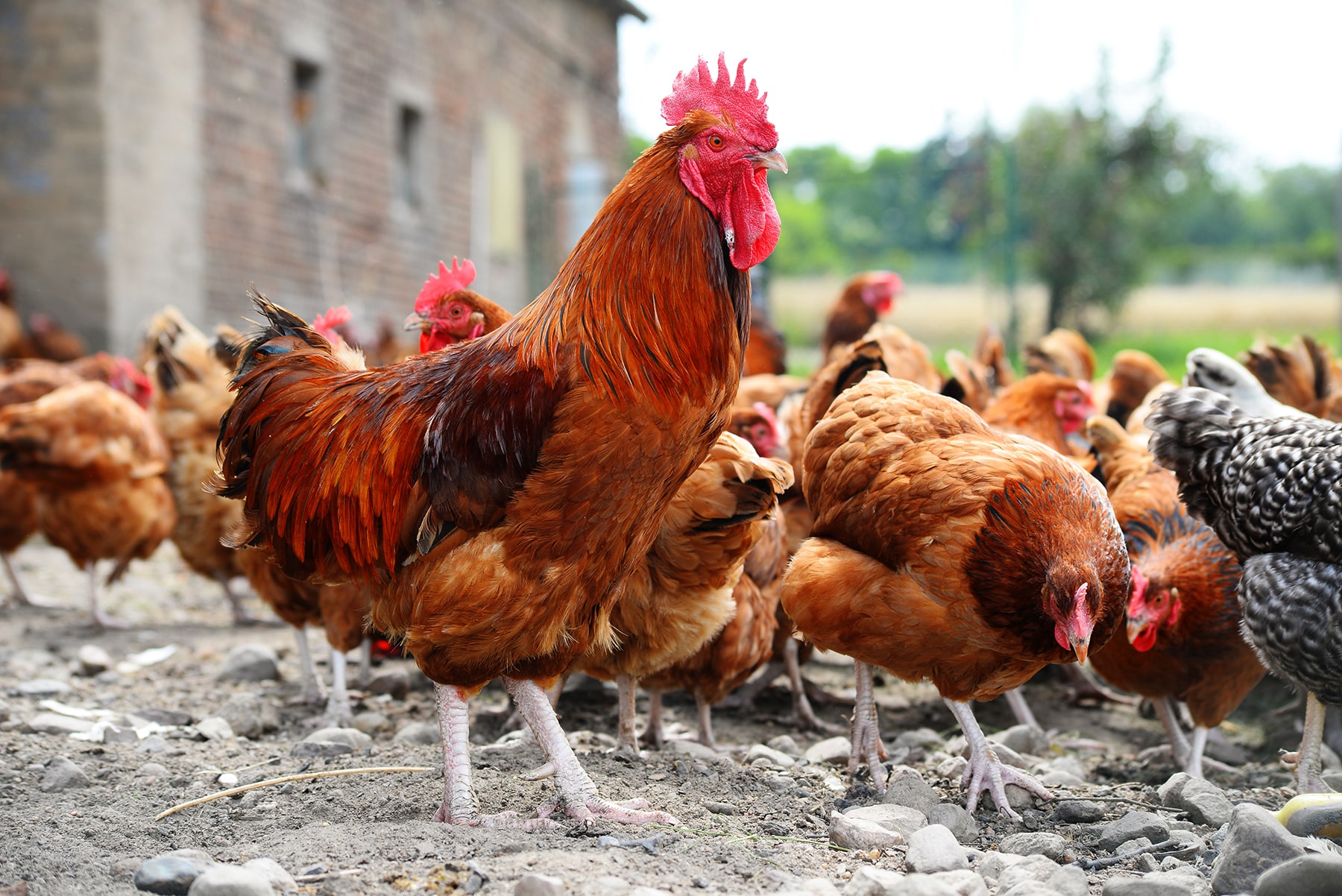
Most of us know this! Yes, we are aware that finding a good-paying job in Nigeria is almost impossible. Probably, the reason you’re reading this is that you are fed up with having to submit your CV to every job advert you come across. Then you stare at your Email every day, expecting a miracle, which honestly is what finding a job in Nigeria looks like nowadays.
Well, don’t fret! Please don’t give up yet, because I am about to disclose some secret gem hidden insight. Yes, you will learn the 8 simple steps to Start a Profitable Small-scale Poultry Farming Business in Nigeria .
We’ve all at one point in time heard of entrepreneurship. Simply put, being your boss. Thousands of Nigerians are successfully establishing their businesses. They are making decent profits annually from their establishments, but I won’t delve in on that fact because that is what we see every day.
You would, however, be learning one of the highly profitable businesses only a handful of people understand. That secret gem is poultry farming. This is raising and selling birds breeds and their byproducts in exchange for money.
Just like many starters, you might have low capital to start it up, or you may want to test the waters. Whichever’s the case, this piece got you covered.
Insight Business: Easy Ways To Raise Startup Capital As An Entrepreneur in Nigeria
Table of Contents
What is a Small-scale Poultry Farming Business?
As the name implies, it is raising and selling birds and their byproduct on a low budget. This entails that a minimum labor force is required. In some cases where the number of birds is small, the need for extra hands might not be necessary. Immediate family members can aid in carrying out specific operations.
Poultry farming is considered small scale when the number of birds ranges from 50-500. There are about seven types of poultry farming in Nigeria, they include;
- Chicken (broilers and layers)
- Turkey (meat)
- Guinea Fowl (meat, egg, feathers)
- Geese (egg, meat, and feathers)
- Ducks (egg, meat, and feathers)
- Quail (egg and meat)
- Pigeon (meat)
Each of them has regions where they are in high demand. Of course, more than one can be in demand in the same area. All you need do is study the local market and access the demands for poultry and their current prices in your preferred location. You can indeed combine more than one type of poultry farming, but it is advised you have ample knowledge and experience before you venture into any poultry business.
Having more than two types can be confusing for a single farmer and a bit more stressful because different types of poultry have similar and distinct characteristics, diseases, and feed preferences, which you as a farmer should know well. If you have little to no knowledge about birds, their health, and their diseases, ensure you sort the help of experienced poultry farmers. Also, keep a veterinary doctor handy.
When deciding on the type of poultry farming to go into, you should think of the housing type that best suits your needs and budget. Some of the poultry housing systems include,
- Extensive poultry house system (allowing birds to roam)
- The semi-intensive system (partly intensive and partly free-range, this is commonly used by small scale farmers)
- Folding units poultry house system
- Intensive poultry house system ( deep litter house system and poultry cage house system)
Click here to read more on the types of poultry house systems.
Insight Business: How to grow your business to dominate your industry
Essential things you need to start a poultry farming business in Nigeria
To start up your smalls scale poultry in Nigeria, you must secure land first. This can be a space behind your house or a different site altogether. The price of land varies in different regions and locations. A plot of land can be gotten between #600,000 to #2,000,000 in semi-urban areas.
In some rural areas, you can get lands for as low as #300,000 and more downward. The size of land should be dependent on the number of birds and possible future expansions.
This can be in the form of the simple construction of basic poultry structures, battery cages, free-range, depending on what is convenient and affordable for you.
Electricity
This is used for brooding, feeding, egg production, as so much more.
They include feeding trough, drinking trough, shovels, buckets, etc.
Breeders who want to rear day-old chicks should spread cartons on the floor for the first several weeks. Many farmers cover the floors of their brooder pens with wood dust, but studies show that the dust particles are inhaled by the chicks, creating respiratory issues.
Wood Shavings
In the final phases of chicken production, you can use this as flooring. When soaked in poultry excrement, it becomes a high-quality manure that may be sold to crop producers.
Feed/ medicine
An integral part of poultry production. The type and quality of feeding determine production output. Vaccines and drugs for common diseases should be bought alongside bird feeds.
8 Steps to Start A Poultry Farming Business in Nigeria
Educate yourself/ choose the breed of poultry and poultry product.
As the saying goes, “when you fail to plan, you plan to fail. You cannot just jump into the poultry business or any other type of business without reasonable knowledge and skill of the industry. It’ll only lead you to failure and frustration.
As an aspiring poultry farmer, you need to learn and practice. You can do this either by going for practical classes in poultry farmlands or employing an experienced poultry farmer to put you through. However, you needn’t stop there. You can gather more knowledge from books, articles, and blogs related to your desired niche on your own.
Sourcing information from other poultry farmers and your local market can help you determine the type of poultry and poultry product to venture into. Doing these solidifies your ground and goes a long way to make your ride less bumpy.
Secure your capital
This might be your savings , a loan, grant, etc. This is what you’ll decide to start poultry farming business in Nigeria with. Securing your capital can be done before or after planning your business. Depending on what you want to achieve, you may decide to work according to your budget or source for capital above your budget.
Be strategic
The location of your farm, your target market, the breed of bird, and everything involved in your poultry business should be aligned to accomplish one thing: solving a problem in the area of the establishment and neighboring places. This is a critical factor because solving a non-existent problem or not covering a good number of demands leads to failure or low-profit margin.
Build your poultry pen/purchase equipment
By now, you are aware of the different poultry housings and systems. However, there is one thing you should know regarding long-term production expenses such as pens and poultry equipment: you should strive to build and purchase high-quality ones so they don’t break down or damage over time, causing you to spend additional money on things you might want to avoid.
You should also know that birds are susceptible to rodents, thieves, and animal attacks, including birds of prey. So during construction, ensure that every hole, nook, and cranny is blocked. Younger birds should not be left roaming.
Your equipment should be cleaned regularly. For metal or zinc-made equipment, always keep them dry and away from bird poop to avoid rusting.
Buy good breeds of birds from trusted hatcheries and supplies
This is of massive importance, dear aspiring entrepreneurs. Your whole effort would be in futility when you buy weak breeds of birds. As a starter, you will indeed record colossal mortality. So I suggest you carefully seek proper guidance from experienced farmers.
Do not look at the price of birds and opt for cheaper ones, although that doesn’t determine the quality. It simply means that the costlier ones are in high demand, meaning that they have been tested and proven to be of more substantial breeds.
I’m not saying you shouldn’t patronize upcoming breeders, but you wouldn’t want to take careless risks as a beginner yourself. Oh, can’t there be massive mortality for more substantial breeds? You might ask. The answer is definitely! There is a possibility, but it now depends on your managerial practices. This is why you should back your knowledge up with guidance from experienced farmers.
Cultivate a good feeding and medication plan
You might decide to make use of local feeds for your birds to save money, fine. But for your tiny babies, ensure you give them quality feed for the first few weeks to strengthen their small bodies and prevent mortality. Then, even when they are bigger, try to supplement their feeding with balanced feeds, vitamins, and boosters.
Those who would want to maintain quality feeding throughout are good, but you should know that the feed price is high. Therefore, you should be careful when feeding your birds to avoid food wastage. Do not keep their feeding trough where they can topple it over or jump on top of it. The best thing is to keep it hanging from a string.
For medication, always give proper vaccination to your birds and at when due. As a starter, involve a veterinary doctor or an experienced poultry farmer when doing it for the first few times. At least they will help you get vaccines and medications from trusted suppliers. In addition, you would be saving your birds from the chances of vaccine failure, which is extremely harmful to them. Vaccine failure might lead to stunted growth or massive flock clearance.
Employ good marketing strategies
Before sending off your goods to your target market, it is ideal to prepare your market for the arrival of your goods. This should be in the form of advertising your goods. Technology had made it possible for your goods to reach a wider community of consumers, so don’t just leave them on billboards and posters. Post attractive pictures of your birds and eggs on social media pages.
When the above is accomplished, do not allow the trail to get cold. You will likely get a more significant number of consumers to purchase your goods when you make them available shortly after the advertisement. This doesn’t mean you should stop advertising when your goods are ready for consumption. Instead, make it a routine to increase the consistency of your awareness creation during marketing. This will create a pattern that your customers would recognize.
Did you know that whatsapp is a good place to market your business, regardless of what you sell? Send a message to get our detailed whatsapp marketing course to increase your sales today.
Another good marketing strategy is making your birds readily available during festive seasons. This means that from the time of purchase of birds to the time of maturity should be calculated well. This will help you sell out your birds. This strategy would as well increase your customer base.
For farmers raising minor birds, you should avoid selling your goods to wholesalers because this will surely leave a good percentage of your profit to them.
Business: How to start a waste management business in Nigeria
Be committed and disciplined
It would be best if you cultivated this habit in all your dealings. Raising birds can be difficult and time-consuming, especially at their tender age. Also, there is the fact that you might get a couple of mortality at different stages. These things happen. Losing a bird or two is inevitable; losing 10 to 20 or more is likely.
But no, don’t be scared to take that step. The benefits are massive. However, just like every good thing, hard work, commitment and dedication are the backbones. Securing a good breed is not nearly enough. Seeing to it that you pay close attention to your business is of the utmost priority. It ensures lesser mortality and higher output.
There you have it; these are the basis to start poultry farming business in Nigeria.
For more business tips like this, subscribe to our newsletter and join our whatsapp community to get updates at your fingertips.
About the Author
Maryjane C. Chiedozi, a writer with an untamed passion for creativity, research and productivity, all put together to create masterpieces. Maryjane C. Chiedozi is also an author of the novel ‘Our Hearts Beat For Anne’ which can be read exclusively on GoodNovel.
About Author
Latest entries

op-ed contributor
Op-Ed are articles published by guest authors. We no longer accept guest posts. However, we are still open to adding long-term content contributors to our team of insightful writers. To write for us, please check out inisght.ng/guest-post.
Common Nigerian Job Interview Questions and Answers
Top 10 essential leadership skills for entrepreneurs in nigeria, you may also like, exploring career opportunities in agriculture and agribusiness in..., 11 effective strategies for building a successful online..., effective strategies for managing cash flow in a..., the role of board of directors in a..., a guide to understanding intellectual property rights for..., the impact of government policies on nigerian businesses, leave a comment.
Save my name, email, and website in this browser for the next time I comment.
- Write for Us
- Sponsored Post
- Privacy Policy
©2024 Insight.ng – All Right Reserved. Parent company for Business World Africa
How To Start A Successful Poultry Farming Business In Nigeria
In recent years, the demand for poultry products in Nigeria has experienced a significant surge due to a growing population and an increasing preference for healthy, protein-rich diets.
Poultry farming, a lucrative and rewarding venture, has emerged as a viable solution to meet this escalating demand while presenting promising opportunities for aspiring entrepreneurs and farmers. Not only does poultry farming contribute to food security, but it also plays a vital role in the nation’s economy by generating employment and income, particularly in rural areas.
In this comprehensive guide, we will explore the essential steps and key considerations necessary to embark on a successful poultry farming journey in Nigeria. Whether you’re an agricultural enthusiast or an investor seeking to capitalize on the flourishing poultry industry, understanding the intricacies of starting a poultry farm will be your first stride towards contributing to the country’s self-sufficiency and prosperity.
Table of Contents
What is poultry farming?
Poultry farming is the practice of raising domesticated birds, primarily chickens, ducks, turkeys, and geese, for the purpose of producing meat, eggs, and other poultry-related products. It is a branch of agriculture that has gained immense popularity due to the increasing demand for poultry products worldwide.
The primary focus of poultry farming revolves around two key aspects:
- Meat Production : Poultry farms raise birds specifically for meat production. The most common bird used for this purpose is the broiler chicken, known for its rapid growth and high meat yield. Poultry meat is an affordable and widely consumed source of animal protein, making it a crucial component of diets in many regions.
- Egg Production : Another significant aspect of poultry farming is egg production. Layers, a specific breed of chickens known for their ability to lay eggs, are raised in specialized poultry farms. Eggs are not only a valuable source of protein but also contain essential nutrients that contribute to a balanced diet.
Poultry farming can vary in scale, ranging from small backyard setups to large commercial operations. Small-scale poultry farming is common in rural areas, while larger commercial poultry farms cater to the mass demand for poultry products in urban and suburban markets.
Over the years, poultry farming has evolved with advancements in technology, breeding techniques, and management practices, enabling efficient production and improved animal welfare. Well-managed poultry farms ensure proper housing, nutrition, and disease control to promote the health and productivity of the birds.
Poultry farming plays a vital role in providing food security, supporting livelihoods, and contributing to the economy of many countries, including Nigeria. As a sustainable and profitable agricultural venture, poultry farming continues to empower farmers and entrepreneurs, fostering a steady supply of affordable and nutritious poultry products to meet the needs of the ever-growing population.
Why venture into the poultry farming business?
Poultry farming is considered a good business in Nigeria for several compelling reasons:
- High Demand for Poultry Products : Nigeria has a rapidly growing population, and with it comes an increasing demand for poultry products such as chicken meat and eggs. Poultry products are staple foods in the Nigerian diet and are also used in various dishes and cuisines. This consistent demand ensures a steady market for poultry farmers.
- Lucrative Returns on Investment : Poultry farming can be a highly profitable venture, especially when managed efficiently and effectively. The short production cycle of broiler chickens allows for quick turnovers, leading to a faster return on investment. Additionally, egg production from layers is a continuous process, ensuring a regular income stream.
- Employment Generation : Poultry farming provides employment opportunities, especially in rural areas where unemployment rates might be higher. Setting up poultry farms creates job opportunities for farm workers, managers, veterinarians, and other related services.
- Versatility and Scalability : Poultry farming is versatile and can be adapted to different scales of operations. Entrepreneurs can start with small-scale backyard poultry farms and gradually expand to larger commercial operations as their expertise and resources grow.
- Contribution to Food Security : Poultry farming plays a significant role in enhancing food security by providing a stable supply of animal protein through meat and eggs. It helps diversify the sources of dietary protein and reduce reliance on imported poultry products.
- Support from Government and NGOs : The Nigerian government and various non-governmental organizations (NGOs) have been actively involved in promoting and supporting agricultural activities, including poultry farming. These initiatives often come with financial incentives, training programs, and access to essential resources, making it easier for aspiring poultry farmers to start and sustain their businesses.
- Climate and Geographic Suitability : Nigeria’s diverse climate and geographical conditions are conducive to poultry farming. Different regions offer suitable environments for various poultry species, making it possible to implement poultry farming practices across the country.
- Export Potential : Nigeria’s poultry industry also holds potential for export opportunities. By meeting local demands and adhering to international quality standards, Nigerian poultry products can find markets beyond national borders.
- Sustainable Farming Practices : With increasing awareness of sustainable and ethical farming practices, poultry farming in Nigeria is moving towards better animal welfare standards, environmental conservation, and responsible resource management, attracting conscientious consumers and investors.
Types of poultry farming
There are several systems of poultry farming, each with its distinct characteristics and management practices. Here’s an overview of the four main systems:
a) Deep Litter System:
The deep litter system is a semi-intensive method of poultry farming that provides birds with a comfortable and environmentally controlled housing environment. In this system, birds are kept indoors on a deep layer of bedding material, such as straw, wood shavings, or rice husks. The litter helps absorb moisture and waste, providing insulation and creating a more natural environment for the birds to scratch and peck.
Advantages:
- Allows birds to exhibit natural behaviors like scratching and dust bathing.
- Provides good insulation and minimizes stress on birds during extreme weather conditions.
- Encourages microbial activity in the litter, helping to decompose waste and reducing odors.
Challenges:
- Requires regular cleaning and maintenance to prevent disease outbreaks.
- Initial setup and ongoing management can be labor-intensive.
b) Intensive: Battery Cages:
The intensive battery cage system is a highly efficient and space-saving method of poultry farming, particularly for egg-laying hens. Birds are housed in small wire cages stacked vertically, providing limited space for movement. The cages are arranged in rows and tiers within a poultry house.
- Maximizes space utilization and allows for high bird population density.
- Simplifies egg collection and bird management.
- Reduces egg breakage and damage.
- Restricts the natural behavior and movement of birds, leading to welfare concerns.
- Requires careful monitoring of bird health and hygiene due to close confinement.
c) Semi-Intensive System:
The semi-intensive system combines elements of both free-range and confined systems. In this setup, birds have access to sheltered housing during the night and can roam freely outdoors during the day. They are often provided with supplemental feed in addition to foraging opportunities.
- Allows birds access to natural foraging and outdoor activities.
- Provides protection from predators and adverse weather conditions.
- Can strike a balance between bird welfare and production efficiency.
- Requires a larger land area compared to fully intensive systems.
- Predators and diseases can be a concern in the free-range area.
d) Free-Range (Extensive) System:
The free-range system allows birds to roam freely outdoors during the day, with access to sheltered housing at night. Birds have the opportunity to forage for food, insects, and plants, which can contribute to a more varied diet and improved bird welfare.
- Offers birds a natural environment and more space to move around.
- Potential for improved bird welfare and potentially healthier products.
- Encourages a more natural lifestyle for the birds.
- Increased vulnerability to predators and exposure to environmental risks.
- Egg collection can be more challenging compared to caged systems.
The choice of poultry farming system depends on various factors, including the farm’s scale, available resources, market demands, and the farmer’s ethical considerations. Each system has its unique pros and cons, and responsible poultry farming aims to balance production efficiency with animal welfare and environmental sustainability.
Different Types of Poultry Birds in Nigeria
In Nigeria, several types of poultry birds are raised for various purposes, including meat and egg production. Some of the most common poultry bird breeds found in Nigeria include:
- Broiler Chickens : Broilers are a fast-growing breed specifically raised for meat production. They have been selectively bred to achieve rapid weight gain and high meat yield within a short period, usually 6 to 8 weeks.
- Layers (Egg-Laying Chickens) : Layers are a breed of chickens known for their high egg production capabilities. They lay eggs regularly throughout their productive life, making them ideal for egg production farms.
- Cockerels : Cockerels are male chickens that are raised for meat production. They are generally slower to reach maturity compared to broilers, but they can be a valuable source of meat in traditional and backyard poultry farming.
- Broody Hens : Broody hens are not a specific breed but refer to hens that exhibit a strong maternal instinct and are willing to sit on eggs to hatch them. They are essential for natural incubation and hatching of chicks.
- Guinea Fowl : Guinea fowl are native to Nigeria and are raised for both meat and egg production. They are known for their lean and flavorful meat and are often raised in free-range systems.
- Turkey : Turkeys are raised for their meat, which is particularly popular during festive seasons and special occasions. Turkey farming has gained popularity in Nigeria due to increasing demand for alternative sources of poultry meat.
- Ducks : Ducks are raised for their meat and eggs. Duck farming is more prevalent in certain regions of Nigeria, and their eggs are considered a delicacy in some areas.
- Quails : Quails are relatively smaller birds, and their farming has gained popularity due to their quick maturity and efficient feed conversion. They are raised for both meat and egg production.
- Pigeons : Pigeons are sometimes raised for their meat, but they are more commonly kept for ornamental and cultural purposes, such as pigeon racing and as pets.
It is important for poultry farmers to select appropriate breeds based on their specific production goals, available resources, and local market demands. Additionally, proper management practices, including feeding, housing, and disease control, are essential to ensure the health and productivity of the poultry birds.
How much does it cost to start a poultry farming business in Nigeria?
The cost of starting a poultry farming business in Nigeria varies depending on the size of the farm and the type of poultry you are raising. However, you can expect to spend anywhere from ₦150,000 to ₦10 million.
Here is a breakdown of some of the costs you will need to consider:
- Land : The cost of land will vary depending on the location and size of the land. You will need to find a piece of land that is well-drained and has access to clean water.
- Housing : The cost of housing will depend on the size of your flock and the type of housing you choose. You can build your own housing or purchase pre-made housing.
- Equipment : You will need to purchase a variety of equipment for your poultry farm, such as feeders, drinkers, brooders, and incubators.
- Feed: The cost of feed will be your biggest ongoing expense. You will need to provide your poultry with a balanced diet that includes a variety of grains, vegetables, and protein.
- Labor: You will need to hire someone to help you care for your poultry. The cost of labor will vary depending on the size of your flock and the location of your farm.
In addition to these costs, you will also need to factor in the cost of permits and licenses, as well as the cost of marketing your products.
12 Steps To Starting A Poultry Farm In Nigeria As A Beginner
Starting poultry farming in Nigeria requires careful planning, knowledge, and dedication. Here are the essential steps to get you started:
- Research and Education : Begin by conducting thorough research on poultry farming, including different poultry species, breeds, housing systems, and management practices. Educate yourself on poultry health, nutrition, and biosecurity measures to ensure the well-being of the birds.
- Business Plan : Develop a comprehensive business plan that outlines your goals, target market, estimated budget, expected revenue, and marketing strategies. A well-thought-out business plan will guide your decisions and help secure funding if needed.
- Choose Poultry Type and Breed : Decide on the type of poultry you want to raise (broilers, layers, or others) based on your market research and resources. Select suitable breeds that align with your production objectives and climate conditions.
- Land and Location : Acquire a suitable piece of land with ample space for your poultry farm. The location should have good access to water, utilities, and markets. Consider proximity to veterinary services and suppliers as well.
- Infrastructure and Housing : Build appropriate poultry housing that provides sufficient space, ventilation, and protection from predators and adverse weather conditions. Different poultry types may require specific housing systems.
- Procure Equipment and Supplies : Purchase necessary equipment, such as feeders, drinkers, lighting, and waste management tools. Also, secure a reliable supply of quality feed, bedding materials, and other essential supplies.
- Obtain Required Permits and Registrations : Check local regulations and obtain any necessary permits or licenses to operate a poultry farm legally. Register your farm with relevant agricultural authorities.
- Staffing and Training : Hire experienced staff or provide training to individuals working on your farm. Proper training on poultry handling, health management, and biosecurity practices is crucial for the success of your poultry farm.
- Stocking and Management : Source day-old chicks or pullets from reputable hatcheries or suppliers. Implement proper vaccination schedules, feeding routines, and biosecurity measures to ensure the health and productivity of your birds.
- Marketing and Sales : Develop a marketing strategy to reach your target customers. Establish relationships with buyers, retailers, or wholesalers to sell your poultry products.
- Record Keeping and Monitoring : Maintain detailed records of expenses, production data, and sales to track the performance and profitability of your poultry farm. Regularly monitor bird health and production indicators.
- Scale and Diversify : As your experience and resources grow, consider scaling up your poultry farm or diversifying into other poultry products or related ventures to maximize profitability.
Starting a poultry farm requires careful planning, investment, and continuous learning. Ensure that you stay informed about the latest developments in poultry farming practices and technologies to optimize your farm’s performance and contribute to Nigeria’s thriving poultry industry.
Share this:
- Click to share on Facebook (Opens in new window)
- Click to share on Twitter (Opens in new window)
- Click to share on LinkedIn (Opens in new window)
- Click to share on Pinterest (Opens in new window)
Related Posts
Agricultural jobs in nigeria – 20 careers in agriculture to explore, sa\’s richest black billionaire, patrice motsepe splashes $5m on wine farm, 1 thought on “how to start a successful poultry farming business in nigeria”.
When I originally commented I appear to have clicked the -Notify me when new comments are added- checkbox and from now on every time a comment is added I receive four emails with the same comment.
Leave a Comment Cancel Reply
Your email address will not be published. Required fields are marked *
Save my name, email, and website in this browser for the next time I comment.
POPULAR THIS WEEK

8 Early Signs of Pregnancy (Before a Missed Period)
- Privacy & Policy

- Health and Wellness
- Relationship
- Environment
- ENTERTAINMENT
How to Start a Profitable Poultry Farming Business in Nigeria
So you want to start a poultry farming business in Nigeria? Excellent, you’ve come to the right place. Poultry farming in Nigeria can be an extremely lucrative business if you know what you’re doing. The demand for poultry products like eggs and meat is huge in Nigeria due to the large population. But to run a successful poultry farm, you need to understand how to raise healthy chickens, build proper housing, obtain the necessary pieces of equipment, and find customers to sell your products.
This article will walk you through the essential steps to starting your own profitable poultry farming business in Nigeria. By the end, you’ll have a solid plan to get your poultry farm up and running. Let’s get started!
What is Poultry Farming?
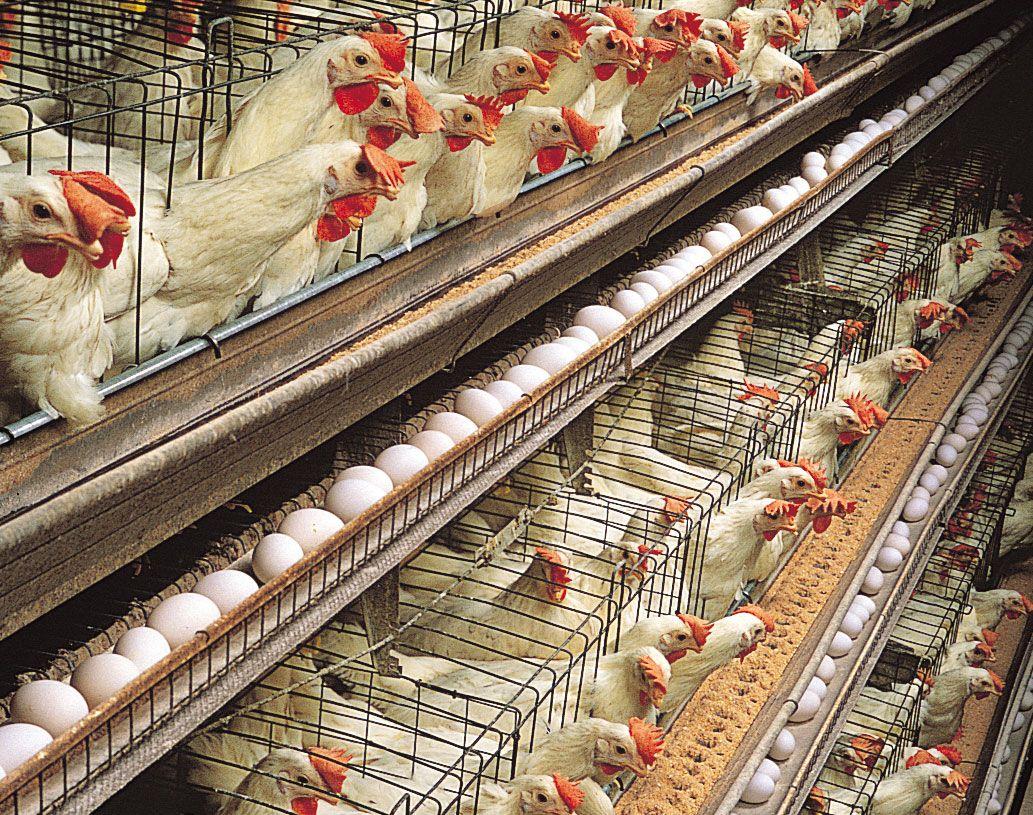
So, what is poultry farming? Poultry farming simply refers to raising chickens, ducks, turkeys, and other domesticated birds for the purpose of producing eggs, meat, or both. In Nigeria, poultry farming has become very popular and profitable. Many people are venturing into it as a way to earn an income and provide jobs. Many farmers are earning ₦500,000 per month or more from selling eggs and broilers.
So if you’re looking for a new business opportunity, poultry farming in Nigeria could be ideal. With hard work and the right skills, you’ll be well on your way to building a successful poultry farm.
Poultry Production Methods in Nigeria
Intensive and extensive are the two main methods of poultry production in Nigeria.
Intensive poultry production means keeping large numbers of birds together in a confined area. This method requires close monitoring and control. You’ll need to provide proper housing, ventilation, temperature control, and high-quality feed. While intensive production requires less capital and management, it leads to lower quality eggs and meat due to the stressful living condition but higher profits.
Different types of intensive poultry farm systems include;
- Cage system or Battery system
- Slatted or Wired-floor system
- Deep litter system
- Combination of the slatted floor and deep litter system
Extensive poultry production means allowing birds to roam freely during the day with minimal confinement. This high-cost method is good for rural farmers. You’ll need plenty of land, simple housing for protection, and workers to herd the birds. The quality of eggs is higher but has lesser profits due to the high cost of production.
What is the Cost of Starting a Poultry farming business in Nigeria?
With less than N150,000, you may establish a small-scale Poultry farming business in Nigeria. Medium to large-scale farms require a lot more money, but establishing a small poultry business is recommended even if you have plenty of money to spare.
When starting a profitable poultry farming business in Nigeria, proper planning is crucial for success. It sets the foundation for a well-organized and efficient operation. By carefully considering all aspects of your poultry farm, you can maximize productivity and profitability.
Learn about Poultry Farming
To get into poultry farming in Nigeria, you need to understand what it entails. Some key things to know:
- Learn about the different types of poultry.
- Know how to properly house and feed them.
- You’ll need to construct a poultry house and equip it with feeders, drinkers, perches, nests, etc.
- Understand poultry diseases and treatment.
- Learn how to incubate eggs and hatch chicks.
- Find out how to market your products.
Continuously improve your knowledge. Take courses on poultry farming, follow expert advice, and stay up-to-date with advancements in techniques, medications, and technologies to maximize productivity.
Poultry farming can be very rewarding, but you must be fully prepared for the demands of managing a successful operation. Do your research and get the necessary training to understand what the business entails before jumping in.
Conduct a Market Research
When starting a profitable poultry farming business in Nigeria, it is crucial to conduct thorough market research. Understanding the demand and competition in the poultry industry will give you a competitive edge and increase your chances of success.
Market research allows you to identify your target audience, their preferences, and their purchasing power. This information will help you tailor your poultry products to meet their specific needs, ensuring customer satisfaction and repeat business.
Additionally, market research enables you to analyze existing poultry farms in your area and assess their strengths and weaknesses. By identifying gaps in the market, you can position your poultry farm as unique and offer products that stand out from the competition.
Develop a Business Plan
A well-crafted business plan is the foundation of a profitable poultry farming business. It serves as a roadmap, guiding you through the various stages of establishing and running your farm. Start by outlining your goals and objectives, then determine the scale of your operation. Consider the initial investment required, including the cost of land, infrastructure, equipment, and livestock.
Next, create a detailed financial plan that includes projected expenses and revenue. This will help you estimate your breakeven point and set realistic pricing for your poultry products. Additionally, you can explore potential sources of funding, such as loans or grants to support your venture.
Choose Your Poultry Sector/Niche
There are four main types of poultry farming you can consider in Nigeria:
Layer breeding focuses on egg production. Layers start laying eggs between 18 to 22 weeks of age and can continue for 12-18 months. Popular breeds are Isa Brown, Bovans, and Dominant.
Broiler breeding focuses on meat (chicken) production. Broilers have a fast growth rate and are ready for harvest in about 8 weeks. Popular breeds are Arbor Acres, Ross, Cobb, and Hubbard.
Egg and meat processing involves collecting, grading, packaging, and distributing eggs and chicken meat to markets, retailers and consumers. This requires proper handling, storage, and transportation facilities.
Hatchery operation focuses on breeding and hatching layers and broiler chicks to supply poultry farms. It requires incubators, hatchers, chick boxes, and vaccination equipment. Popular breeds for hatching are mentioned above.
Within these types, you can specialize in free-range organic poultry farming or concentrate on a particular product like eggs, broiler meat, or day-old chicks. Choose an area you have experience in or are passionate about to start your profitable poultry business in Nigeria.
Choose the Right Breed of Poultry Bird for Your Farm
When starting a profitable poultry farming business in Nigeria, it is important to choose the right breed of poultry bird for your farm. Aside from chickens, which are the most common poultry bird that people invest in, and the most consumed bird in Nigeria, there are several other types of poultry birds you can grow.
Here are six distinct varieties of poultry birds that you can invest in as a farmer:
- Ducks (for eggs, meat, and down feathers)
- Turkeys (mainly for meat)
- Geese (for eggs, meat, and down feathers)
- Guinea Fowl (for eggs and meat)
- Quail (for eggs and meat)
- Pigeon (mainly for meat)
After you’ve decided on the type of bird you wish to raise, the next step is to identify the many varieties of birds available and select the most profitable breed(s) for your farm. If you decide to start raising chickens, you can opt to grow only broilers, layers, cockerels, or a mix of all breeds.
Remember, conducting thorough research and understanding the specific needs and characteristics of each breed will help you make an informed decision for your poultry farm.
When selecting a poultry breed for your farm, consider factors such as climate, production purpose, growth rate, disease resistance, and market demand. By choosing the right breed, you can maximize your farm’s profitability and ensure the success of your poultry farming business in Nigeria.
Select a Suitable Location for Your Poultry Farm
Choosing a suitable location for your poultry farm is critical to its success and profitability. Some key factors to consider:
Access to resources
Select a spot with easy access to feed, medication, equipment and other supplies. Being close to the main roads and suppliers will reduce costs and time.

Water supply
An abundant, clean water source is essential. Lack of water will severely limit your production. Boreholes, wells or municipal water connections are good options.
The area should have a warm and humid climate ideal for poultry production. Extreme heat or cold requires additional costs for cooling, heating and ventilation.
The soil should be able to support the weight of buildings and equipment. Sandy-loam soil with good drainage is best. Avoid swampy, rocky or steep areas.
Choose a location away from residential areas to avoid noise and odor nuisance to neighbors, which could lead to issues down the road.
Select an area that is secure from theft, predators and harsh weather events. Fencing, lighting and possibly security guards may be required.
Growth potential
Pick a spot that allows for business expansion as your farm grows. Extra space for more chicken houses, egg sorting or processing facilities, staff housing, etc.
Availability of utilities
Ensure there are utility connections for electricity, water and possibly natural gas on site or nearby for powering equipment, lighting, heating, etc.
Choosing a strategic location by evaluating these key factors will set your poultry business up for success from the start. Do your research, plan well and choose wisely!
Housing and Equipment: Providing Proper Shelter and Supplies for Your Birds
When starting your poultry farm, providing proper housing and equipment for your birds is essential.
You’ll want to consider several options for sheltering your flock:
- Cages: Wire or slatted floor cages are common for egg-laying hens or broiler chickens. Cages allow droppings to fall through, keeping birds clean.
- Battery cages: Similar to cages but stacked in columns and rows. Allows for a large number of birds in a small space but can limit movement.
- Floor pens: Open pens with litter (wood shavings, rice hulls) allow birds to move freely. More space is required, and droppings must be removed regularly.
- Free range: Birds have access to outdoor pens and coops. More natural but requires more space and may lead to loss from predators.
In addition to shelter, you’ll need equipment like:
- Feeders and waterers: To provide food and hydration for your flock.
- Nesting boxes: For egg-laying hens.
- Incubators and brooders: To hatch and raise chicks.
- Egg trays: For collecting and transporting eggs.
- Catching nets: To capture birds when needed.
- Crates: For transporting or isolating birds.
- Perches: For egg-laying hens to roost on.
- Fencing: To enclose outdoor areas.
Having the proper housing, feeders, waterers, incubators, and other essential equipment will help ensure your poultry business is profitable and sustainable in the long run. Providing good living conditions and quality care for your birds will lead to healthier, more productive flocks.
Feeding and Medications of Your Poultry Birds: Nutrition Requirements and Best Practices
The nutritional needs of your poultry birds depend on factors like age, breed, environment, and purpose (meat or egg production). Generally, poultry feed contains grains like corn and soybeans, along with added vitamins and minerals. For chicks, provide chick starter feed which has extra protein to support growth. After 6-8 weeks, switch to chick grower feed. For egg-laying hens, use layer feed with lots of calcium.
Provide clean, fresh feed and water daily. Place feeders at beak height and check that all birds can access them. Offer oyster shells, grit, and fresh greens for extra nutrition. Monitor your birds closely for signs of malnutrition, like feather plucking or bone weakness.
Medicating your flock may be necessary to prevent disease or treat infections. Work with an avian vet to develop a schedule for deworming, vaccinating, and administering medications. Only give medication specifically prescribed for poultry to avoid toxicity. Isolate and closely monitor any sick birds to provide prompt treatment.
Following recommended best practices for feeding, housing, and medicating your poultry flock will keep them healthy, productive and generate the highest profits. Paying close attention to the specific needs of your birds at every stage of growth and production is key.
Market Your Poultry and Products for Maximum Profit
Marketing your poultry and products is key to running a profitable business. You need to get the word out about your farm and products to build a customer base.
Advertise on local radio stations, in newspapers, and on community Facebook groups and websites. Explain you sell fresh, locally-raised chicken and eggs. Offer promotions and discounts to attract new customers.
Build a Website
Create a simple website to tell people about your farm, products, and mission. Share photos of your happy chickens and farm. Allow customers to order online for pickup or delivery.
Farmers Markets
Sell at local farmers’ markets and allow people to see and experience your high-quality products. Offer free samples and recipes. Engage with customers to build loyalty.
Restaurants
Approach local restaurants about supplying them with fresh chicken and eggs. Chefs and diners will appreciate locally-sourced, farm-fresh ingredients. Build strong relationships with restaurants and offer discounts for bulk orders.
Social Media
Start social media profiles for your farm on Facebook, Instagram, Tiktok, Thread and Twitter. Post regularly about daily life on the farm, new products, promotions, recipes, and more. Engage with followers and build an online community. Social media is an easy, low-cost way to raise brand awareness and connect with customers.
Following these steps to actively market your poultry farm and products will set you up for success and maximum profitability. Get out there and spread the word about your amazing, farm-fresh chicken and eggs!
Good Husbandry Poultry Practices for Poultry Farmers in Nigeria
To ensure healthy, productive poultry, there are several good husbandry practices Nigerian poultry farmers should follow:
- Provide clean, spacious housing. Coops should be thoroughly cleaned and disinfected regularly to minimize disease. Allow at least 2 to 3 square feet of space per bird.
- Supply fresh, nutritious feed. Offer pelleted feed formulated for your birds’ age and species. Also, provide clean, fresh water daily.
- Maintain a regular lighting schedule. Most poultry require 12-16 hours of light per day to remain productive. Use timers to keep the schedule consistent.
- Check birds daily. Closely monitor your flock for signs of illness or injury. Address any issues quickly to keep the flock healthy.
- Control pests and predators. Use wire mesh or netting to keep out wild birds, rodents, and other threats. Practice good sanitation to limit infestations.
- Keep accurate records. Note details like egg production, mortality, feed intake, and medical treatments. Records help identify problems and maximize productivity.
- Provide nesting boxes. For egg layers, place one nest box for every four hens. Nest boxes encourage hens to lay eggs in a confined area.
- Collect eggs frequently. Gather eggs at least once per day to keep them clean and prevent hens from eating them.
- Practice biosecurity. Limit visitors and thoroughly clean equipment, shoes, and clothes when entering or leaving the coop to prevent disease transmission.
- Vaccinate and deworm regularly. Follow a schedule recommended by a vet to protect the flock.
Challenges Associated with Poultry Farming in Nigeria with their solutions
Poultry farming in Nigeria faces several significant challenges, such as:
High cost of feed
A commercial feed can make up 60-70% of total costs. Look for cheaper alternative feed sources and join cooperatives to buy in bulk. You can as well consider formulating your own feed using locally available ingredients or exploring alternative feed sources. Additionally, proper storage and handling of feed can prevent wastage and ensure its quality.
Avian influenza, Newcastle disease, and fowl pox can spread rapidly and kill entire flocks. Practice good biosecurity; it is crucial to stay informed about the latest disease trends and take proactive measures. Regular vaccination and deworming, alongside proper quarantine procedures for new birds, can significantly reduce the risk of disease transmission.
Lack of funding
Many small farms struggle to access loans and grants. Develop a solid business plan and build relationships with microfinance institutions. Farmers should actively seek partnerships with microfinance institutions that specialize in agricultural financing. Building relationships with these institutions can increase the chances of securing loans and grants to expand your operations.
Inadequate knowledge
Many farmers lack training in proper housing, feeding, and healthcare. To overcome the lack of knowledge in poultry farming practices, it is important for farmers to prioritize continuous learning. Seek out training programs and workshops that provide insights into efficient housing, feeding, and healthcare practices. Embracing new technologies and staying updated with industry advancements can further improve productivity and profitability.
Protecting your flock from predators is crucial for maintaining a healthy and productive poultry farm. Implement measures such as installing sturdy fencing, using netting to cover open areas, and constructing protective shelters. Regularly inspect your farm for potential entry points and promptly address any vulnerabilities.
Lack of infrastructure
Inconsistent power supply and poor road conditions hinder business growth. Invest in alternative energy sources and coordinate with local government on infrastructure improvements.
By addressing each challenge proactively and persistently, poultry farming in Nigeria can become more sustainable and profitable. With improved practices, funding, and policy changes, the industry has the potential for huge growth.
Commercial poultry farming in Nigeria has produced and continues to create a profitable business opportunity for entrepreneurs as well as a good source of employment for job seekers. The majority of entrepreneurs prefer to raise day-old chicks and sell them to farmers since it is easier and less hazardous.
To ensure the profitability and sustainability of your poultry farm in Nigeria, you need to follow the steps stated above and learn more from professionals in the industry.
Discussion about this post
Recent articles.

Building Friendships: Creating Meaningful Relationships Through Shared Interests

How To Overcome Your Fear Of Social Media

How to Hire for Your Business: The First 8 People You Should Hire

What Is A Freemium Business Model?

Business Administration Jobs and Salaries in Nigeria (2024)
Within nigeria media ltd..
NEWS, MULTI MEDIA
WITHIN NIGERIA is an online news media that focuses on authoritative reports, investigations and major headlines that springs from National issues, Politics, Metro, Entertainment; and Articles.
CORPORATE LINKS
- Report a story
- Advertisement
- Content Policy
- Private Policy
- Fact-Checking Policy
- Ethics Policy
- Corrections Policy
© 2022 WITHIN NIGERIA MEDIA LTD. designed by WebAndName
Welcome Back!
Login to your account below
Remember Me
Retrieve your password
Please enter your username or email address to reset your password.
- Domain Names
- cPanel Web Hosting
- WordPress Hosting
- Windows Hosting
- SSL Certificates in Nigeria
- Online Store Builder
- Business Email Hosting
- Website Builder
- VPS Hosting
- Support Portal
- Affiliate Programme in Nigeria
- Web Hosting Select the perfect package for your business
- Reseller Hosting
- Windows Hosting Reliable Windows Web Hosting
- Server Addons Additional software for your servers
- Cloud Servers Fastest Cloud Servers - LiteSpeed Servers
- Dedicated Servers The best dedicated servers for your business applications
- Business Email Professional Email Service & Team Collaboration
- Europe Windows Servers
- Single Domain SSL Secures 1 domain only.
- Wildcard SSL Best and Cheap Wildcard SSL Certificates
- Multi Domain SSL Cover Multiple Domains with 1 SSL
- Online Shop Online Shop
- Website builder Beautiful templates for your website
- Domain Addons Addons for Domains
- Domain Search Find the perfect domain name.
- Bulk Domain Search How many are you look for?
- Domain Transfer Want to transfer domain to us?
- Whois Lookup Check who owns a a domain name.
- Register Login
Visiting from Russia?
Poultry business plan in nigeria: how to write one.

Thinking about starting a poultry business in Nigeria?
You’re on the right track! Let’s talk about the great opportunities and the money-making potential that poultry farming holds for you in our country.
Page Contents
Poultry Farming Opportunities in Nigeria
Nigeria is buzzing with opportunities for poultry farming. This means you have a chance to turn your love for chickens into a successful business. People in Nigeria really like chicken, and that’s good news for your potential poultry venture.
Profitability Potential
Now, let’s get down to the exciting part – making money. Poultry farming has the potential to bring in some good cash. Whether you’re thinking about raising chickens for meat or eggs, there’s a market waiting for you. The demand for poultry products is high, and that means you have a chance to make a profit.
Why You Need a Solid Business Plan
Starting a poultry business isn’t just about having a bunch of chickens. You need a plan. Think of it like having a map before going on a journey. A solid business plan helps you know where you’re going, how to get there, and what to do when you arrive. It’s like your business GPS!
Purpose of a Business Plan
Before you dive into poultry farming, having a business plan is super important. It’s like having a roadmap for your success. A business plan helps you figure out your goals, how much money you need, and how to make your poultry business thrive. It’s like having a blueprint for building a strong and successful business.
So, if you’re dreaming of running a successful poultry business in Nigeria, buckle up! We’re here to guide you through the poultry business plan.Get ready to turn your poultry dreams into reality!
Poultry Products & Offerings
In the following sections, we’ll explore the various products and offerings you can focus on to make your poultry business successful.
a). Broiler Production for Meat
- Raising broilers means growing chickens for their tasty meat.
- These chickens are specially bred for their delicious and tender meat.
- Broiler production can be a great choice for your poultry business as there is a high demand for chicken meat.
b). Egg Production for Consumption
- Another feather in your business cap can be egg production.
- Hens lay eggs, and you can sell these eggs for people to eat.
- Egg production is a steady and reliable part of many poultry businesses.
c). Value-Added Products like Packaged Chicken, Quail Eggs, etc.
- You can take your poultry business to the next level by creating value-added products.
- Consider packaging chicken meat for convenience.
- Quail eggs are a unique offering that can attract customers looking for something different.
- Adding value to your products can set your business apart and attract more customers.
Why Consider These Offerings
1. diverse income streams.
By offering different products like meat and eggs, you create multiple ways for your business to make money.
Diverse income streams can help your business stay strong and grow over time.
2. Meeting Market Demand
Broiler production meets the high demand for chicken meat in Nigeria.
Egg production is a constant need as people use eggs in their daily meals.
Offering what people want ensures your business stays in demand.
3. Standing Out with Value-Added Products
Packaging chicken meat and selling quail eggs can make your business stand out.
People appreciate convenience, and unique products can attract new customers.
Standing out in the market helps your business thrive.
In your poultry business journey, considering broiler production, egg production, and value-added products is a wise move. These offerings not only cater to market demands but also provide you with various income streams. Remember, adding value to your products can set your business apart and make it a feathery success in the poultry industry. Good luck on your entrepreneurial journey!
Read also: 5 Online Businesses That Pay Daily in Nigeria (Free Registration)
Operational Plan
The operational plan helps you understand the steps you need to take to make your poultry venture a success.
1. Poultry Breeds Selection
Choosing the right chickens is a crucial part of your poultry business. Think about it like picking players for a soccer team – you want the ones that can play well and stay healthy. In Nigeria, common breeds include layers and broilers. Layers are good for eggs, while broilers grow big and are good for meat. Consider your goals and pick the breed that fits your plan.
2. Housing Types & Equipment Requirements
Just like we need a comfy place to live, chickens need a safe and cozy home too. Think about the type of house your chickens will live in. There are different housing options, from simple pens to more advanced structures. Make sure it keeps them safe from rain and sun. Don’t forget about equipment like feeders and waterers – these are like the tools that make life easier for your chickens and you.
3. Feed Supply and Storage
Chickens need good food to stay healthy and lay eggs or grow into big, tasty broilers. Plan where you’ll get their food and how you’ll store it. Imagine it’s like planning your meals for the week – you want to make sure you have enough and keep it in a safe place. Consider talking to local feed suppliers and check prices to get the best deal for your feathery friends.
4. Security Measures Against Theft
Just like we lock our doors at night, you need to keep your chickens safe from thieves. Think about the security measures for your poultry farm. Fencing and proper lighting can help keep unwanted visitors away. Remember, a secure farm means happy and healthy chickens.
Production Planning
When it comes to production planning, there are a few key aspects you need to consider.
Stocking Density and Production Scheduling
To make your poultry business thrive, think about how many chickens you want on your farm. This is called stocking density. It’s like figuring out how many friends you can comfortably invite to your party. Plan your farm space well, so your chickens have enough room to move around and stay healthy.
Decide on a schedule for when your chickens will be growing and laying eggs. It’s like planning a calendar for different activities. This way, you can make sure your chickens are happy and productive all year round.
Projected Yields Targets Over Years
Setting goals is important for any business. For your poultry farm, think about how many eggs or chickens you want to produce each year. It’s like deciding how many points you want to score in a game. This helps you stay focused and work towards success.

Start small and gradually increase your targets as your experience grows. It’s like learning to ride a bike – start with training wheels and take it step by step.
Planning for Mortality Rates
In the world of poultry farming, it’s important to understand that not all chickens may make it to the finish line. Plan for some chickens not making it, known as mortality rates. It’s like being prepared for rainy days. This way, you won’t be caught off guard, and you can still reach your goals even if some challenges come your way.
Market Analysis
When it comes to running a poultry business, understanding the market is key. Let’s break down the market analysis into three important parts:
1. Consumer Demand and Preferences
Firstly, think about what people in your area like. Do they prefer fresh eggs, chicken meat, or both? Understanding what your customers want helps you plan what to offer.
Consider talking to people in your community or doing a small survey to know their preferences. If you know what your potential customers like, you can make sure your poultry business meets their needs.
2. Pricing Considerations and Sales Channels
Next, let’s talk about how much to charge for your poultry products. Look around your area and check the prices of similar products. This can give you an idea of what customers are willing to pay.
Also, think about where you’ll sell your poultry products. Are there local hotels, restaurants, or markets where people often buy these items? Choosing the right sales channels can make a big difference in reaching your customers.
3. Competitor Assessment
Lastly, it’s important to know who else is selling poultry products in your area. Check out other poultry businesses and see what they are offering. This can help you find ways to stand out and offer something unique.
Think about what you can do differently or better than your competitors. Maybe you can provide fresher eggs or have a special deal that attracts customers.
Financial Plan
Financial planning is all about determining how much money you’ll need and where it will go. Some of the areas to plan your finances around are:
Costs of Land, Construction, and Equipment
First things first, you need a place for your poultry adventure. Think about how much the land will cost, the buildings you’ll need, and the equipment to run the show. Imagine it as setting up your farm base – the place where all the chicken action will happen.
Labor Costs Projections
Now, let’s talk about the people who will help you on your farm journey. Consider how much you’ll pay your workers. It’s like figuring out the team’s salaries and making sure they have everything they need to keep things running smoothly.
Projected Revenue and Profitability Year-Wise
Okay, so you’ve got your farm, your team, and the chickens are ready to roll. But, how much money will you make? Picture it as a game plan for each year – how many eggs or chickens will you sell, and how much money will you bring in? It’s like having a roadmap for your success.
Funding Requirements – Own Equity vs. Loans
Here comes the big question – where will the money come from? Consider how much of your own money you can invest (that’s your equity) and if you’ll need a loan from the bank. It’s like making sure you have enough cash to start things off or if you need a little help from your friendly neighborhood bank.
Risks & Mitigations
Starting your poultry business in Nigeria can be exciting, but it’s important to know about possible challenges. Here are two big ones and how you can handle them:
1. Disease Outbreaks
Keeping your chickens healthy is crucial. Diseases can sometimes spread among them, which might affect your production. To stay safe, work closely with a vet. Regular check-ups and vaccinations can prevent many illnesses. Also, keep your farm clean – a tidy space helps keep diseases away.
2. Seasonal Impacts on Production
The weather can have an impact on your poultry business. Some seasons might make it harder for your chickens to thrive. Plan ahead by checking the weather forecasts. If you know a tough season is coming, make sure your chickens have proper shelter and enough food. Being prepared helps you handle the ups and downs of different seasons.
3. Price Fluctuations and Regulatory Changes
Prices for things like chicken feed can change, and rules about running a poultry business might too. To handle this, keep an eye on the market. Know when prices might go up or down, and plan your budget accordingly. Stay updated on any new rules that might affect your business. Adapting to changes will help you keep your poultry farm running smoothly.
Read also: Is Thrift Business Profitable in Nigeria? What To Know
Implementation Roadmap
Starting a poultry business involves some important steps. Here’s a simple breakdown to guide you:
1. Securing Land
First things first, you’ll need a piece of land to set up your poultry farm. Look for a location that’s safe, easily accessible, and has enough space for your chickens to roam around.
2. Constructing Sheds and Facilities
Once you have the land, it’s time to build the homes for your chickens. Construct sturdy sheds where they can stay comfortably. Make sure to include spaces for feeding and watering them. Safety is key!
3. Acquiring License
To run a poultry business, you need permission from the authorities. Getting a license is like having a special pass to do your business legally. It’s important to follow the rules to avoid any issues later on.
4. Timelines
Creating a timeline helps you plan when each step will happen. For example, set a goal for when you’ll secure the land, another for when the sheds will be ready, and so on. This keeps things organized.
5. Staff Hiring Schedule
As your poultry business grows, you might need some helping hands. Plan when you’ll hire staff and tie it to your production expansion. More chickens mean more work, and having a schedule helps everyone know what to expect.
Read also: Is Facebook Marketplace Available in Nigeria? Yes! Here’s How To Use It RIGHT
Starting a poultry business in Nigeria is exciting, and with a well-thought-out plan, you’re on your way to success. Remember, step by step, you can make your poultry dreams a reality. Good luck on your entrepreneurial journey!

Leave a comment
Cancel reply.
Your email address will not be published. Required fields are marked *
Save my name, email, and website in this browser for the next time I comment.
By using this form you agree with the storage and handling of your data by this website. *
- Tue. Apr 23rd, 2024
NG Business
NGBusiness Gives You Access To Over 100 Business Plan Samples As Well As Other Important Business Related Information...
Poultry Farm Business Plan in Nigeria (2024 DOC)
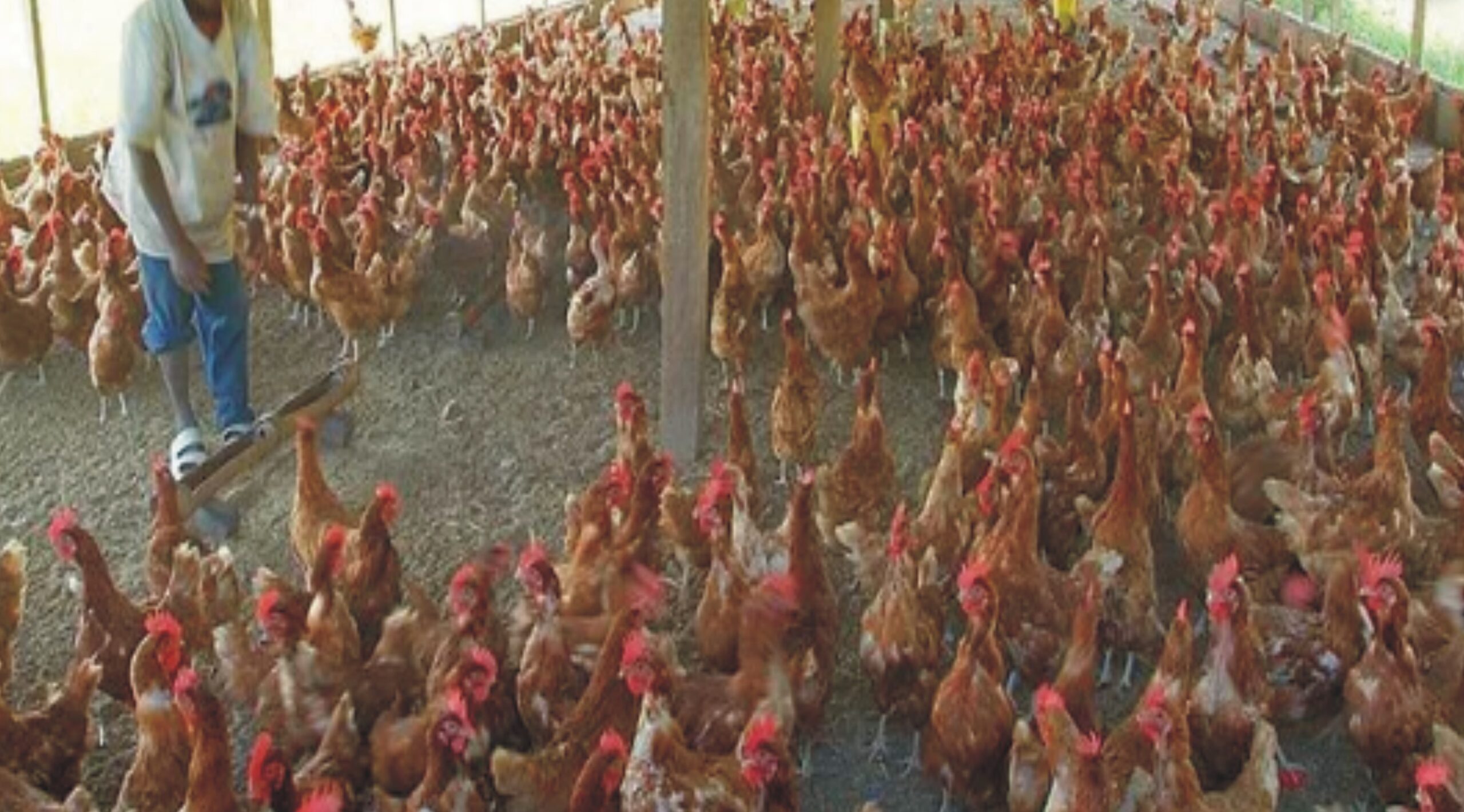
Poultry Farm Business Plan in Nigeria 2024 Sample
The Poultry or Chicken Farming Business Plan comes as a Feasibility Study In Nigeria or birds arming, the business plan undergoes a regular up from time to time, this is done to correspond with the prevailing economic condition of the country.
CHAT WITH US ON WHATSAPP FOR YOUR
Business plans and feasibility studies to get a discount.
The Poultry Farm Business Plan In Nigeria Feasibility study comes in form of an e-book, could be converted to word document based on demand and it offers the following content;
Poultry Farm Business Plan In Nigeria Table Of Content
Chapter One – Executive summary of the business plan on poultry farming pdf
- The business Opportunity
- The market Target
- The competition
- The competitive Strategies
- The management Team
- The financial Plan, It comes in an excel spreadsheet
PURPOSE OF THE BUSINESS PLAN
A typical proposal for raising a poultry farm in Nigeria should at least come with the purpose of starting the business and then followed by other important information.
Poultry Farm Business Plan In Nigeria Market Analysis
- Poultry farm market analysis
Poultry Farm Business Plan SWOT Analysis
- Opportunities
STRATEGIC INTENT
VALUES AND PRINCIPLES
- Project Strategies
- Financial Strategies
- Marketing Strategies
- Operational Strategies
- Human Resources Strategies
IMPLEMENTATION PLAN
- Organization Structure
- Manpower Requirements
- Manpower Plan
- Man Power Budget
- Roles And Responsibilities
Poultry Farm Business Plan In Nigeria Technical And Operational Plan
- Raw Material Requirements
- Machinery And Equipment Requirements
- Layout Of The Business Premises
- Growth Management And Quality Assurance
- Disease Control And Prevention
- Egg Production Process
MARKETING PLAN
- Location Of The Project
KEY FINANCIAL MANAGEMENT CONTROLS
- Bookkeeping And Financial Administration Requirements
- Importance Of Bookkeeping And Financial Administration
- Computerized Bookkeeping And Finance System
Poultry Farm Business Plan In Nigeria Projected financial Statement
- Assumptions
- Application Of Funds
- Operating And Maintenance Costs
- Daily EEG and Feed, Drugs Computation Analysis From Point Of Lay (POL) For 12 Months period
- Income Statement Projections
- Projected Profit And Loss For 4,000 Birds In 52 Weeks
- Market Information
- Mortality Losses
- Profit projection For 4,000 Laying Birds
- Profit Projection for 10,000 Broilers
Additional Content
- Poultry farming egg Production Management
- Broiler Management Guide
- Broiler Starter formula
- Broiler Grower formula
- Pullet grower formula
- Laying Bird feed formula
- Layout Concentration Formula
- Broiler Concentration formula
To get the full business plan on Poultry Farming Business Plan in Nigeria + Feasibility Studies PDF, pay N10,000 to GTBank (Guaranty Trust Bank)
Account Name – Okite Joseph ikenna
Account No – 0044083736
Once payment is made for the Poultry Farming Business Plan in Nigeria + Feasibility Studies PDF, send the following (i) a valid email address and (ii) your payment details to any of these numbers – 07039768549.
What You Can Use Your Poultry Farm Business Plan in Nigeria ;
Obviously, the Poultry Farming Business Plan in Nigeria was written not only or the execution of a business, but it also has other purposes for which it was written, the poultry farming business plan in Nigeria comes as a well researched feasibility study with well detailed information on how to start up a poultry farming business and how to successfully run the business. This is a business plan for poultry production & marketing in Nigeria and it comes in a PDF format, every entrepreneur deserves to have this document for various purpose apart from just starting up a business, especially when it concerns sourcing of fund in order to either commence or to increase investment portfolio, below are the things you can use your poultry/chicken farming business plan or sample poultry business plan PDF;
BANK LOANS – Accessing a bank assistance in form of loan can be achieved using a well written business plan or feasibility study by a professional, most of these financial institutions , especially banks can be convinced that their money will be safe with you, the will have to trust you if you provide a template on how you intend making use of the loan facility issued to you. Banks are most times interested in the fact that the loan being issued will be recovered; your business plan for poultry farm will help out big time.
GRANTS – Your chicken farm business plan pdf file gives you an edge while applying for grants from different organization, especially government agencies. The possibilities of having these agencies listening to your apply application lies with the quality of your application, and this comes from the sample of the poultry business plan pdf file you will be submitting. This makes it a lot more easier and accessible, especially if done with a doc that will convince those issuing the grants.
PROPOSAL – Quality proposal goes a long way in your business proposal application. One of the factors that will make your proposal to be considered in any way is the information contained in the document. After getting our poultry farming business plan manual, applying for a proposal will become as good as complete, just as applying for loans and grant has become easy given the well detailed information contained in the business plan document.
Seminar presentation – You deserve a document that offers the best information required, so that in your presentation, you will not be caught reeling out un-found data and information. The things is that this business plan to forms the basis of your seminar presentation as well as research, however, you can as well get more information in order to compare information contained in your research work.
COMPETITIONS – Going for competition with this business plan can earn you your competition rewards, sometimes these rewards comes inform o cash prize or scholarship, or the entrepreneurs this competition where your journey in business begins. The essence is to win an trust me, the information contained in this business plan can earn you that..
POULTRY FARM BUSINESS IN NIGERIA
Today’s Nigeria accommodates some of the biggest poultry farms in Africa, despite this fact, Nigeria is still one of the largest importers of chicken. Understandably, this is a country of over 180 million people hence the need for edible birds will always be on the high.
The high demands for poultry birds is not restricted to just the festive periods or seasons like Easter, Christmas, Sallah etc. In fact a visit to Chicken market in a town as small as Abakaliki will tell you that the demand or this birds are high, virtually every market in Enugu has a potion where live chicken are sold, and the number of people trooping in too buy will amaze you. The story is not different from other small and large cities, and these are families buying for their consumption. When you factor in the fast food restaurants , the Supermarkets the request for these for these live stock products, you will understand why the country still import these products despite the level o production.
In essence, demand has always been high than supply, and that is where the business opportunities comes in from. As an individual poultry farmer, your business stands a chance of supplying birds to families, eateries, Malls as well as big supermarkets. The truth is that the industry has become a money spinning machine and it is estimated to worth a multi billion Naira industry.
Set Backs In The Poultry farming Business
As live stocks, the poultry industry suffered huge set back, these set back resulted in the loss of some birds, the setbacks came inform o avian influenza, salmonellosis, although it was contained, it caused huge losses to some farms as demand for birds reduced, that’s is not the case anymore even though there is still the challenges of incessant power outage which also affect other businesses not just the poultry business.
Factors Responsible for The Growth O Poultry Business In Nigeria
Despite the setback and other challenges, the industry has continued to progress, meanwhile, there are factors that have contributed to the remarkable development of the poultry industry in Nigeria, these factor has continued to control how the business is done, these factors includes the following;
- The demands for eggs, poultry meat which is the primary reason or raising a poultry farm.
- The relatively profitability of the Poultry enterprise if brought into comparison with other agriculture enterprises.
- The roles as well as the contribution of the Poultry association of Nigerian, this is the umbrella body that cover all the poultry farmers in Nigerian.
To get the full business plan on Poultry Farming Business Plan in Nigeria + Feasibility Studies PDF, pay N10,000 Into GTBank (Guaranty Trust Bank)
Once payment is made for the Poultry Farm Business Plan in Nigeria + Feasibility Studies PDF, send the following (i) a valid email address and (ii) your payment details to any of these numbers – 07039768549.
Hindrances To The Growth Of Poultry farm Business In Nigeria
Without a doubt, in as much as the industry is experiencing growth and profitability, there are factors that has caused hindrances to the Poultry Business; see below;
- High cost of inputs
- Power outages
- Seasonal diseases (periodic)
- Low purchasing power etc.
Factor To Consider Before Setting Up A Poultry Farming Business
Ensure you have the following in place before setting up your poultry farming business in Nigeria;
Overview – Write a comprehensive overview of the business you want to start up, outlining every other required information needed. You should also chose a business for your Poultry Farm, other things to include are the services as well as the production of quality, then you should highlight the affordable of your poultry meat and egg. Also you should have a set of customers you get to targeting, demand for poultry farm products and services is almost the same everywhere in Nigeria.
The Company – The business should at least be structured. Who are the owners, how are you going to finance the start up, what is the name of the Poultry Farm business, will it be established as a limited liability company, who will be the owner, manager as well as investors. And then describe your products and services, this is a known secret, the likely Poultry Farm products, they poultry egg, chickens and poultry litter waste etc, now what are the services, you could chose to provide the services known as KCW and F, in plan terms Kill–‐Cut–‐Wrap–‐Freeze, most poultry farms offer these services these days. Place emphasis on the quality of your products and how hygienic your eggs and how they are of high quality. You business motto could be something like “We produce, process and package to meet Your standard”.
Capital And Start Up fund – You can’t successfully set up and run any business without at least having you capital in place, this is applicable to all kinds of business, some business minded individuals even resort to taking loans and advances, while other s hunt or grant, business proposal etc. The essence is to have fund to start up the business.
Location – When sitting a poultry farm, the location to be selected should at least be conducive to the birds, exposing the birds to extreme climatic conditions can affect their growth and development.
Equipment – You need to have the best equipment in order to survive the delicate nature of handing your chicks. Ensure that your live stock supply are healthy, and also ensure that the Hatcheries in charge o delivering a day old chicks to your farm are well scrutinized. Also engage a qualified doctor to always check and apply vaccinations or medication when needed.
Sourcing Of Heat – What the Poultry Farm Business Plan In Nigeria feasibility study teaches you is that there are sources of supplemental heat that can benefit your poultry farm, items such as the following will do the trick;
- Cooking stoves
- Lesser extent paraffin stoves
- Brooder stoves
You can place the stove on the roof or somewhere above ground level.
Feeding – With the Poultry Farm Business Plan/Feasibility Study In Nigeria, you can learn the feed technique known as forced feeding, chicks find it difficult to feed to feed themselves, hence the need to do that yourself, at least for the first four weeks.
Types Of feed for your Poultry Farm Business Plan In Nigeria
Broiler growth and efficiency are dependent on the type of feed you give to them, there are stipulated feeds you must offer to these birds, they as follows;
- Starter feed crumbs
- The Grower feeds
- Finisher feeds
While the Grower Feeds is given to the between 14 to 16 days after the completing the Starter, you can then start administering the Broiler Finisher feeds, this is the feed that the broiler consumes most.
Other factors To Consider Includes The following;
- Brooder Guards/Rings
- Preparing For Arrival Of Chicks
- Brooder Stove Arrangement And Temperature
- Keys to Successful Brooding And Rearing
To get the full Poultry Farming Business Plan in Nigeria + Feasibility Studies PDF, pay N10,000 to
GTBank (Guaranty Trust Bank)
Once payment is made for the Poultry Farm Business Plan in Nigeria + Feasibility Studies PDF, send the following (i) a valid email address and (ii) your payment details to any of these numbers – 07039768549 .
Other Business Plan
Fish Farming Business Plan In Nigeria
Solar Energy Installation Business Plan
Haulage & Trucking/Logistics Business Plan
Cooking Gas (LPG) Plant Business In Nigeria
Bread Bakery Business Plan in Nigeria
Cosmetics Business Plan in Nigeria
Fashion Design Business Plan In Nigeria
Pig Farming Business Plan In Nigeria
Note – Free Poultry Farming Business Plan In Nigeria PDF is not available on this platform!
Related Post
Cashew nuts production business plan (2024 doc), coconut chips processing business (2024 doc), hotel business plan in nigeria (2024 doc), 2 thoughts on “poultry farm business plan in nigeria (2024 doc)”.
I’m interested in the poultry farming business Plan,that cover breeding, brooder, rearing, and processing, also the market. But I’m calling the number is not going, let’s talk. 09074477666.
Send Us a message from the website using the whatsapp link – https://api.whatsapp.com/send?phone=2347062842119
Leave a Reply Cancel reply
Your email address will not be published. Required fields are marked *
Save my name, email, and website in this browser for the next time I comment.
Valuation Of Long Term Investments
Afdb $25m loan for nigerian smes approved, cbn agric loan – 2023/2024 application and registration, cbn loan – 2023/2024 eligibility and how to apply.

Press ESC to close
Or check our popular categories....
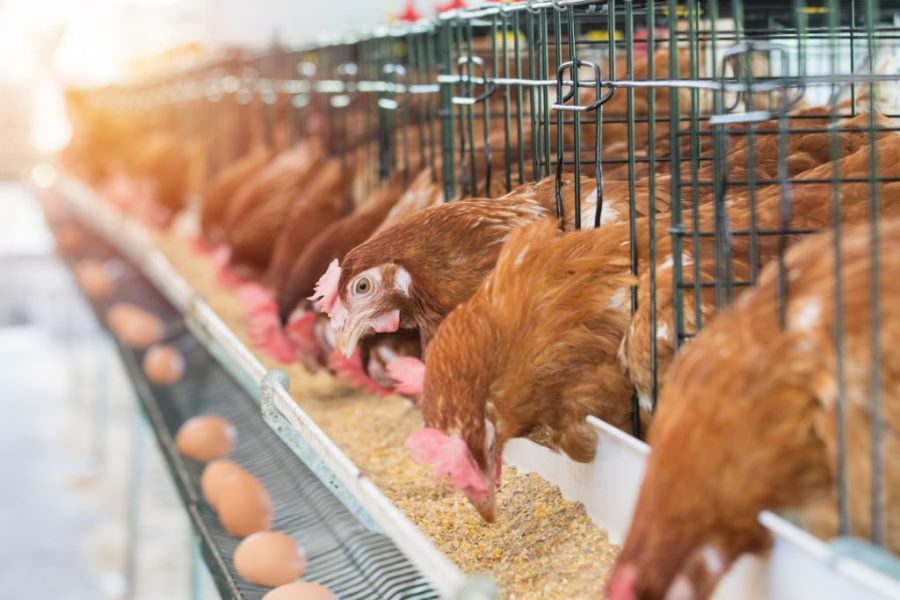
How To Start A Profitable Poultry Farming Business In Nigeria (2023)
Poultry farming can be defined as the process of raising various domestic birds like chicken, turkey, emu, ducks, geese, etc. for their eggs or meat. This has been a common practice in Nigeria for such a long time that it has become an indispensable part of the farming and agriculture system.
Poultry farming could be considered as one of the most lucrative agricultural business ideas in Nigeria today. It requires not huge capital to start as you can start from the comfort of your house if you have enough space to take the number of birds that you desire.
Poultry Farming In Nigeria
The demand for livestock products, including poultry, is fast expanding in Nigeria and across Africa as a result of population growth and increased urbanization. Poultry farming is one of the fastest growing segments in the Agricultural industry in Nigeria. According to ThisDay Newspaper , Nigeria’s poultry industry is worth over N1.2tn as of 2017.
From a market size perspective, Nigeria’s egg production is the largest in Africa followed by South Africa. Chicken importation (with the exception of day-old-chicks) was banned by Nigeria in 2003, which spurred growth in domestic poultry production. The Nigerian poultry sector is extremely fragmented with most of the chicken raised in ‘backyards’ or on poultry farms with less than 1,000 birds.
Amongst all kinds of poultry farming (chickens, turkeys, geese, and ducks), chicken is the most common one as farmers get a great number of chickens regularly either the egg for food or the farming meat. The high consumption of the end product; chicken and egg are in constant demand in the marketplace and even at various homes in Nigeria today and this makes poultry farming very lucrative as it seems to be a potent source of animal protein outside fish, pork and beef.
Also Read: How To Make Money Starting A Snail Farming Business In Nigeria .
5 Steps To Starting A Poultry Farm In Nigeria
Are you planning to start your own poultry farm? If so, then you should enter the business well prepared by considering all of its aspects. Right from setting up some basic equipment to raising the birds and marketing your business, you have to take every step wisely.
Poultry farming is of different types such as duck rearing, rearing chicken, quails, turkey, emu, broiler, etc. However, the principles and practices underlying are the same. Below are the five basic steps you need to follow to start a profitable snail farming business in Nigeria.
Step 1 – Choose The Type Of Poultry Bird To Rear
Before you kickstart your poultry farming business venture, it is important to have a clear picture of what type of poultry breeds to farm (most importantly, poultry breeds that lay a lot of eggs ). In Nigeria today, aside from locally grown chickens, there are two major breeds that are common among poultry farmers.
Broilers: Young males and Females raised for meat. They grow from a hatch weight of 40 g to a weight of approximately 1.5 to 2 kg within 6 weeks only.
Layers: Hens used for commercial egg production and then killed for meat. Layer chickens are raised from one day old. They start laying eggs at the age of 18-19 weeks and continue until they are 72-78 weeks of age.
Cockerels: Just like the broilers, cockerels are also for meat production and have a special market demand but then, its growth is very slow, unlike the broilers that grow very fast. Cockerels can survive in many environments.
Step 2 – Select A Suitable Farm Location/Site
Where your poultry farm is situated is very important for your business. To start poultry, you need a farm site. The size of the poultry farmland should be determined by the number of birds you want to rear. If you have enough land at your backyard and can’t afford to acquire a new site, its always better to start small. You can start with what you have but make it a priority to get a better farm as soon as you can afford it.
A good poultry farm site should be away from the chaos and hustle-bustle of the city. It should be calm and pollution free environment. The farm must have adequate, clean and fresh drinking water sources nearby. Also, the site must be free of poultry enemies and predators like foxes and leopards. The site must be easily accessible from main roads so as to ease the transportation of farm products when they are ready for sale.
Step 3 – Provide Good Housing And Shelter For The Birds
When it comes to poultry farming, housing is the next important factor after getting a farm site. A proper poultry housing is necessary for the protection and survival of your commercial poultry birds. The Housing system you choose totally depends on the poultry breeds and farming method. Housing design varies in accordance with various types of poultry raising methods.
The housing to be built should be spacious enough to permit free movement and running of the birds. shelters must be raised adequately to prevent the risk of flooding. It should be spacious enough to permit free movement and running of the birds. In addition, the shelter must be adequately ventilated and protected from sunlight.
Also Read: How To Start Your Own Real Estate Business In Nigeria .
Step 4 – Feeding and Medication OF The Poultry BIRDS
For commercial poultry production, good quality, highly nutritious food is a must. Quality and neat feeds keep the bird healthy always and very productive. The feed must be kept clean and dry always, as contaminated feed can infect poultry. Fresh quality and nutritious food is the key to success in poultry farming business. Your birds need not lack water. Lack of adequate water supply can impede their growth.
Proper medication and vaccination can prevent many poultry diseases. As a commercial poultry farmer, you need to have a veterinary doctor that can come run a check on your birds when the need arises. There are various routine medications and vaccinations that help towards the healthiness of your birds to keep them safe from viruses and bacterial infections, peradventure they catch an infectious disease.
Step 5 – Marketing and Sales of THE POULTRY Birds
Poultry farming is a profitable business and the desire of every poultry farmer is to make good sales after every harvest. So you need to pay attention to the marketing and sales aspect of your business . Do not be caught up in the operational aspect of your business so much that you ignore the sales aspect.
Nevertheless, the following ideas can help you in the marketing and sales of your chicken; taking your business online, selling to hotels and restaurants, advertising your products, employing marketers, home delivery, etc.
Cost of Starting A Poultry Farming Business
Many new businesses require a large capital outlay, which is not within reach of most business owners. A typical startup business also takes a long time to produce a return on your investment. By contrast, a small-scale poultry business has a relatively low start-up cost and rapid returns.
You can begin with as little as N50,000 (which basically to covers the cost of buying the day-old chicks and feeding them) and get a 100% return on your capital investment within six months. And because chicks take only 21 days to hatch, you can start generating an income just three weeks after starting. No other business can provide such a quick turnaround.
Commercial poultry farming in Nigeria has created and still creating a profitable business opportunity for Entrepreneurs and can provide a great employment source for job seekers. Most entrepreneurs prefer to produce day-old chicks and sell them to growers, as this option is easier and less risky. The choice, however, is up to you.
As a business owner, you need to get your business finances right from the onset and at the heart of these viable business opportunities in poultry farming are platforms, such as our online invoicing software that helps you keep proper track of your business revenues and expenses with ease.
Categorized in:
Share Article:
Related Articles
10 most lucrative business in nigeria in 2023, how to use threads by instagram: a step-by-step guide, small business insurance: what you need to know, business insights: navigating the forex landscape and mastering common trading strategies, cac registration: a guide on how to register a company online in nigeria , top 10 cheapest business ideas to start in nigeria (2023), other stories, 4 reasons to make content marketing your #1 marketing priority, small business kpis: how to set, track & nurture them properly.
Hire Bizvestor for business research & planning, content writing, digital advertising, or to create a similar website for you → Contact Us
Poultry Farm Business Plan Sample (With Financial Template)
Share this Post:
- Share on Facebook
- Share on Telegram
- Share on LinkedIn
- Share on WhatsApp
This is a sample business plan for a poultry farm based in Nigeria. The sample business name used is Nutrichic Farms.
The business operates a poultry farm that breeds broiler and layer chickens, and is located in Nasarawa state.
The business plan outline used is a simple business plan that follows a standard business summary template used by most business schools and is usable for applying for loans, grants, and equity funding.
You can use this business plan as a guide to develop a business plan for your poultry business.
Introduction
Nutrichic Farms is a poultry farm located in Nasarawa state, Nigeria. We rear broiler and layer chickens for eggs and meat production and sales.
Through our farm, we produce healthy chickens and eggs, which are distributed at local markets in Nasarawa and other neighboring states.
Business Analysis
Nutrichic Farms operates a lean model poultry farm that houses a chicken shelter and a feed production chamber.
We produce our chicken feeds in-house to reduce cost of breeding and to ensure healthy nutrition for our chickens.
This ensures that our layer chickens lay more eggs, and our broilers are ready for sale as quickly as possible.
To ensure a fast and efficient sales process for our eggs and chickens, we have a distributor network that consists of 20 egg distributors and 15 chicken distributors within Nasarawa.
This makes our sales process faster and remittance of payments more accountable.
We are looking to make our production and distribution even more efficient by procuring more feed production machines and distribution vans for transporting our products to the market.
Product Pricing
Our fresh eggs are sold at a wholesale price of 720 Naira per crate. Our mature broilers are sold at a wholesale price of 1,500 Naira, while our old layers are sold at a wholesale price of 1,300 Naira.
On the average, we sell 65 crates of eggs, and 80 chickens per week.
Business Model & Profitability
Business model.
Our business model focuses on producing healthy chickens and eggs, reducing production costs, utilizing competitive price points, and being fast to market by leveraging our distributor network.
Expected annual customers
Since we already operate a direct B2B sales model using our distributor network, our customer base is already set.
We have 20 egg distributors and 15 chicken distributors already. Once we increase our production capacity, we’ll be able to triple this number and grow our sales.
Estimated Annual Revenue
Currently, we are able to distribute 65 crates of eggs and 80 chickens per week, which brings us an annual revenue of 2.4 million Naira and 5.8 million Naira.
We estimate that our total annual revenue of 8.2 million can be tripled once we scale our production and make our distribution more efficient.
Production & Distribution Cost
Our production costs include procuring day-old chickens for 100 Naira each, raw materials for feed production, vaccination, and fuel to power the production plant, pump water, and power the chicken shelter.
Our distribution costs include weekly transportation, logistics and other miscellaneous expenses.
Profit Margin
Currently, our profit margin stands at 65% but we are looking to scale that up to 80% once we begin the next phase of our expansion plans.
Nutrichic Farms was launched by Solomon, who is currently the CEO of the business.
Solomon has a background in agric economics and farming, and has been managing his family farm since the past 20 years.
The current business has remained a family holding, with staff consisting mainly of family members.
Other team members include Mr. Hassan, the feed plant technician; Mr. Kehinde, the truck driver and distribution head, and Ms. Victoria, our quality control and business development manager.
Each person on this team brings a unique skill set that is required to drive the business forward and fulfill the needs of our customers.
Business Journey
Nutrichic Farms was launched in 2015 by Solomon due to his passion for poultry and farming.
The business was launched with a capital of 300,000 Naira, which purchased 50 birds, built a makeshift chicken shelter, and purchased some chicken feeds.
Over the past 5 years, Nutrichic Farms has grown so much that we have been able to build a larger and more standard chicken shelter, drilled a borehole, and started our own feed production.
Since then, we have sold over 30,000 chickens and 10,000 crates of eggs, making sales of over 10 million Naira.
In that time, we have also implemented our strategy for business development and grown our distributor network. We are hoping to grow this network further in the next phase of our business.
Market Analysis
Market size/target audience.
According to Sahelcp, the poultry market in Nigeria is worth 80 billion Naira.
We estimate that the poultry market in Nasarawa and its environs is worth 0.5% of the total poultry market in Nigeria.
Hence, our market size is estimated to be worth 400 million Naira.
With the population in Nasarawa growing impressively year-on-year, we estimate that our target customers comprise over 4,000 retailers of chickens and eggs, and over 1.5 million consumers of chicken and egg.
Marketing Plan
Our marketing plan involves incentivizing and leveraging our distributor network.
We want to help these distributors of chicken and egg get the right products promptly at the right prices and to make more profit.
We plan to grow our distributor network to at least 2,000 distributors in the next 2 years.
This would help us boost sales and collect better feedback on the needs of retailers and final consumers.
SWOT Analysis
Strengths: Our Strengths lie in our strategic distributor network, strong business efficiency, and growing brand.
Weaknesses: Our identified weak areas are limited markets due to physical nature of business, and Poor transport infrastructure which relies too much on external logistics partners.
Opportunity: Our identified opportunities include the growing population and demand for chicken and eggs, strong local brand identity, and the room for growth in our production and distribution.
Threats: We see threats to our business in different areas such as individual sellers in the market competing on price, logistics partners failing on deliveries, and wholesalers buying from outside the state.
Business Needs
Nutrichic Farms is in need of funds to purchase more machinery for our feed plant, purchase trucks for our distribution, and marketing to grow our distributor network.
We plan to grow our distributor network to at least 2,000 distributors in order to capture more market share and consolidate our brand positioning.
If these requirements are met, it would help us meet our business & financial goals.
Future Plans
Over the next two years, we plan to grow our distributor network from less than 50 to 2,000.
This would help us capture a wider segment of the market, triple our sales, and enjoy a strong market advantage.
Cash Flow Projection
To create a cash flow Projection for your poultry farm business plan, click here to use our Simple Financial Template .
- Flour Mill Business Plan Sample (With Financial Template)
- Real Estate Services Business Plan (Sample + Template)
- Fashion Boutique Store Business Plan (Sample + Template)
- How to Create Financial Projection for Business Plan (With Free Template)
- Business Plan Template for Creating your Business Roadmap
Chijioke Solomon
Share This Post:
- Email this Page
- Share on Reddit

Poultry Farming in Nigeria: How to Get Started
Nigerians love poultry meat, it is the third most consumed meat in Nigeria, after beef and goat meat, reports indicate that Nigerians consume over 1.5 million tons of poultry meat annually , and the demand for poultry eggs and meat continues to rise steadily. However, local production of poultry in Nigeria only meets about 30% of demand, while poultry imports meet up the rest of the demand. This clearly indicates that poultry farming in Nigeria is a highly lucrative field of agriculture that is still largely under-exploited in Nigeria. Thus, if you are thinking of starting a career in agriculture , you should definitely consider poultry farming.
Poultry farming refers to the raising of domestic birds like chicken, turkey, ducks etc for the purpose of producing meat, eggs, feathers and manure for human consumption and other purposes. It is a highly profitable venture with a lot of exciting opportunities, and if done right, you’ll be killing two birds with one stone– you will make a lot of profit due to high demand for poultry meat and eggs in Nigeria, and you’ll also be doing your part to ensure that local production of poultry meets demand, thus minimising importation of poultry products. If you want to get more insights about the facts, figures and statistics about poultry farming in Nigeria, read this blog post .
Continue reading this blog post if you want to learn about how to get started with poultry farming in Nigeria. It contains everything you need to know about starting a poultry farm in Nigeria.
HOW TO GET STARTED WITH POULTRY FARMING IN NIGERIA
- Learning About the Cost and Creating a Budget
- Choosing the Type of Bird to Rear
Selecting A Suitable Farm Location for Poultry Farming in Nigeria
Free-range poultry housing system, semi-intensive housing system, folding unit system, intensive system.
- Feeding And Caring for the Birds
- Marketing And Selling the Birds and Their Products
Learning About The Cost And Creating A Budget
The cost of starting and operating a poultry farm depends on the size of the farm and the scale of operations. A small-scale farm requires less capital due to the low cost of housing and feeding involved. Large scale poultry farms require well-constructed housing systems, large quantities of highly nutritious food and appropriate measures for disease and pest control which can be quite expensive. Before starting a poultry farm, decide the kind of farm you want to start, find out the cost of everything you need to start the farm and create a budget accordingly. You can start a small-scale poultry business in Nigeria with less than N100,000. Medium to large scale farms require a lot more money, but it is advisable to start small even if you have more than enough funds to spare.
Choosing The Type of Bird to Rear
The most common birds raised by poultry farmers today include chicken, turkey, geese, quail, pigeon and guinea fowl. However, chicken remains the most widely consumed bird in Nigeria, making it a suitable choice for farmers who want to take advantage of the growing demand for poultry meat and eggs in Nigeria, Turkey is a close second. However, if you prefer a niche market with less competition, you can consider rearing quails, pigeons or ducks.
After deciding the type of bird, you want to rear, the next step is to identify the different breeds of the bird available and choose the most profitable breed(s) for your farm. For instance, if you decide to start rearing chickens, you can choose to raise only broilers, layers, cockerels or a mixture of all the different breeds. Broilers are young males and females raised for the sole purpose of providing meat, cockerels serve the same purpose but they grow at a slower pace than broilers. Layers are considered valuable and highly profitable because they provide both eggs and meat. Once you have decided the breed(s), you can now decide on a suitable location for your farm.
To start a poultry farm, you need a suitable farm site. Ideally, poultry farms should be situated far away from residential buildings due to the offensive odour that typically emanates from them. However, If you cannot afford to acquire a new site, you can start with any available space in your place of residence, but as your poultry farm expands and demands get higher, you will need to move your farm to a new site.
If you can afford a new site away from your place of residence, select a location that is calm and free of pollution, predators and other threats. Also, ensure that the location is close to a good water source, if you cannot afford to install a borehole on your farm, to ensure an adequate supply of clean water to the farm. A good poultry farm should also be easily accessible, it should be situated in a location with good roads, to ensure easy transportation of farm products when they are ready for sale.
Providing Good Housing Or Shelter For poultry farming in Nigeria
To keep your birds, secure and safe, you must create a good shelter for them on the farm site. There are four major housing systems in poultry farming; The free-range or extensive system, the semi-intensive system, folding units’ system and the intensive system.
This is the oldest system of housing birds in poultry farming. In this system, the birds are allowed to roam freely around the farm during the day and are kept in a shelter at night. The shelter is usually provided by temporary roofing supported by ordinary poles. The free-range system is perfect for new poultry farmers because it requires less capital investment than other housing systems. It minimises not just the cost of housing construction, but also the cost of feeding the birds as this system allows them to get most of their food by searching around the farm. The major disadvantage of this system is that it may lead to loss of many birds due to exposure to predators, contaminated food and other dangers they may encounter while roaming around the farm.
This type of housing system is partly free-range and partly intensive. In this system, a small land surrounded by a wire mesh is attached to a poultry house. The small land area is called a run. The birds spend the daytime in the run and take shelter in the poultry house at night.
This system also comprises a poultry house attached to a run but the space requirement is less and the total poultry unit can be shifted from one place to another.
This system is the most suitable and efficient housing system for large scale poultry farming. Commercial poultry farming is done only with this system. There are different types of intensive poultry housing systems:
- Deep litter system
- Slatted or Wired-floor system
- Combination of the slatted floor and deep litter system
- Cage system or Battery system
The intensive poultry housing system enhances productivity in many ways. It makes day-to-day management easy and the birds tend to save more energy because of the restriction of their movement. With this system, you can easily and accurately apply scientific management practices like breeding, feeding, medication and culling. This system also makes it easy to identify, isolate and treat sick birds, thus preventing disease outbreaks in the farm. The major disadvantage of this system is the high cost of construction and day-to-day management involved.
Feeding And Caring For The Birds
In order to attain maximum productivity, you must ensure that the birds in your farm receive adequate nutrition, care and medication when necessary. The birds must be fed with good quality food and clean water daily. Poultry feeds are usually in three forms: Crumbles, Pellets & Mash. Maize and soybean are the most common feed given to poultry in Nigeria and they are a cheap source of energy and protein respectively for your birds. There are other feeds which you can add to their nutritions such as balancers, concentrates, millets, fish oil and more. You can get all these from poultry feed companies.
If you are rearing chicks between 0-4 weeks old, you will want to get a starter feed or starter mash.
To prevent disease outbreaks, the poultry house must be kept clean and dry at all times, and measures such as vaccination and medication should be taken when appropriate.
Marketing And Selling The Birds And Their Products
Poultry farming in Nigeria is known to be very profitable, thus, many go into poultry farming with the sole aim of making money or profits. The cost of running a poultry farm in Nigeria can be very high, thus, if marketing is not done properly, the farmer may incur enormous losses that will cause the business to crumble. Do not be caught up in the operational aspect of your business so much that you ignore the sales aspect. You can advertise your business online through your social media accounts, WhatsApp status and groups, employ marketers, sell to hotels, restaurants and event caterers. If you run a small-scale poultry farm, inform friends, relatives and neighbours that you sell poultry meat and eggs. Also, try to boost your sales during festive seasons by giving discounts, encouraging referrals, offering home delivery etc.
Although the demand for poultry is high in Nigeria, not every poultry farmer will find success. Running a successful poultry farm can be very challenging, it requires adequate knowledge, finance, patience, attentiveness and good marketing skills. Before venturing into poultry farming in Nigeria, consider the cost involved, acquire extensive knowledge about the business and plan well.
In 2021, Babban Gona supported over 40 poultry entrepreneurs to successfully raise over 40,000-day-old chicks across 10 cycles.
You may also be interested in:
Farming in Nigeria: How to get Started. Maize Farming in Nigeria: How to get Started.
1 thought on “Poultry Farming in Nigeria: How to Get Started”
Is a very good initiative by Babban gonna Keep up the good job you have started. More grace to you. How can one be engaged as your poultry Enterprise?
Leave a Comment Cancel Reply
Your email address will not be published. Required fields are marked *
Save my name, email, and website in this browser for the next time I comment.
- Livestock Farming
- Fish Farming
- Poultry Farming
- Crop Plantation
- Farm’s Best Pick
- Agribusiness Quotes and Sayings
Some links on this page may contain affiliate links which means that, if you choose to make a purchase using the link, Agricfy.com may earn a small commission at no extra cost to you. For more information, go to our Affiliate Disclosure Page !
Table of Contents
Introduction
So you’ve decided to start a poultry farming business in Nigeria, good for you. The question is how important is a business plan for poultry farming? The fact that you’re reading this right now means that you understand how important a business plan is for your business to succeed. While you may want to quickly hire someone to do it for you, which is usually quite expensive, there’s nothing like taking your time to write one by yourself.

This is because no one knows what you want for your business better than you. Even more, this would help you save costs by reducing your expenses. You might be skeptical about writing a business plan all by yourself because you know next to nothing about all the processes involved.
Well, fortunately for you, this blog post is meant to guide you every step of the way. With the right guidelines and in-depth research into the business, you should have a fail-proof and detailed business plan for your poultry farming business in Nigeria. Consequently, helping you start and run a successful poultry business.
Poultry Farming Business Overview
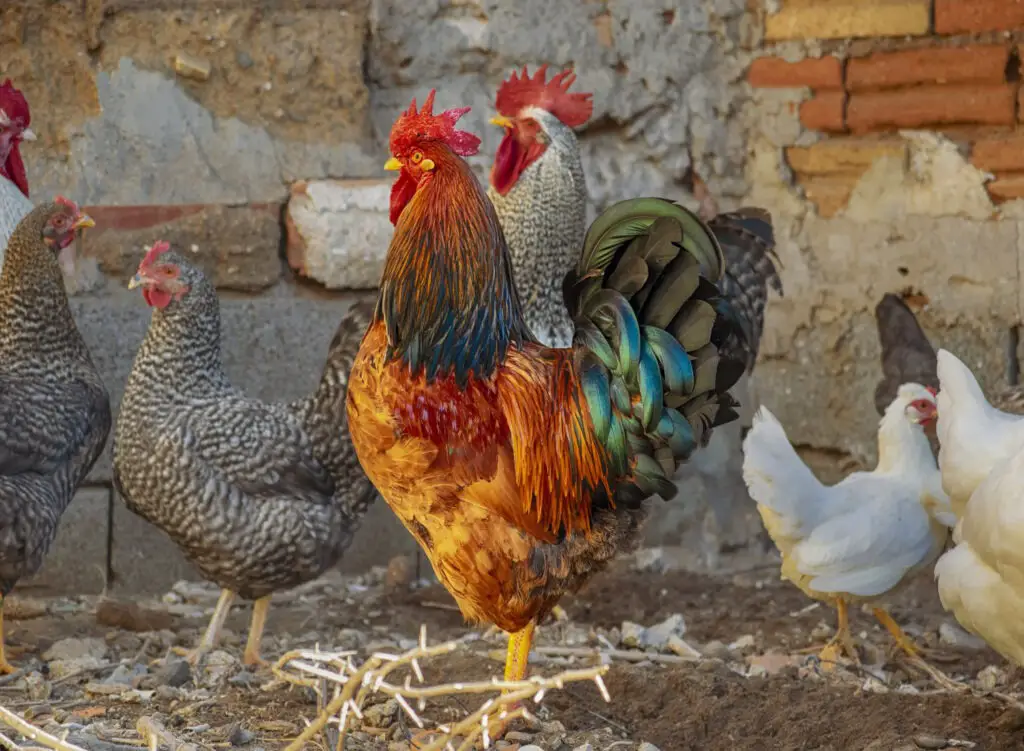
Before discovering how to prepare a solid business plan for poultry farming, there are some nitty-gritty details you need to understand about the poultry business and business generally.
Hence, let’s discover what these are.
First, you need to understand what your business idea is all about.
So, what is poultry farming? Poultry farming involves raising domestic birds such as chickens, turkeys, ducks, and the rest for commercial or subsistence purposes. Poultry farming becomes a business when you raise these birds for commercial purposes.
Since you’re thinking of creating a business plan, it’s clear that you’re raising the birds for commercial purposes.
It’s no news that poultry farming is one of Nigeria’s most lucrative and evergreen business ideas. This is due to its large and ever-growing market size because many poultry products (meat and eggs) are consumed by thousands of Nigeria, with Nigeria being one of the largest producers of eggs (poultry products) in the whole of Africa.
No doubt you can successfully run a poultry farming business in Nigeria and make profits as long as you go about it the right way.
Secondly, you need to do proper research on your business idea .
Before you set out to start any business, you need to do some research about the business. It’s not enough to have a business idea. You also need to validate that business idea if you want to stand a better chance of succeeding in that business.
Hence, for your poultry farming business idea, what are the possibilities of the business succeeding in Nigeria? Can you say that the business idea is viable?
To discover all these details about your business idea, you need to do a feasibility study of your business idea.
Feasibility studies is all about determining the viability or profitability of a business. It involves carrying out in-depth research and analysis into all aspects of the business industry you intend to start. Both feasibility studies and business plans are essential for the success of your poultry business.
Furthermore, after carrying out a feasibility study of your poultry farming business idea and establishing that it’s a profitable venture, only then can you proceed to write a business plan.
Here are some of the reasons why you should carry out a feasibility study for your business;
- It’s necessary for understanding all aspects of the business, such as the financial, physical, technical, and human resources requirements for your business.
- It would help you identify potential risks and challenges associated with your business venture.
- Feasibility studies will help you decide if a business is worth your efforts after considering some of the factors above and more.
- It would help you to determine your business goals and objectives.
- Overall, a feasibility study will help you come up with a solid plan for your business.
Now that you know some of the reasons you should do a feasibility study for your poultry farm business in Nigeria go ahead and do one for your business.
After in-depth research into the poultry farming business industry, here’s a breakdown of the essential elements your feasibility study should include;
- An Executive summary of the business : this is a brief description of every aspect of the business.
- Technological requirements and considerations : This should explain the business’s technological needs, if you have and if not, how you plan to get it, and the costs involved.
- Insights on the Market place for the business
- Marketing strategies
- Required human resources for the business
- Expected timelines for business operations and activities
- Capital or financial requirements
- Overall findings, verdict, recommendations, and plans of action
Another thing you need to consider before writing a business plan for your poultry farming business is to decide your focus area.
The poultry farming business industry is large. It involves a lot from rearing poultry birds to egg production, feed production, and more. Hence, you need to be specific about what your business focus area will be. That is if you’ll be focusing on one or all aspects of the business.
If you’re focusing on all aspects of the business, you also need to decide what you’ll be starting with and at what stage you’ll implement the other aspects of the business.
Similarly, if your focus will be on the rearing of poultry birds, for example, chickens, you need to decide what bread of birds you’ll be rearing. There are different breeds of birds such as broilers, layers, etc.
Each breed has its advantages, downsides, and maintenance cost. Hence, based on what your research reveals and what you want for your business, decide which will be best for you.
Lastly, other factors you need to consider before writing your poultry farm business plan include;
- Poultry farm business location (Urban or rural area)
- Capital sources: Personal funding, SME, loans, grants, or investors funding
- Sole proprietorship or Partnerships
Overall, these are vital factors that can help you decide what you want for your business; hence the need for you to consider them before starting your poultry farming business plan.
After observing the following steps above, you’re now ready to craft a business plan for your poultry farming business idea.
Now, let’s discover the necessary steps to writing a good business plan.

First, what is a business plan?
A business plan is a blueprint for how you intend to run your business. It covers many aspects such as business goals, vision, and mission statement, guiding principles, target market analysis, business operation analysis, marketing strategies, etc.
It contains everything about the business, from the conception of the business idea to your plan of action, and the execution of those plans. There are two reasons why you would write a business plan. The first reason is what we’ve discussed above.
The other reason is to secure investment funding. In this case, your business plan will not just serve as a blueprint specifying how you want to run the business. Rather, it also has to convince potential investors that your business will be worth their investments.
Hence, your business plan for poultry farming has to be backed by facts, data, and statistics that prove the profitability of the business.
Given this, here’s what an ideal business plan should look like.
Components of the Business Plan For Poultry Farming in Nigeria
- Executive summary : An overall summary of the entire business plan. This is the first page of your business plan. It is usually written last after every aspect of the business has been covered in the business plan. However, some people chose to write it first. Choose whichever way works for you best.
- Business Mission Statement : This covers the specific goals you want to achieve with your poultry farming business. The mission statement should be tailored towards solving an existing problem in the poultry farming industry and how your business will be the answer to that problem by meeting your target customers’ specific needs.
- Business Vision : This covers the kind of poultry farm business and working environment you aim to establish and the beliefs that gave birth to that vision.
- Objectives of the business : This is what you aim to achieve in the business on a short and long-term basis.
- Core Values & Guiding Principles: These are the beliefs and ethics that will guide all business activities and relationships with your customers.
- Keys to success/Business strategies: These are specific activities and strategies that would be implemented to ensure the business’ success.
- Products and services description: This should describe the products and services you’ll be offering once the business is established.
- Cost of Operation/Financing: This covers the cost of running the business and how you plan to get the required financing. It should also cover investors’ equity if you’re seeking investment funding.
- Company Location/Facilities and Equipment: Here, you’ll state where the business will be located as well as the required facilities and equipment.
- Potential risks and Mitigation Strategies: This should cover potential risks associated with the business and your strategies for mitigating those risks.
- Target Market Analysis: This will contain details on the size of your target market, their buying power, and their demographic details.
- Sales and Marketing Strategies and Implementation process: This section should capture how you intend to make sales in the business through proven and tested marketing strategies.
- Management, staffing, and operations/Chain of leadership: This should capture details about the workforce of the business as well as the order of management or chain of command.
- Conclusion: A recap of everything captured in the business plan.
Conclusion on The Business Plan For Poultry Farming in Nigeria
On a final note, it’s important to state that a business plan is different from a business proposal as many people tend to confuse these two documents to mean the same thing. While a business plan is a detailed document describing a business and its strategic plans for operating a business proposal is written solely for sales purposes.
A business proposal is a document describing the unique products and services of a business to a potential client convincing the client how the business’s products and services will add value to them.
An example of this is a document written to a restaurant owner, telling him or her of the quality of your poultry products and how you’re offering them at a reasonable price range.
Now you have the necessary information you need to draft a solid business plan for your poultry farming business in Nigeria. Good luck to you as you start your poultry farm business .
[…] A poultry farm business plan is a detailed document containing information on how you intend to run the business. […]
[…] can write your business plan yourself or pay a professional to do the job for […]
Hello! Would you mind if I share your blog with my myspace group? There’s a lot of people that I think would really enjoy your content. Please let me know. Thank you
LEAVE A REPLY Cancel reply
- Privacy Policy
- Terms And Conditions
Privacy Overview
WhatsApp Us
Resources for Students and Project Managers
Poultry Farming (Broilers & Layers)
Poultry Farming
POULTRY FARMING Business Plan
1.1 Introduction The laying unit is a section in the poultry enterprise. The major product of this section is the egg. Income comes to the farmer through the sales of eggs, spent birds and manure. Since egg is the focal point of this unit, it is important to understand the importance of the egg which include: i. Source of protein ii. Its shell is a good source of calcium iii. Used in confectionaries iv. Atheistic value – colouring and designing of egg shells for decoration. For the sake of food security, man is poised to utilize all available food to keep life-cycle. Egg is readily available and cheaper. Thus making it a quick demand for food and egg has a complete balanced diet.

==>CLICK HERE TO CHAT US ON WHATSAPP FOR BUSINESS PLANS & GET A DISCOUNT<==
1.2 Marketing Demand and supply determine the market trend of egg. In Nigeria egg is highly consumed. In most cases, supply does not meet up with demand; therefore egg business is a lucrative one.
1.3 Challenges in Business • Finance • Distribution • Feed/Photo-period • Diseases • Health Implication • Land. Finance Poultry business is capital intensive and production of layers is more expensive than of Broilers.
Breakages These could result from the birds pecking on the eggs, mal-handling or falls from the egg troughs.
Distribution Getting the egg to its final destination is paramount. So whileconsidering the vans to use the road network should not be left out.
Feed/Photo-Period The performances of all poultry depend much on quality feed aside other parameters. In the laying unit, while feed is important the photo-period is also more important than in any other unit in the poultry production. This is because the light helps in egg formation.
Diseases Just like other stock, layers are prone to diseases but vaccines and medications have been improved to deal with them.
Health Implication Health sector says that egg has high cholesterol level which affects man’s heart: thus it is said that children need more eggs than adults. Two eggs a day for children and an egg a day for adults would keep our body functioning well.
Land This is the most challenging factor in Agriculture. High cost of land and fragmentation of land are big challenges, if these are solved, half of the problems of Agriculture is solved.
CHAPTER TWO 2.1. THE LAND It is a free gift of nature but it is scarce. All things being equal, the land for this project is readily available. It is located at Ayepe Town in Ikenna Local Government Area of Ogun State, Nigeria.
2.2 Land Capacity Is Fifteen (25) Acres (About 37.5 Plots of Land) The numbers of birds are thirty-thousand layers and parts of the land should be used for construction purposes and other parts for expansion and integration.
2.3. Reasons For Its Location This land is nearer to major markets in Lagos, Ogun and Oyo States. Its outlays and fertility are good for poultry production.
2.4 Buildings On The Land Buildings are required in the poultry ventures thus the major buildings that this farm would need are: i. Brooding house ii. Rearing house iii. Laying pen/house iv. Inventory v. Office vi. Store vii. Feed-mill-at 30,000, bird capacity a working feed should be proposed and constructed.
BROODING HOUSE
Brooder refers to any equipment used in taking care of the chicks from 0-6 weeks. It is a complete unit consisting of hovers, drinkers, feeders and a surrounding or guard. Brooders are of various designs. Nature of heat determines the type of brooder. Since this farm should use – electric bulbs, floor brooders should be used. Other brooders are battery cages and tier brooders. This brooding house should be constructed with asbestos sheet and the roofing should be dropping so that while there would be controlled air movement, rain drops would not get in.
Rearing House This unit houses birds of 7 weeks to point of lay. The roof also drops but would be higher than that of the brooding house because they would not need much heat as the brooding chicks and rain drops will not enter it. Feeders and drinkers here are bigger than those of the brooding.
This houses the point of lay till they are spent. The major equipment here is the cage which consists of the drinker/water, feeder and cells.
INVENTORY Implements and other equipment are packed here. It is a store for mechanicals and electrical parts.
OFFICE This is said to be the administration of the farm.
STORE The eggs and bags of feed are preserved in the store pending their shipment/distribution.
FEED-MILL It should have 3 components – Hammer mill, Vertical mixer and Scale/Pelletizer. It would undertake bagging and distributions.
NB: All pens in the farm should be constructed in North-South pattern to check the directions of travels of natural elements such as sun, wind and rain. The farm should be fenced for security and privacy. Ventilation i.e. air flow is an important factor in housing therefore the ideal building is the open sides which would aid cross-ventilation. The design of the houses should bear on mind the climatic condition of location.
CHAPTER THREE METHODOLOGY
3.1. The brooding house of 199,220. 85ft2 should hold the 30,000 chicks in deep litter. The house should be divided into 12 cells to hold 2,500 chicks each. This is for more effective husbandmanship.
3.2. The rearing units should be 2 pens of 15,000 birds each. Both houses should have the dimension of 38,441.7ft2
3.3 The laying units should be 5 pens of 6,000 birds per pen in 3 rows and each row should hold 2,000 birds in cages. The dimension should be 3,000ft2 per pen and total of 15,000ft2.
The reason for the larger dimensions in the brooding and rearing pens is because of the feeders, drivers and movement areas for the birds on the deep litter system. The cages come with water and feed troughs. These pens should be on a land dimension of about 883,924.95ft2.
3.4.The Stockings and Section Capacity i. Brooding House 0.64ft2/chick For 30,000 chicks = 19220ft2.65 At 4ft2 away from adjacent borders (i) = 8 x 138.6ft2 = 1108.8ft2 (ii) = 8 x 142.6ft2 = 1140.8ft2 (iii) = 8 x 142.6ft2 = 1140.8ft2 Total brooding house and surrounding = 21,469.6ft2
ii. Rearing Unit: The total area should be twice the brooding stocked area = 19220 x 2 = 38,440ft2. This because their body weight and size would have increased. iii. Laying Pens:Stocking at 0.5ft2/bird each pen of 6,000 birds in capes would occupy 0.5ft2x6,000 birds = 3,000ft2 At 4ftbetween rows for work/walk ways = 8ft2 x 54.77ft2 = 8ft2x 55ft2 = 440ft2 At 4ft distance4 from pen foundation = i 8ft x 55ft = 440ft2 ii 8ft x 63ft = 504ft2 = 4,384ft2 /pen For 5 pens = 4,384ft x 5 = 2,1920ft2 At 10ft space between pens and Adjacent borders i = 60ft x 64ft = 3,840ft ii = 20ft x 73ft = 14,600ft2 Sub-total = 5,300ft2 Total land for laying unit = 27,220ft2 Therefore, the total land required for 30,000 layers = 21,469.6ft2 + 38,440ft2 +27,220ft2 = 87,129.6 ft2
3.5. Land Required By Outer Structures On The Farm A plot of the land should be ear-marked for the feed-mill (1/2a plot) and the remainder should be used for office and stores at personal desires.
3.5 iiThe water source should be sited at a portion of good water level accessible to the pens. The water must be chlorine free.
3.5. iii The plant/engine room can take a portion of 10ft x 10ft made of bricks (blocks) with allowances for escapes of burnt gases. It should be far from the pen because of noise stress and gaseous pollutions. 3.6. Good Road and Path Layouts should be well maintained.
CHAPTER FOUR SECTION MANAGEMENT The level of farm management is one of the determinants in poultry production. Therefore management practices in the laying enterprise are as follows: 4.1. Brooding: This is where the chicks would be given artificial warmthto grow feathers and other developments. There are some parameters to consider before venturing into poultry production and if well planned out, the business would yield bountifully.
4.2. Litter Maintenance
Since the chicks would be kept under intensive care; litter of wood shavings is desirable. The litter keeps the chicks clean and warm. It is a source of manure at later point in time. So, the litter must always be kept dried – if litter is wet it breeds vectors which introduce diseases to the chicks e.g. coccidiosis.
The litter absorbs moisture from the dropping and this in turn is eliminated by ventilation. Wet litter should be immediately removed. Therefore, a good litter should be highly absorbent, fairly coarse, free from mould and contains minimum amount of dirts.
Proper ventilation lower humidity and keeps litter dry and friable all time. The litter depth should be at minimum 5cm. The covered house is then fumigated and allowed for 2 – 3 weeks. The covering should be removed and allowed for 3-5 days, fill the pen with litter, cover and pre-heat the house for another 2 -3 days. These would kill all disease causing organisms and bring about suitable heat for chicks.
4.3. Where to Buy
Chicks should not be bought from the open market. Known hatcheries with good history should be the place to buy from – such hatcheries include Chi Ltd, Zartech Ltd, Obasanjo Farms Nig. Agrited etc.
4.4 Arrival Of The Chicks
Brooding equipment should be arranged in the prepared house about 12 hours before their arrival. Feed and drinking water should be introduced 2-3 hours before arrival. The house temperature should be about 35OC. The covered house should prevent forced drought and the chicks should have a good ventilation at the same time.
4.5. Brooding: This is the care given to theday old chicks from day old till about 6 weeks of age. The attendant should observe them many times a day from a day old to about 5 days old. Fresh and balanced feed should be served, clean and chlorine free water given. They should be fed with chick’s mash twice a day at average of 2kg/chick for the 1st 8 weeks or about 6g/chick daily.
4.5ii. The attendant should observe the chicks’ behaviour to know how to regulate the heat. If they cuddle closer to the heat source that means that the heat is not sufficient. If they are further away from each other and heat source that means that the heat is at excess. At adequate heat, they would be evenly distributed. When chicks are feeling hot or cold they would not eat well!
He should see that none is restrained from movement by being trapped between wood or troughs. He should look out for blood vents and separate into a care unit. This bloody vent can lead to cannibalism in that other chicks would peck the vent and could draw out theaffected chicks’ intestines – leading to death. After the 1st week, two times a day routine check is advised-change to bigger feeders and drinkers at week 2.
4.5iii Adequate Heat in the House
• It increases immune system • Builds essential hormones • Aids several maturity for later egg production. • Speeds up the growth of feathers.
As they grow the heat is gradually reduced till at 6th week when heat is completely removed according to region/season of the year. The coverings are gradually removed from week 3 through to week 6 when room temperature would have been achieved and the chicks feathered.
4.5 iv. Medication/Vaccination Schedule in the Brooding House Age Medication/Vaccination 0 – 3 days Marek’s vaccination 5 – 7 days New castle disease vaccine i/o 0 – 7 days Give antibiotic, vitamins in feed/water 11th – 14 day 1stGumboro diseases vaccine. 21st day 2nd Gumboro disease vaccine 5th week New castle disease (lasota) After 3 weeks Give fowl pox vaccination (wing web) 6th week New castle disease (Komorou)

Related posts:
- Tilapia Farming
- Snail Farming (Heliciculture)
- Palm / Kernel Oil Production
By BPN Staff
Leave a reply cancel reply.
Your email address will not be published. Required fields are marked *
This site uses Akismet to reduce spam. Learn how your comment data is processed .
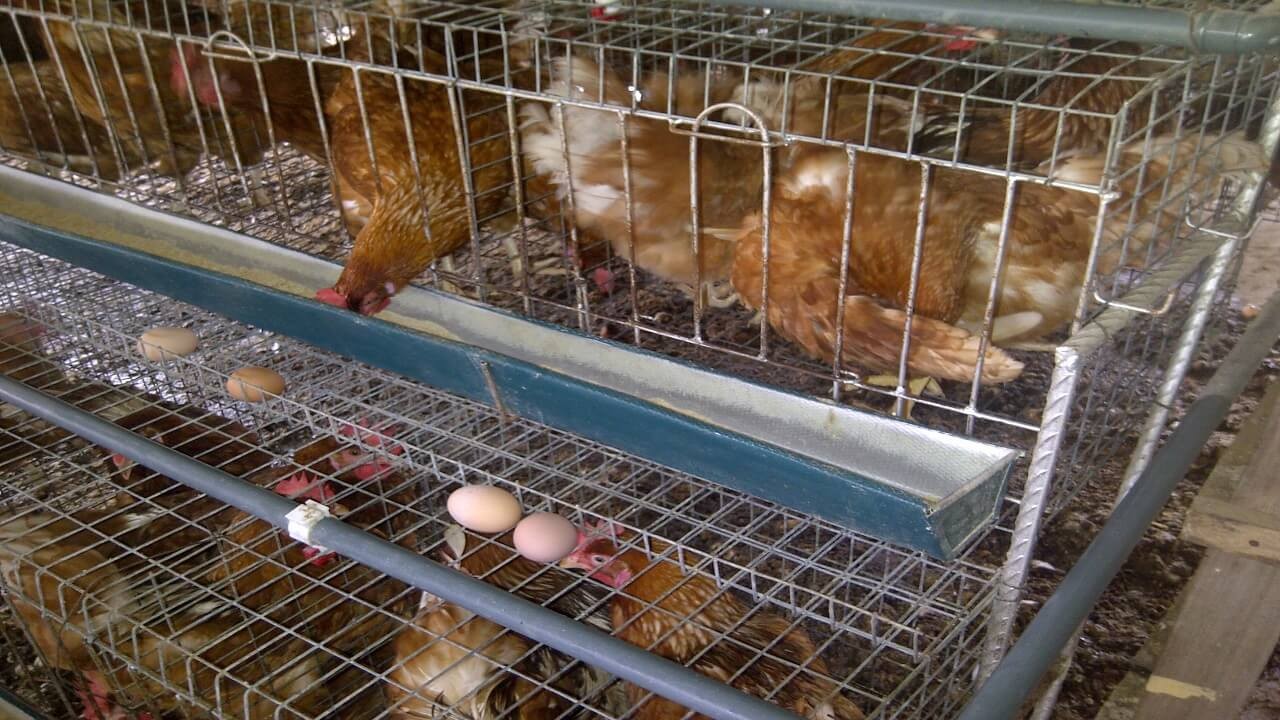
Profitability of Poultry Farming in Nigeria
January 5, 2024, 7:42 pm.
Are you thinking of going into poultry farming in Nigeria? I’m sure you’ve heard a lot about the profitability of poultry farming in Nigeria and how it is capable of employing millions of people, boost sustainable food production , growing GDP and making you millions of Naira.
Well, as someone who has a first-hand experience of living on and working in a poultry farm, I want to analyze the profitability of poultry farming in Nigeria. If you want to go into the poultry farming business in Nigeria, you need to be aware of the cost and profit potentials.
Poultry Farming in Nigeria
Poultry farming in Nigeria is one of the most advanced animal farming businesses in Nigeria . On closer inspection of national food expenditure in Nigeria, it can be observed that poultry and poultry-related food items has a total expenditure of over N800 billion annually, which amounts to over 2% of total food expenditure in Nigeria. This huge market and demand for poultry makes it a good agribusiness to invest in.
I’ll be using four parameters to analyze the profitability of poultry farming in Nigeria. These parameters are:
- Startup capital
- Operation & Maintenance (O&M)
- Market
- Profitability
In order to do a fair and thorough analysis, I’ll be analyzing the profitability of poultry farming in Nigeria from the standpoint of someone who’s about going into poultry farming in Nigeria with 500 birds (layers).
STARTUP CAPITAL
I’ll be making an assumption that there’s an available land already. I won’t be factoring in the cost of getting a land.
Poultry Farming in Nigeria startup costs:
- 500 birds (point-of-lay layers): N1,250,000
- 5 cages (100 birds-per-cage) to house the 500 birds: N650,000
- Cage house or pen construction: N1,500,000
- 18-months’ worth of feeding (using packaged feeds): N11,880,000
Total startup capital for 500 birds (layers): N15, 280, 000
OPERATION & MAINTENANCE (O&M)
Poultry farming requires a very high level of O&M because the quality of their production depends on how well you manage them. You have to feed them 2 to 3 times a day and maintain good sanitation . You have to make sure you give them quality water to drink. And from time to time, they’ll be visited by a veterinary doctor who will administer drugs and injections to them in order to keep them healthy. Failure to do this will expose your birds to all manner of diseases and flus . I still remember, like it was yesterday, how the chickens in our farm were dying in their dozens due to the bird flu outbreak of 2006.

Also, you’ll need to hire one farm labour to help you with the O&M. Hire someone who lives close to your farm so that you won’t have to pay him or her too much. The current wages of a farm labour for poultry farming in Nigeria is between N20, 000 to N30, 000 a month.
MARKET
There’s a very good market for poultry products . Eggs have many health benefits and are always in demand from both individuals and companies. Companies such as bakeries, restaurants, hotels etc. use eggs for making scotch eggs, cakes etc. While individuals love using eggs to eat bread , yam and to bake as well. The good thing about poultry (layers) is that after they’ve spent 18 months laying eggs for you, you can sell them off at a higher price than you bought them. If you can time the sales of your old layers (that’s what they call layers that have reached the end of their laying cycle) to coincide with a festive period like Christmas or Easter, people will fight among themselves just to buy your chickens!
The excretion of poultry can also be bagged as organic manure and sold to vegetable farmers as well. There’s a very good market , all-year-round, for everything that your poultry farm produces. Selling any of your products will never be a problem. Poultry farming in Nigeria is a business with a very strong cash flow
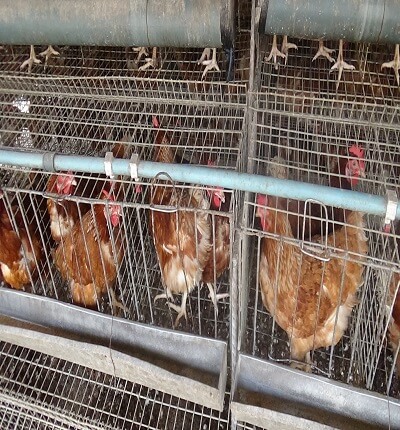
PROFITABILITY
I’ll exclude the O&M costs from these calculations because the variables can’t be accurately forecasted generally. They are specific to each person’s situation.
Your birds, if well raised and managed, have the capacity to produce 8,670 crates of eggs for you over an 18 month period i.e. 17 crates a day from the 2nd month to the 18th month. You can conveniently sell one crate of egg for N2,,000. So, for 18 months, eggs alone will generate N17, 340,000 (8, 670 X N2000) for you. At the end of their production cycle, assuming you have a death rate or mortality rate of 5% (this means 5% of your 500 birds, 25 birds, die during their production cycle) you should have about 475 birds left in your farm after 18 months.
Depending on what time of the year you choose to sell them. You can process the birds and sell them (prices of chicken are highest during festive periods like Christmas and Easter) for N3, 500 per chicken. So your 475 birds can generate N1,662, 500 (475 X N3, 500) for you.
From egg and bird sales alone over an 18 month period, you will generate a total sale of N19, 002,500. There’s also money to be made from selling their excretion as manure but the cash generated from this is insignificant compared to the eggs and chicken sales. This is an aspect of poultry farming in Nigeria whose potential isn’t being properly harnessed.
With an invested capital of N15, 280, 000 and total sales of N19, 002,500, your gross profit margin is 24.36%.
Note that most of the things you spent your money on like the cages and poultry pen to house the cages are fixed assets in nature. You will be able to use them for future layer productions and you don’t have to recover their cost in one production. In poultry farming, the tanks and most of the structure you put in place are fixed assets in nature and their costs would be recovered over several productions. As for the feeding, you don't have to provide the money for feeding all at once. You can be generating the feeding expenses monthly from egg sales . Personally, I love the positive cash flow aspect of poultry farming in Nigeria because you get to make sales on a daily and weekly basis.
Going by these four parameters that I’ve used to analyze the profitabilty of poultry farming in Nigeria, poultry farming in Nigeria has an overall rating of B. Poultry farming is a good business to go into and it has unique strong points and weak points.
The trick in poultry farming is to know the techniques and practices that will reduce mortality (or death rate) and boost growth and production. You should also maintain good records of treatment, egg production etc.
The analysis above is not 'cast in stone' or fixed. It's meant to give you a general overview of cost implications. You can decide to do away with some items in order to reduce cost and boost profitablity. For example, you can decide not to use cages and you can opt to manufacutre your own feeds instead of buying already manufactured feeds. If you want to manufacture your own feeds, you should consider maize farming too because maize is a very critical ingredient of poultry feed.

Also, not using cages means your eggs would be laid on the floor making it susceptible to being broken and becoming very dirty. You should also factor insurance to help cover losses from unexpected disease outbreaks.
Poultry Farming Business Plan and Training
I hope this analysis helps you to make the decision to start your poultry farming business. There are other things you need to put in place before starting a poultry farming business in Nigeria but the ones highlighted above are the basics.
If you need a professional and comprehensive business plan to guide you and help you raise money to start and grow your poultry farming business, you can get one from us.
Our poultry farming business plan and online poultry farming training will show how to start a poultry farm with 2,000 birds and grow it to over 5,000 birds. It will show you all the materials you need to get, how to reduce death rate on your farm (medication and vaccination plan guide), the best way to build your poultry house so that they lay more eggs , what you should feed your birds so as to reduce feeding costs, expected profits, balance sheet and cash flow for 5 year's of operation and so much more! Please see a screenshot of our poultry farming business plan below:
For a payment of N30,000 we will send you our professional poultry farming business plan containing the latest and current prices needed for starting a poultry farming business (layers and broilers) and also give you one month access to our online poultry farming training course. You can see a sample of one of our poultry training video classes below:
Our professional poultry farming business plan also comes with architectural and structural drawings and design for building a modern poultry farming pen that can house 2,000 birds.
With our standard poultry farming business plan you can raise money to start and grow your poultry farming business from banks, investors, donor agencies etc.
To learn more about how to get our poultry farming business plan and online training, please call or chat with us on +2348089864121 or send a mail to [email protected]
And if you are interested in a 2-weeks practical and physical training on our layers poultry farm, you can also call or chat with us on +2348089864121 or send a mail to [email protected] to get training dates and cost.
[ Ed. Note : This article was reviewed on January 5, 2024]
SSL Certificates
Share This Article:
Videos You May Like

Coconut Processing (Step 2): Grating
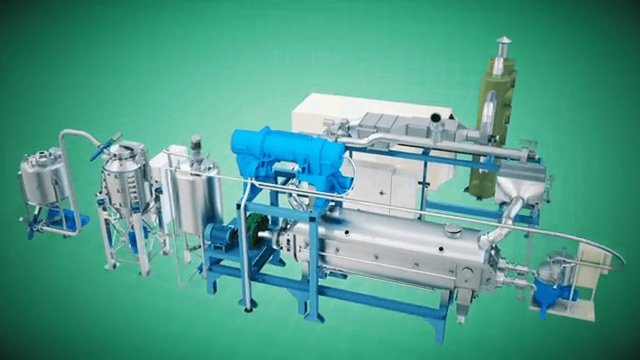
Animal Waste Treatment Systems

Snail Specie
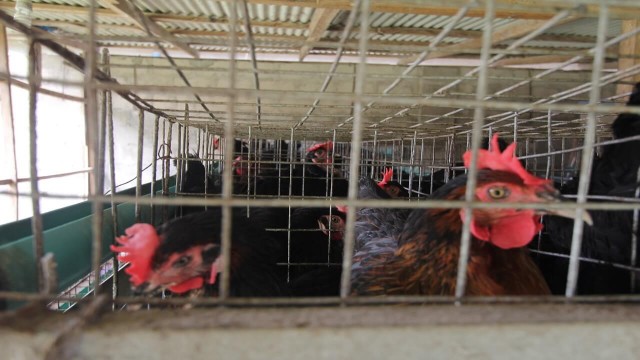
Poultry Health 1
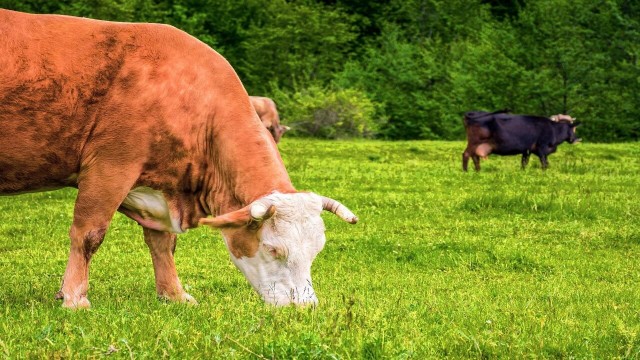
Cattle, Goat and Sheep Health (part 2)
Posts you may like.
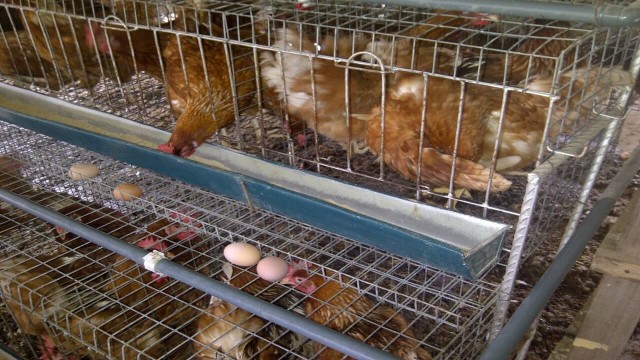
January 5th, 2024
in Poultry Farming

An Intro to Hydroponics: 9 Benefits Of Growing Without Soil
July 29th, 2016
in Greenhouse Farming

8 Ways to Quit Your Job To Pursue Your Entrepreneurial Dream
June 26th, 2017
in Entrepreneurship

Greenhouse Disease Management
October 2nd, 2023

Japanese Quail Farming
April 9th, 2023

How to Invest in Vertical Farming
September 9th, 2021
in Finance & Investing
Online Agribusiness Training Portal
Follow us on:.
- International 2 Open submenu
- Health & Wellbeing
- Life & Style
- Rest of the World
Obaseki to Launch Edo Water Transportation System Next Month

•Distributes inputs to 1,734 farmers for 2024 planting season
The Edo State Governor, Mr. Godwin Obaseki, has said his government has commenced the construction of water stops in various riverine communities across the State with the plan to launch the State’s water transportation system next month.
Obaseki disclosed this while addressing stakeholders during an interactive engagement on the Edo State Regional Development and Benin City Master Plans, at Ovia-South-West Secretariat in Iguobazuwa.
The governor, who noted that the transportation system was a critical aspect of the State’s master plans, said it will kick off with three passenger boats in the Riverine Community.
Present at the meeting were: The Secretary to Edo State Government, Osarodion Ogie, serving Commissioners, Permanent Secretaries, market women, youths, religious and traditional leaders, National Union of Road Transport Workers (NURTW) and the Hausa Community, amongst others.
During the engagement, stakeholders from Ovia South-West and Ovia North-East interacted with the governor and officials from the Ministry of Physical, Urban and Regional Development to ensure their interests were captured in the master plan.
He said: “Water transportation is the cheapest form of transportation as we are working on how to make the state key into it. We are starting Edo State Water Transportation next month. We are starting with three passenger boats in the riverine communities. We are building water stops in various communities around the riverine communities in the State.”
On the State’s Regional Development and Benin City Master Plans, Obaseki said: “The plan I met expired, hence the need for another plan. A master plan is not forever; it’s for sometime. I want to leave a plan for the State that will guide other successive administrations to continue the development plan.
“Today, we have developed our master plan that will guide every area of life. We are here to hear from you and have your input on the plan. Before I leave office, we will take it to the Edo State House of Assembly (EDHA) to ensure it’s signed into law.”
Earlier in his welcome, Commissioner for Roads and Bridges, Ethan Uzamere said: “Planning is very important as it is vital for development and Governor Obaseki with this plan has left a long-term plan that other administrations follow. Planning is important for real development.”
On her part, the Commissioner for Physical, Urban and Regional Development, Isoken Omo said the master plan which is a 30-year development plan for the State, has been broken down into five years to create opportunity for reassessment on its implementation.
Meanwhile, the Edo State Government has commenced the distribution of farm inputs and processing equipment to smallholder farmers across the seven local government areas in Edo South Senatorial District for the 2024 planting season.
The distribution was carried out through the State FADAMA CARES Programme and Federal Government Livelihood Improvement Family Enterprises, Niger Delta (LIFE – ND) project.
Flagging off the distribution exercise, the Commissioner for Agriculture and Food Security, Stephen Idehenre who was represented by the Permanent Secretary of the Ministry, Peter Osagie said the gesture was part of efforts to boost food production and ensure a successful 2024 farming season in the State.
The Commissioner noted that a similar exercise had been done in Edo Central Senatorial District.
He said: “Today, as a follow-up, a total number of 1,734 beneficiaries will be receiving inputs such as juvenile catfish, day-old- chicks and poultry feeds.
“Others are fish feeds agricultural assets, de-feathering machines, cassava milling machines, rice processing machines, motorised sprayers and grinding machines, among others.”
The State Project Coordinator, IFAD LIFE-ND, John Omoruyi, said the input distribution would enhance farm productivity for improved food security and to meet the Making Edo Great Again (MEGA) Agenda of the state government.
Omoruyi noted that IFAD’s LIFE-ND project was currently running in 100 communities and in 10 local government areas of the State, adding, “We are upscaling every technology being used to be ecosystem friendly, hence the distribution of smart agricultural farming equipment and inputs to benefiting smallholder farmers.”
In his welcome address, the Programme Manager, Edo ADP and State Coordinator FADAMA CARES Programme, Dr. Edward Izevbigie, commended Obaseki, for his commitment to agriculture
Related Articles

Obaseki, Oborevwori, Ibori, Igbinedion, Others Celebrate Tom Ikimi at 80

Edo Rolls Out Gains of Obaseki’s Reforms

Edo: We Have Secured 40 New Licenses for Solid Minerals, Ready for Investors

Russian Firm, Rosatom Commences Exploration of Lithium in Edo State

Founded on January 22, 1995, THISDAY is published by THISDAY NEWSPAPERS LTD., 35 Creek Road Apapa, Lagos, Nigeria with offices in 36 states of Nigeria , the Federal Capital Territory and around the world. It is Nigeria’s most authoritative news media available on all platforms for the political, business, professional and diplomatic elite and broader middle classes while serving as the meeting point of new ideas, culture and technology for the aspirationals and millennials. The newspaper is a public trust dedicated to the pursuit of truth and reason covering a range of issues from breaking news to politics, business, the markets, the arts, sports and community to the crossroads of people and society.
Helpful Links
- Privacy Policy
- Terms & Conditions
You can email us at: [email protected] or visit our contact us page.

IMAGES
VIDEO
COMMENTS
In Nigeria, the average cost to set up a chicken farm is around N150,000. This price covers the cost of the necessary equipment, starter ingredients, and day-old baby chickens. In Nigeria, the startup expenditures for a commercial poultry farm might reach N1 million. In Nigeria, a chicken farm typically makes around N50,000 per month in profit.
Step 1: Identifying Your Niche and Target Market. Before starting a poultry farming business, it is essential to identify your niche and target market. Determine whether you want to focus on broiler production, egg production, or both. Assess the demand and competition in your chosen niche to identify potential opportunities.
To Get Your Poultry Business Plan in Nigeria pay: N10,000 to: Bank Name: First Bank Plc. Account Name: Chibuzor Tochi Onyemenam. Account Number: 3066880122. After payment, Text your full name, email address and title of business plan (i.e. business plan for poultry farming in Nigeria) to 07033378184. Today I will be giving us few tips on how to ...
Requirement: Build secure and well-ventilated poultry pens. Invest in essential equipment such as feeders, drinkers, nesting boxes, and heating lamps for chicks. Cost: Construction costs depend on the scale of your poultry farm. Budgeting ₦100,000 to ₦500,000 for initial housing and equipment is a reasonable estimate.
Set-up cost to start a poultry farming business in Nigeria. You can start a small-scale poultry farming business in Nigeria with less than N150,000. Medium to large-scale farms need a lot more money, but starting a small poultry business is advisable even if you have more than enough funds to spare. Profit for poultry farming business in Nigeria
Land is one of the primary needs you must meet when starting a poultry farm. You can either purchase land or lease one for the business. The cost of land is relative as it depends on the scale at which you want to run the farm and your location. In some parts of Nigeria, you can get farmlands for between N300,000 and N3 million per plot.
Conclusion. 1. Get Your Mindset Right: The Poultry farm business is the most profitable of all Nigeria's agricultural sub-sectors with a current market value of about N1.6 trillion approximately $4.2 billion according to both CBN and United Nations Food and Agricultural Organisation (UNFAO) report.
To start up your smalls scale poultry in Nigeria, you must secure land first. This can be a space behind your house or a different site altogether. The price of land varies in different regions and locations. A plot of land can be gotten between #600,000 to #2,000,000 in semi-urban areas.
The cost of starting a poultry farming business in Nigeria varies depending on the size of the farm and the type of poultry you are raising. However, you can expect to spend anywhere from ₦150,000 to ₦10 million. ... Business Plan: Develop a comprehensive business plan that outlines your goals, target market, estimated budget, expected ...
There are four main types of poultry farming you can consider in Nigeria: Layer breeding focuses on egg production. Layers start laying eggs between 18 to 22 weeks of age and can continue for 12-18 months. Popular breeds are Isa Brown, Bovans, and Dominant. Broiler breeding focuses on meat (chicken) production.
By offering different products like meat and eggs, you create multiple ways for your business to make money. Diverse income streams can help your business stay strong and grow over time. 2. Meeting Market Demand. Broiler production meets the high demand for chicken meat in Nigeria.
GTBank (Guaranty Trust Bank) Account Name - Okite Joseph ikenna. Account No - 0044083736. Once payment is made for the Poultry Farm Business Plan in Nigeria + Feasibility Studies PDF, send the following (i) a valid email address and (ii) your payment details to any of these numbers - 07039768549. Other Business Plan.
SETTING UP A POULTRY BUSINESS IN NIGERIA 4 Introduction 5 1.0 Overview of the Poultry Farming Industry in Nigeria 6 Getting Started 9 2.0 The Business of Poultry Farming 10 2.1 Choosing the Right Location 15 2.2 Knowing Your Target Market 15 2.3 Equipment Required for a Poultry Farming Business 18
Step 4 - Feeding and Medication OF The Poultry BIRDS. For commercial poultry production, good quality, highly nutritious food is a must. Quality and neat feeds keep the bird healthy always and very productive. The feed must be kept clean and dry always, as contaminated feed can infect poultry.
This is a sample business plan for a poultry farm based in Nigeria. The sample business name used is Nutrichic Farms. The business operates a poultry farm that breeds broiler and layer chickens, and is located in Nasarawa state. The business plan outline used is a simple business plan that follows a standard business summary template used by ...
Before venturing into poultry farming in Nigeria, consider the cost involved, acquire extensive knowledge about the business and plan well. In 2021, Babban Gona supported over 40 poultry entrepreneurs to successfully raise over 40,000-day-old chicks across 10 cycles.
Conclusion on The Business Plan For Poultry Farming in Nigeria. On a final note, it's important to state that a business plan is different from a business proposal as many people tend to confuse these two documents to mean the same thing. While a business plan is a detailed document describing a business and its strategic plans for operating ...
business plan is a document or a guide which outlines a proposed business objective. My choice of business is poultry farming. It is right to ask the question why I have chosen poultry farming. To under-stand this, it is significant to know a few backgrounds on the choice of location for the poultry farm: Nigeria.
To Place An Order for a Comprehensive Business Plan on Poultry Farming in Nigeria Pay N10, 000 To: Bank Name: Guaranty Trust Bank (GTB) Account Name: Chibuzor Tochi Onyemenam. Account Number: 0044056891. Or. Bank Name: First Bank Plc. Account Name: Chibuzor Tochi Onyemenam. Account Number: 3066880122.
Get your sample Poultry Farming Business Plan in Nigeria today. To order the business plan, pay N10, 000 to: BANK NAME: GUARANTY TRUST BANK (GTB) ACCOUNT NAME: CHIBUZOR TOCHI ONYEMENAM. ACCOUNT NUMBER: 0044056891. OR. BANK NAME: FIRST BANK PLC. ACCOUNT NAME: CHIBUZOR TOCHI ONYEMENAM.
Poultry Farming. POULTRY FARMING Business Plan. 1.1 Introduction. The laying unit is a section in the poultry enterprise. The major product of this section is the egg. Income comes to the farmer through the sales of eggs, spent birds and manure. Since egg is the focal point of this unit, it is important to understand the importance of the egg ...
The current wages of a farm labour for poultry farming in Nigeria is between N20, 000 to N30, 000 a month. MARKET. There's a very good market for poultry products. Eggs have many health benefits and are always in demand from both individuals and companies.
Founded on January 22, 1995, THISDAY is published by THISDAY NEWSPAPERS LTD., 35 Creek Road Apapa, Lagos, Nigeria with offices in 36 states of Nigeria , the Federal Capital Territory and around ...
the poultry farms in the country. Hence starting a poultry farm of your own either on a large or small scale is indeed a very wise decision as this will bring you immense financial benefit both in the short and long term. THIS IS NOT THE COMPLETE POULTRY FARMING BUSINESS PLAN IN NIGERIA TO GET THE COMPLETE BUSINESS PLAN, PAY N10, 000.00 TO:
To try to make a living and feed his family, Yahaya has a small business selling rice and other daily essentials, but farming for food in the area has been full of difficulties, partly because there is not enough land available.Increasing development has swallowed up space for crops, and a shortage of grazing land for livestock has caused (often violent) conflict with cattle herders.